A Cornered Lion: Chapter 5-The Soft Underbelly
Game: Hearts of Iron III
Published: 2019-06-14, edited: 2019-11-09
Comments thread
Part of the campaign:
A Cornered Lion
Previous part:
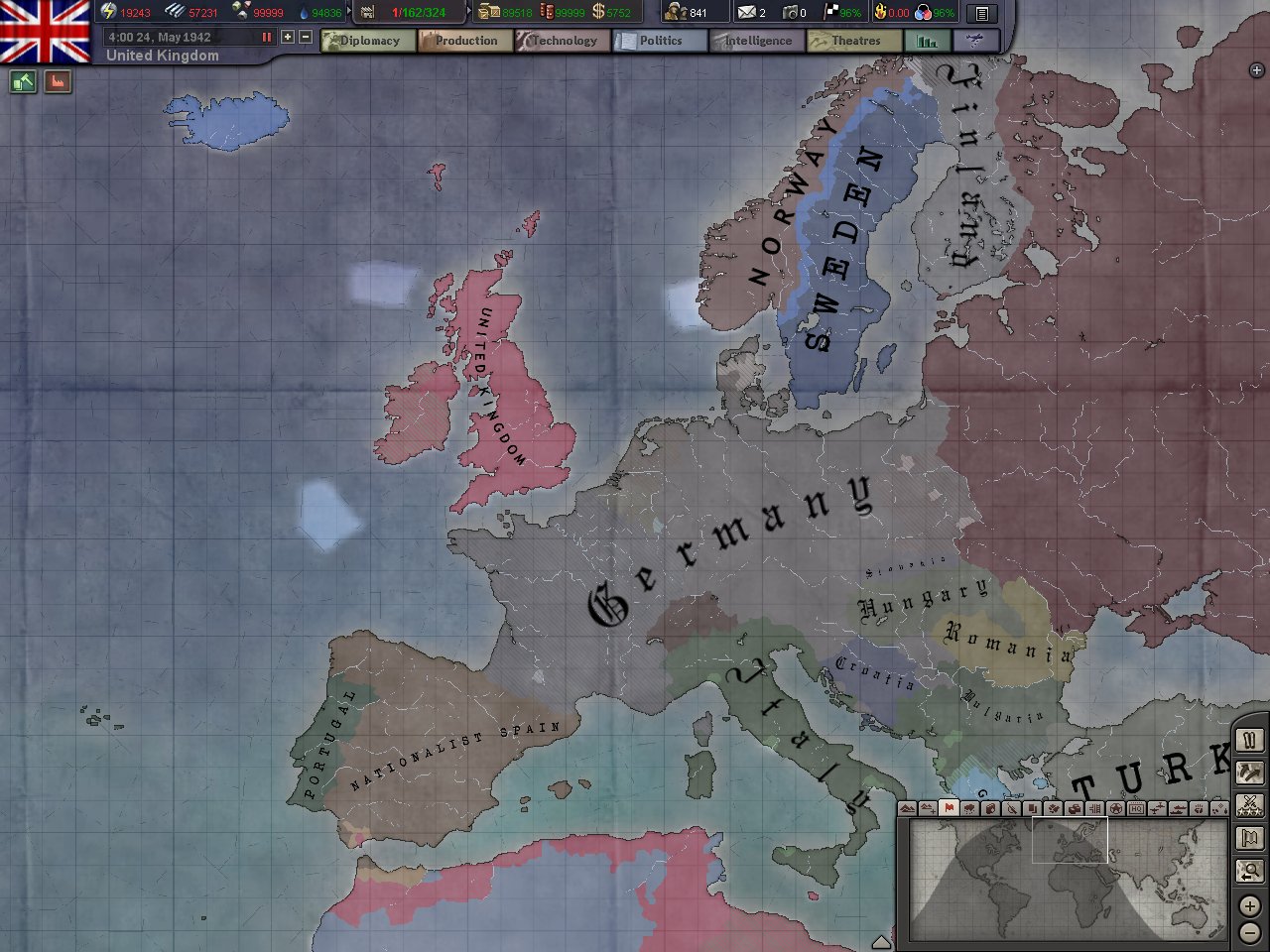
May 1942.
The situation in Europe is precarious.
Our small force in Greece is holding onto the frontier with a small toe hold. The Greek Forces there are barely able to hold their own small sections.
In North Africa, an invasion force prepares.
Our forces, still mopping up after Operation Diamond Avalanche. Are making their way to ports in Libya. The main ones that the invasion force will be using will be Benghazi and Tripoli. It will take time for troops to move into position and the materials needed for the invasion. So the inevitable assault into Sicily and Italy will have to wait for some months.
The situation in Europe is precarious.
Our small force in Greece is holding onto the frontier with a small toe hold. The Greek Forces there are barely able to hold their own small sections.
In North Africa, an invasion force prepares.
Our forces, still mopping up after Operation Diamond Avalanche. Are making their way to ports in Libya. The main ones that the invasion force will be using will be Benghazi and Tripoli. It will take time for troops to move into position and the materials needed for the invasion. So the inevitable assault into Sicily and Italy will have to wait for some months.
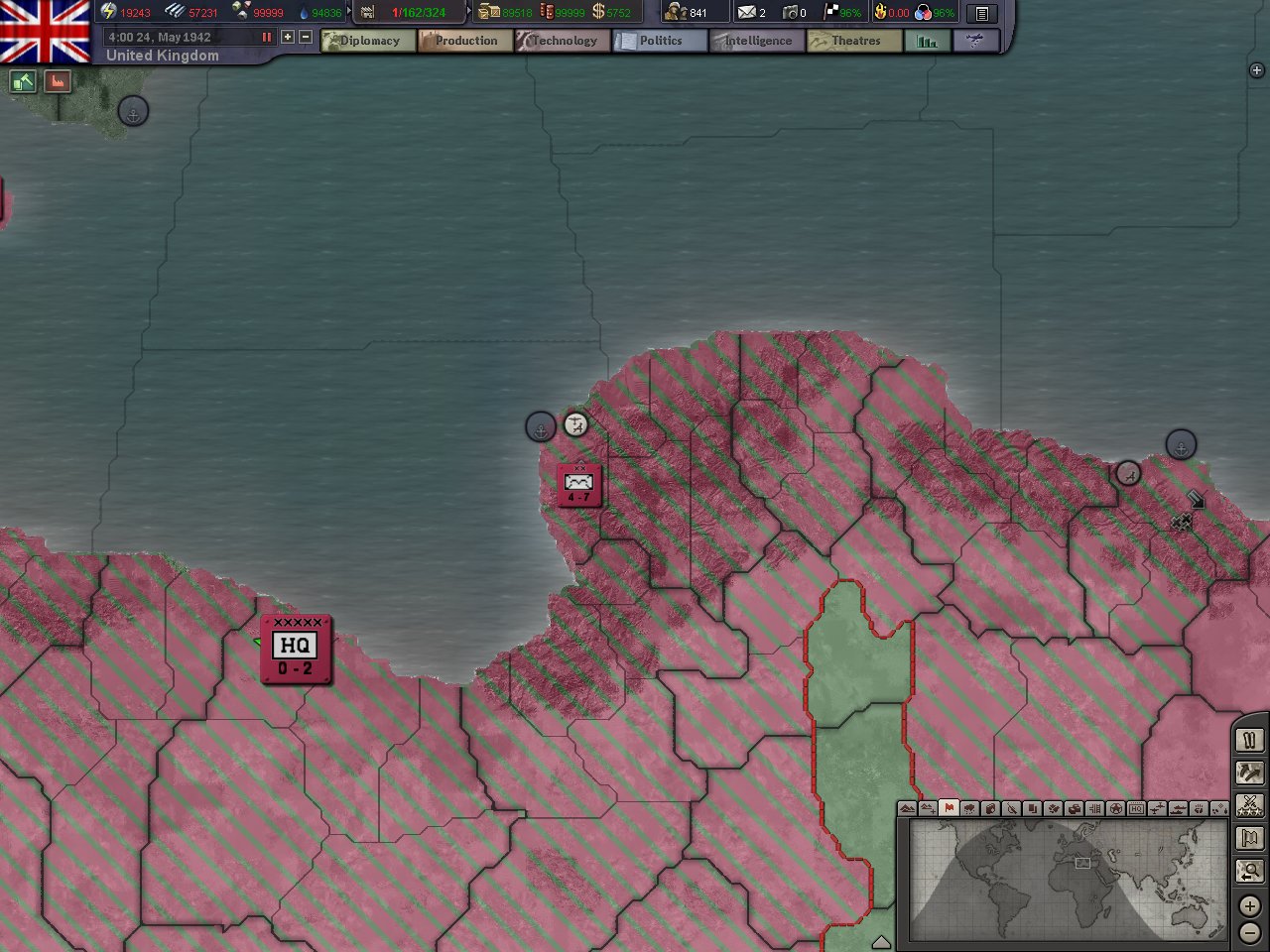
Our paratroop corp was moved into Benghazi when the invasion plans were created and since have been training for the drop into Italy.
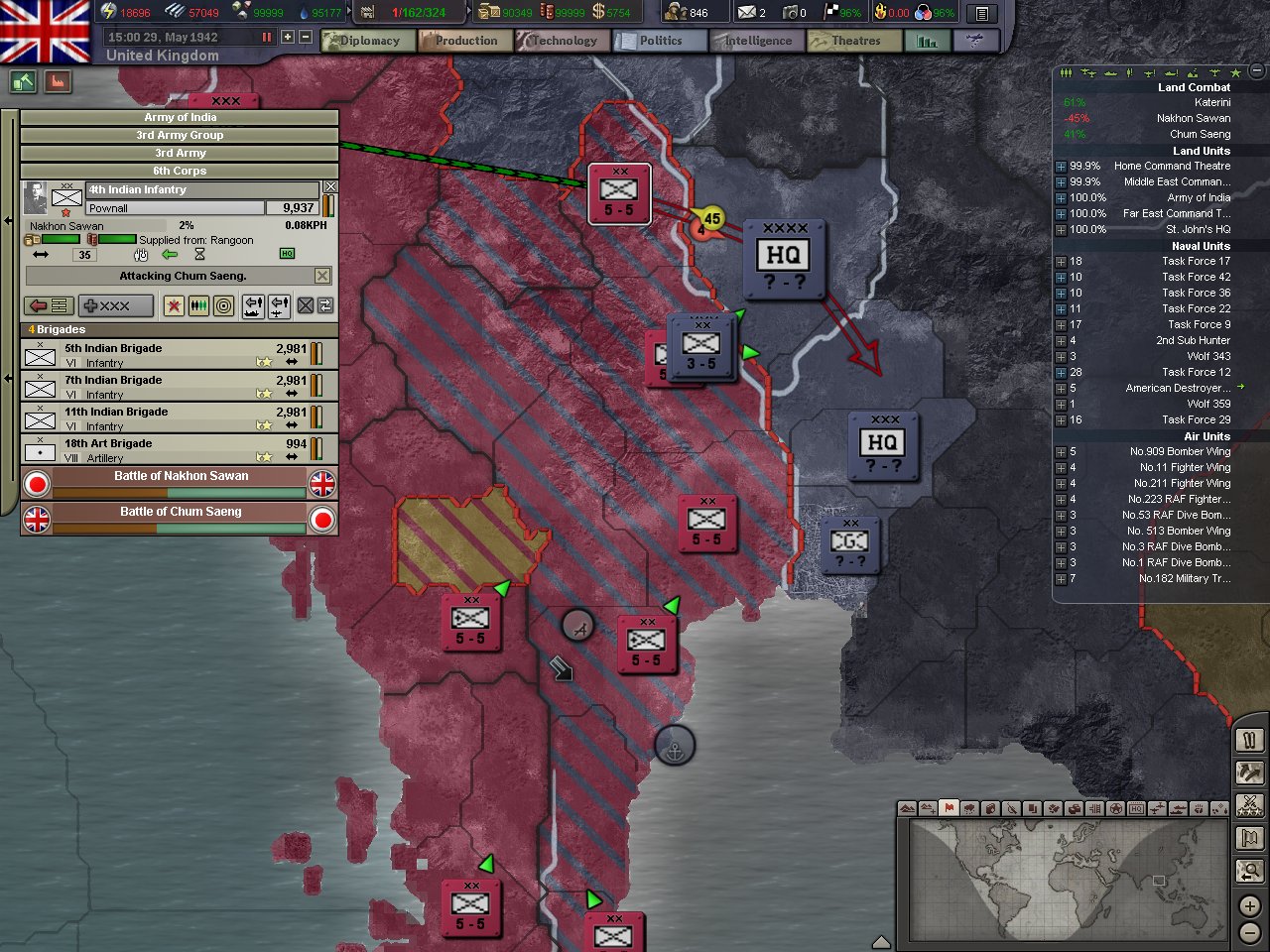
In the Far East our troops are assaulting a defensive line held by Japanese and Siamese forces. Enemy resistance is fierce but as the hours and days pass our troops make slow progress through the lines. Once our troops are across the water and around behind the Japanese forces, Bangkok will be surrounded and then assaulted, and hopefully then taken.
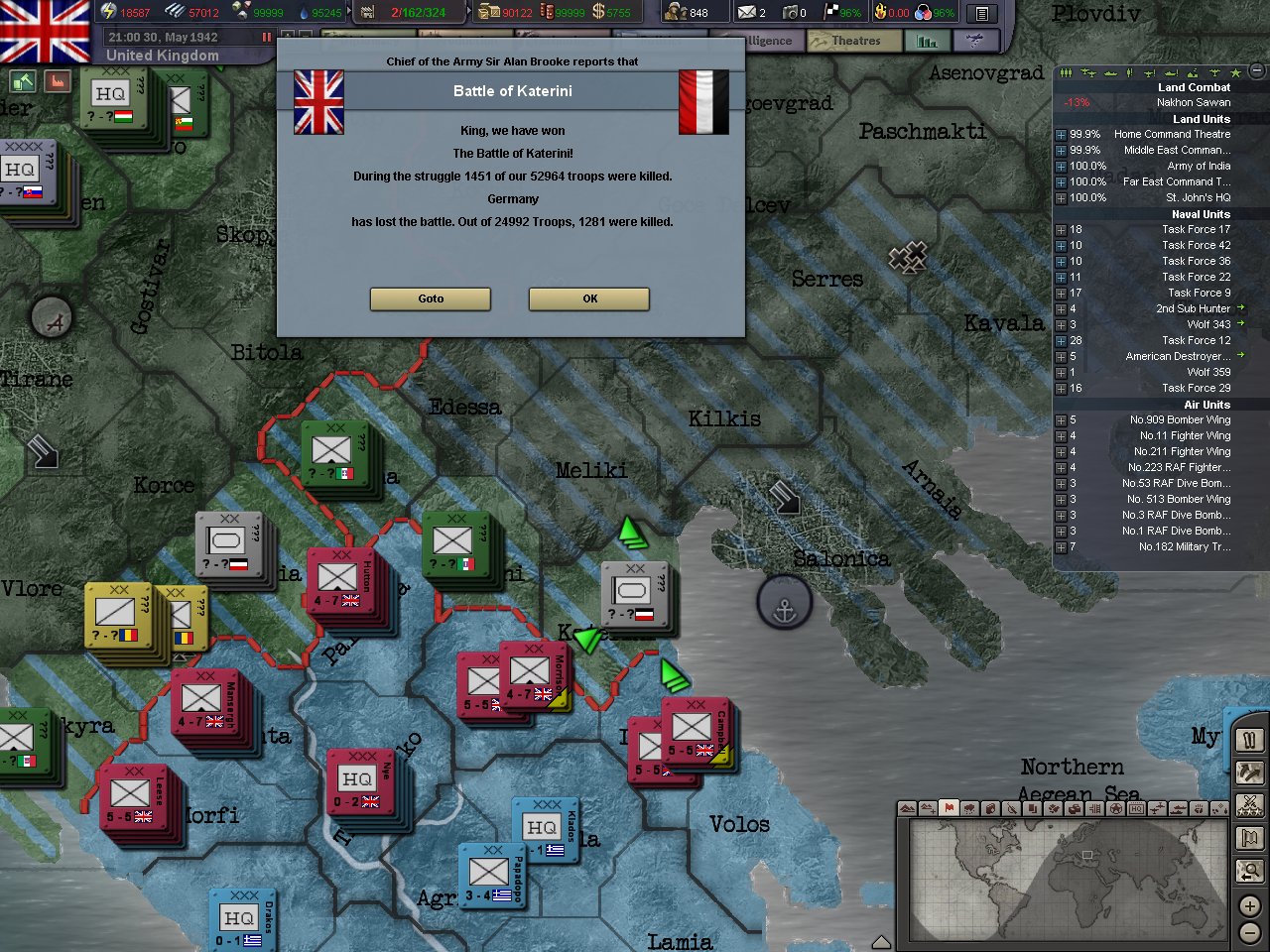
With the invasion of Italy coming, our forces in Greece were ordered to divert the attention of the Axis forces. The province of Katerini was attacked and with heavy casualites our forces managed to push the Germans out.
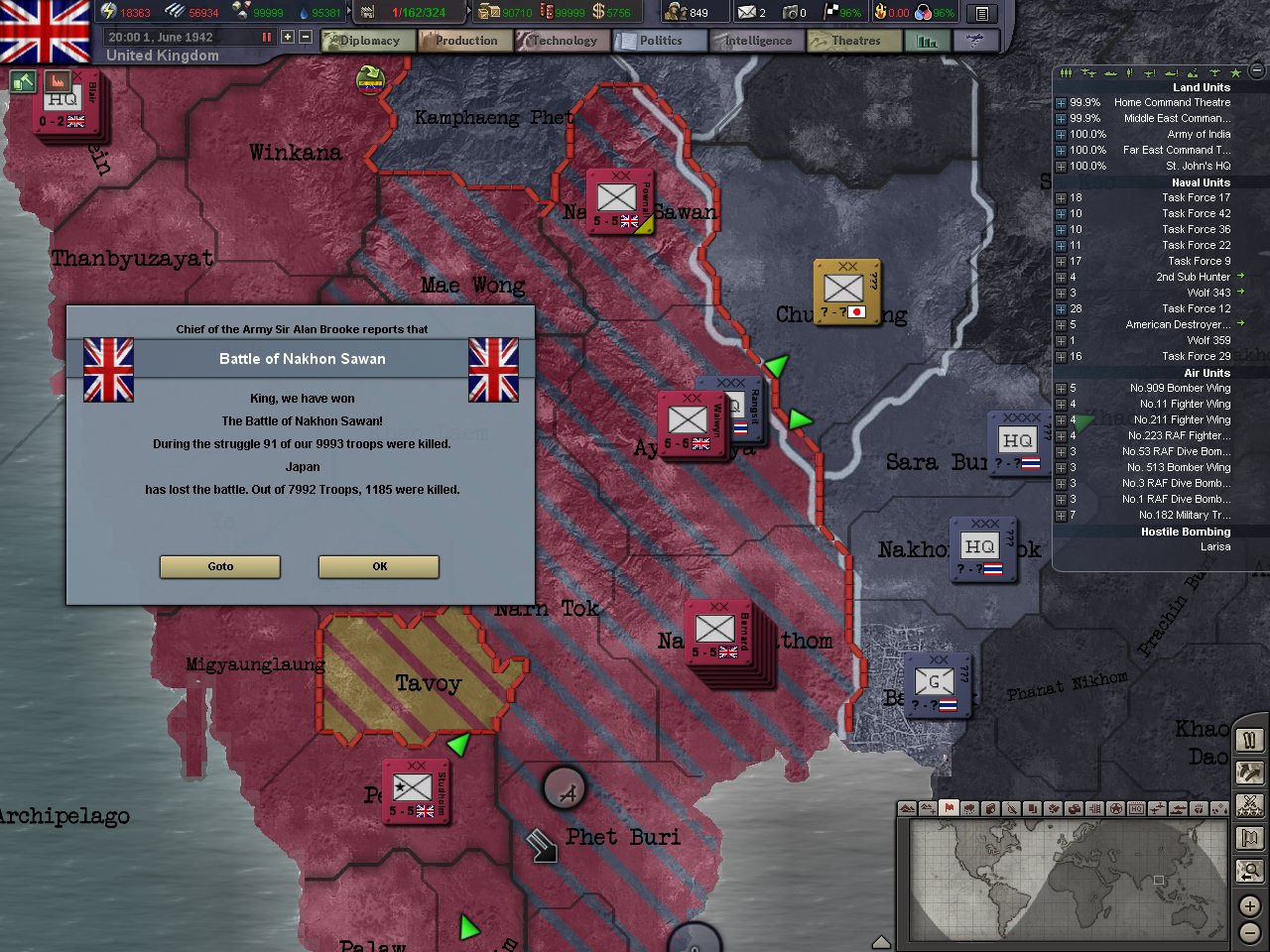
In Siam the Japanese forces tried to catch our troops off guard with surprise night attacks during the 31st and June 1st. The attacking Japanese troops were massacred. We killed eleven hundred and only last 91 men. A stunning victory. And with the enemy forces infront of our troops tired and demoralized from their attack. Our troops launched their own night attack and swept the Japanese from their positions.
The following day, the 6th,19th and 20th Indian divisions pushed the Siamese from their positions around Bangkok.
The following day, the 6th,19th and 20th Indian divisions pushed the Siamese from their positions around Bangkok.
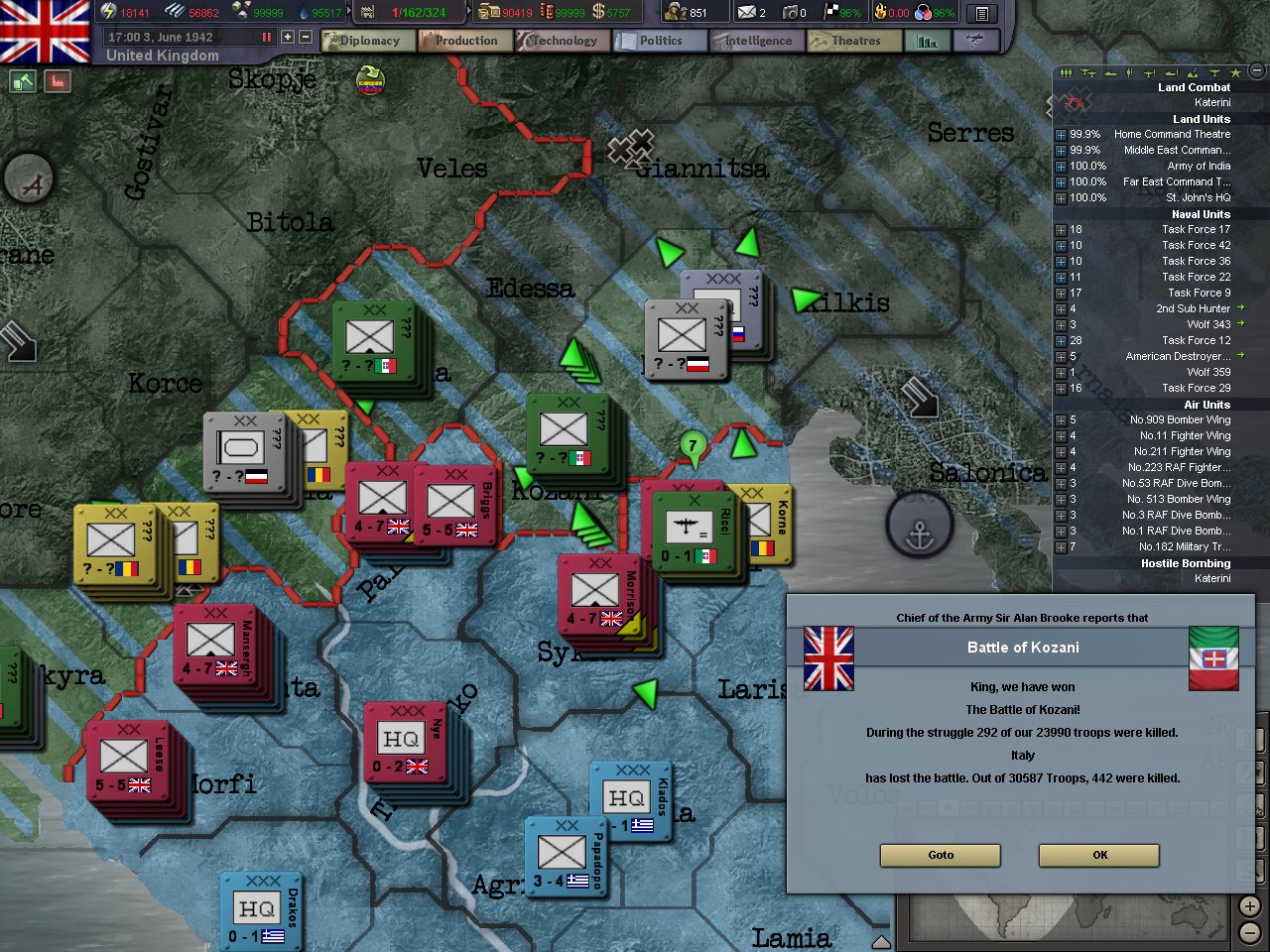
While our forces made progress around Bangkok, our troops secured another province in Greece and forced the Italian and German forces out with less loss of life than the previous battle in Katerini.
A combined-German, Bulgarian and Italian assault on Katerini was thrown back, almost 1,200 Axis soldiers were killed in the mountain passes.
A combined-German, Bulgarian and Italian assault on Katerini was thrown back, almost 1,200 Axis soldiers were killed in the mountain passes.
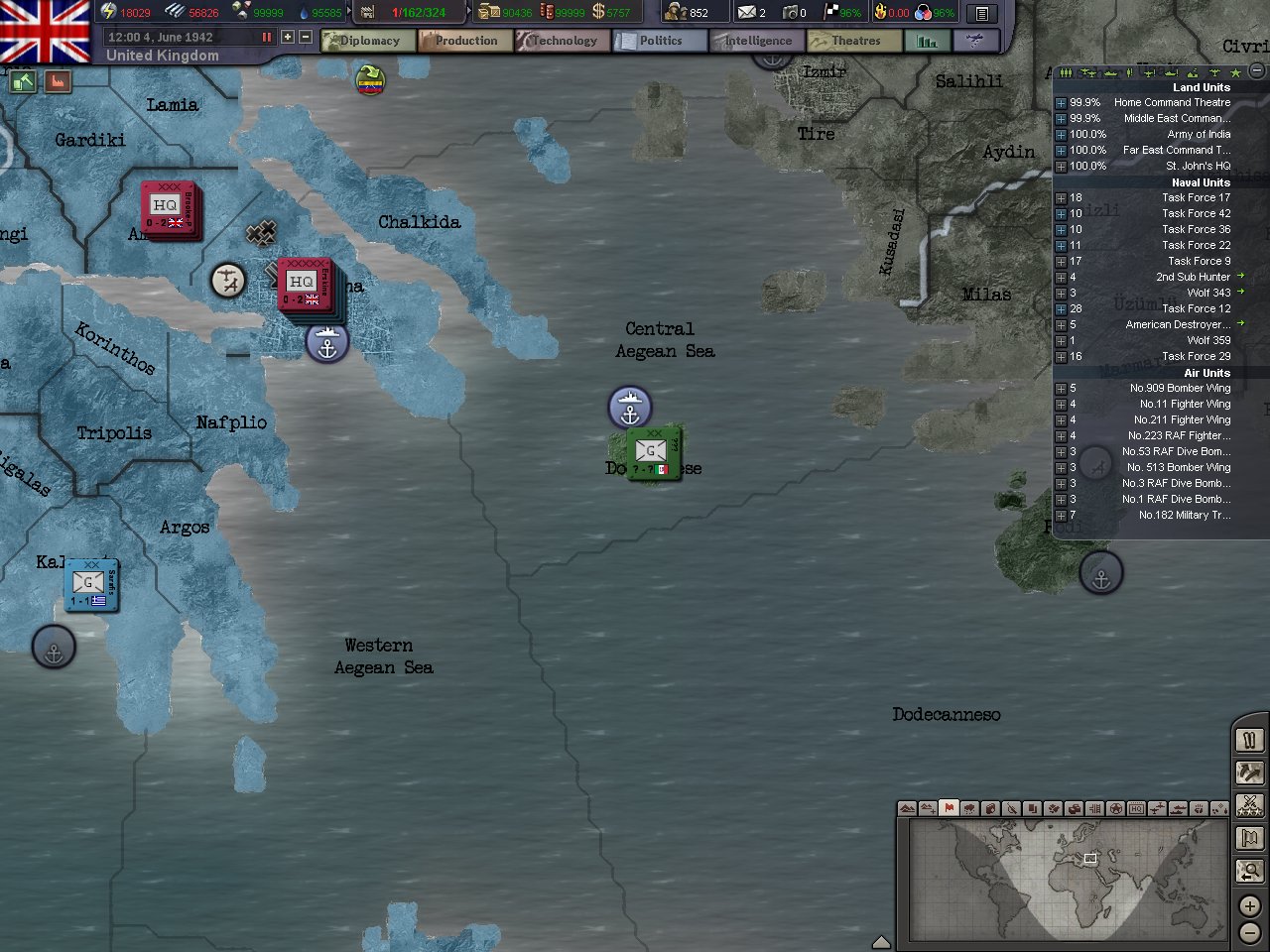
A small Italian garrison landed on an island off of Athens and established a small naval base for submarines and light ships. Convoys running in and out of Athens would have to be on more alert now with the small Italian thorn in our back.
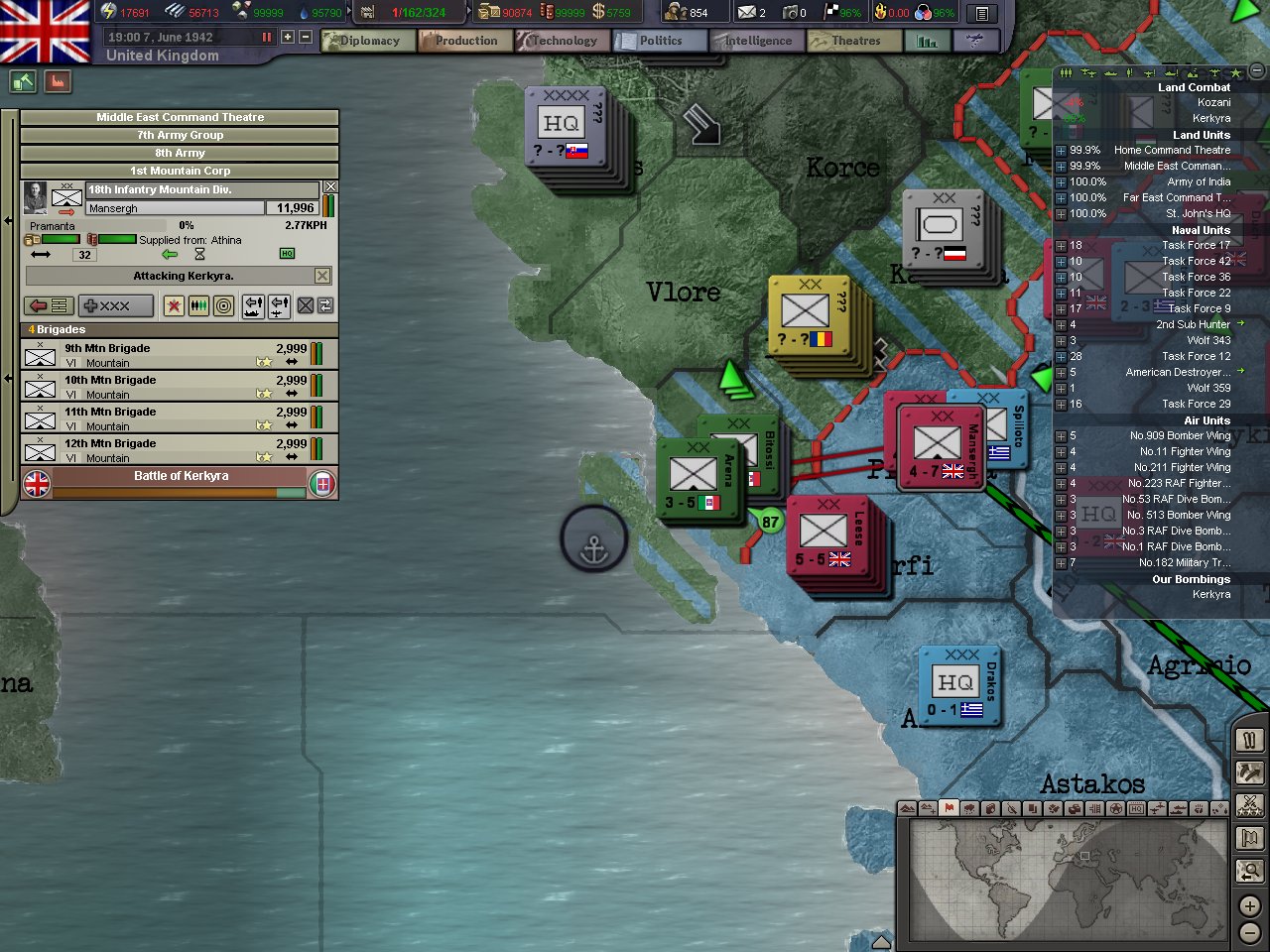
With significant advancements in the east of Greece, it was time to assault in the west. A drive down the western coastal roads was chosen and our forces launched themselves at the Italian defenders. With naval ships off the coast giving supporting fire and RAF fighters and bombers in Greece providing air cover the assault made quick progress. After a two day assault Kerkya was taken with only one thousand of our soldiers lost and nearly 1,500 enemy dead.
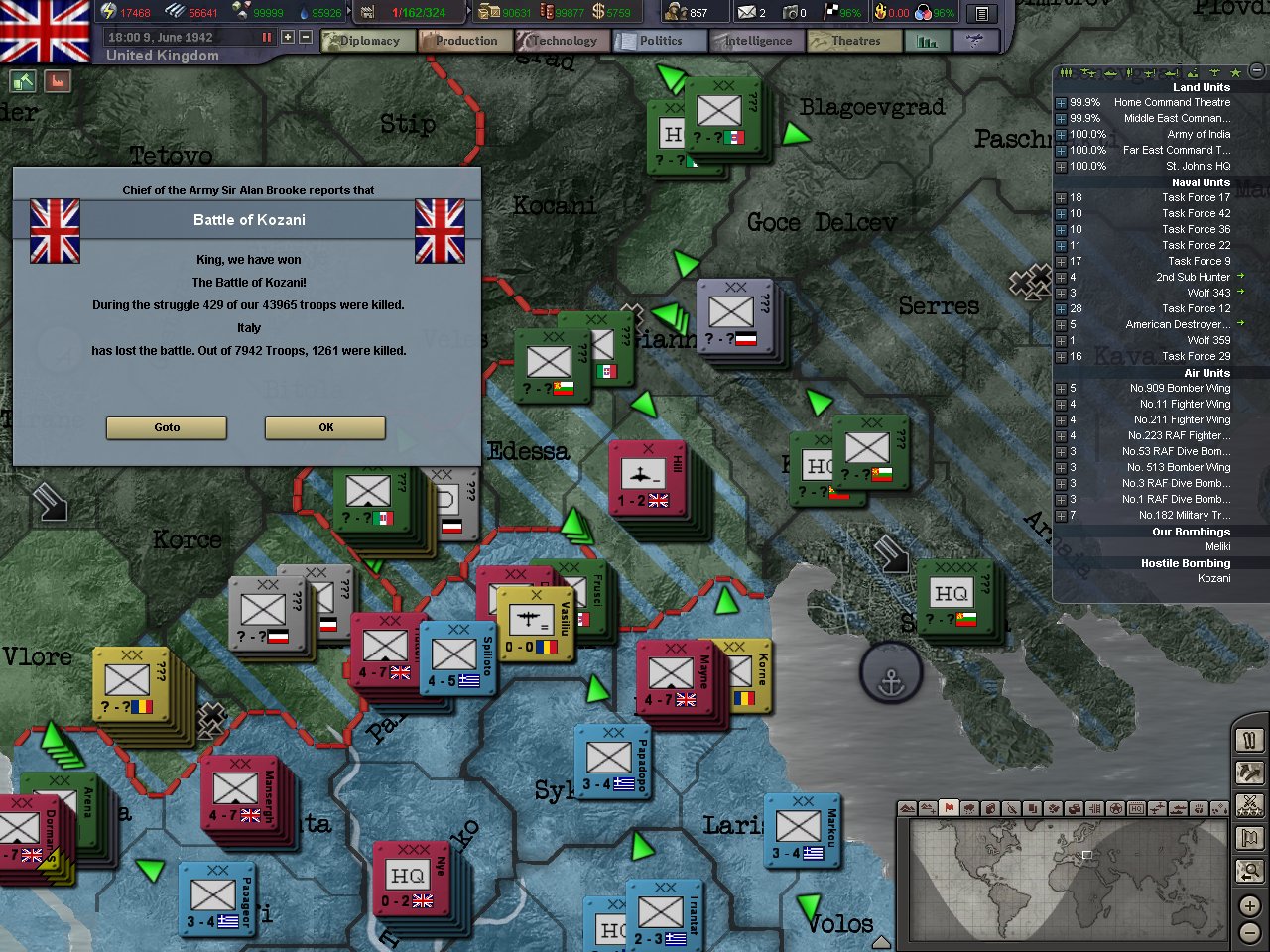
In the east, Axis forces continued to throw themselves at our positions in the mountains. And we continued to throw them back with more and more staggering enemy losses.
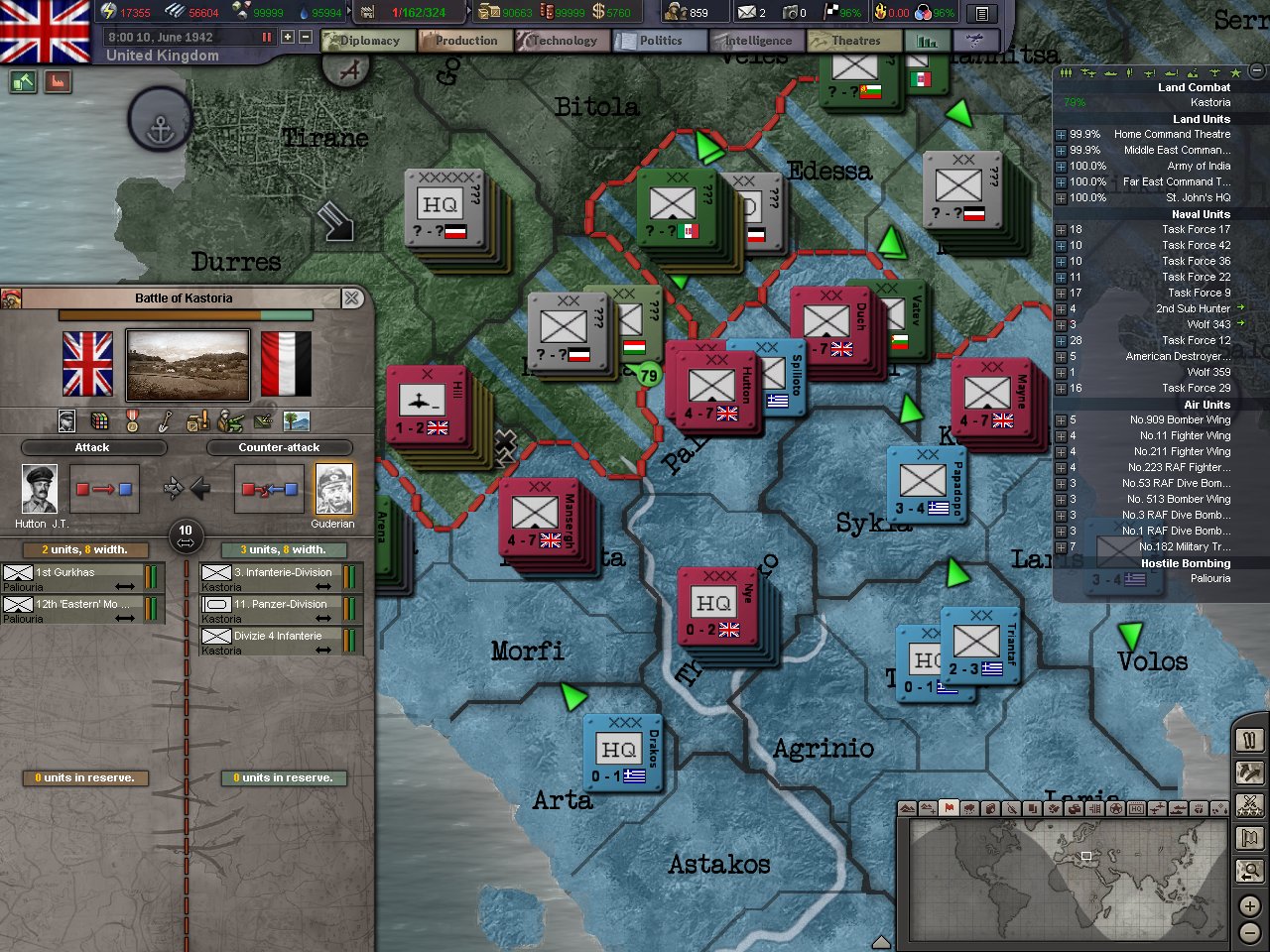
Kastoria was the next province targeted for assault. Troops would assault the enemy positions from two different directions. The hope was that when Kastoria was taken it would create a bulge in the Axis line. That bulge being the province of Ioannia.
Ioannia was a mountainous region with well made defensive positions that protected against an attack from any direction. Our forces would have to either surround and starve out the enemy, or get around the sides and force them out.
Ioannia was a mountainous region with well made defensive positions that protected against an attack from any direction. Our forces would have to either surround and starve out the enemy, or get around the sides and force them out.
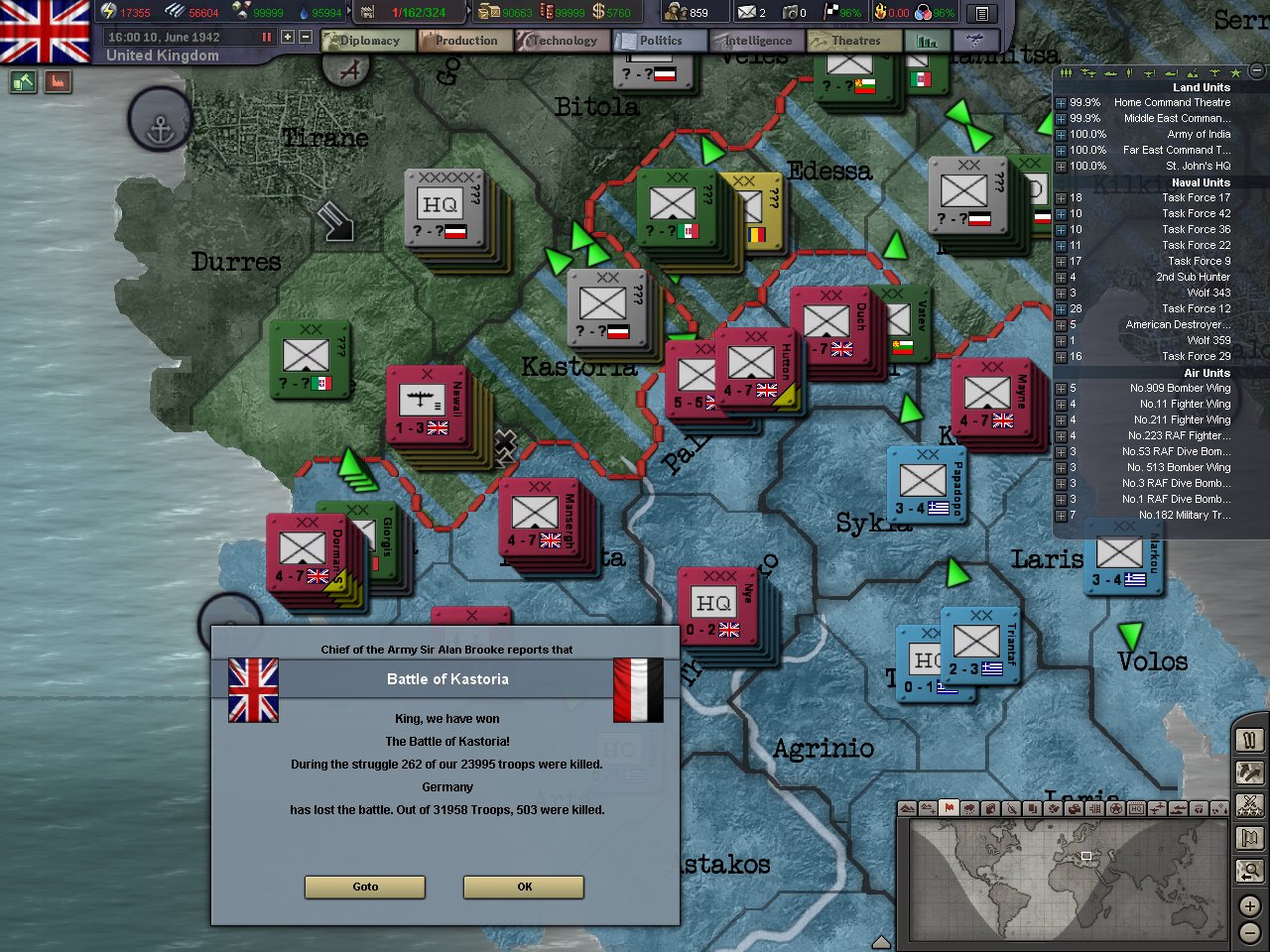
The Germans were driven out of Kastoria with ease. For the day before the assault our artillery and air power had been hammering the German positions so when our troops went in for the assault the enemy positions were already mangled and disorganized.
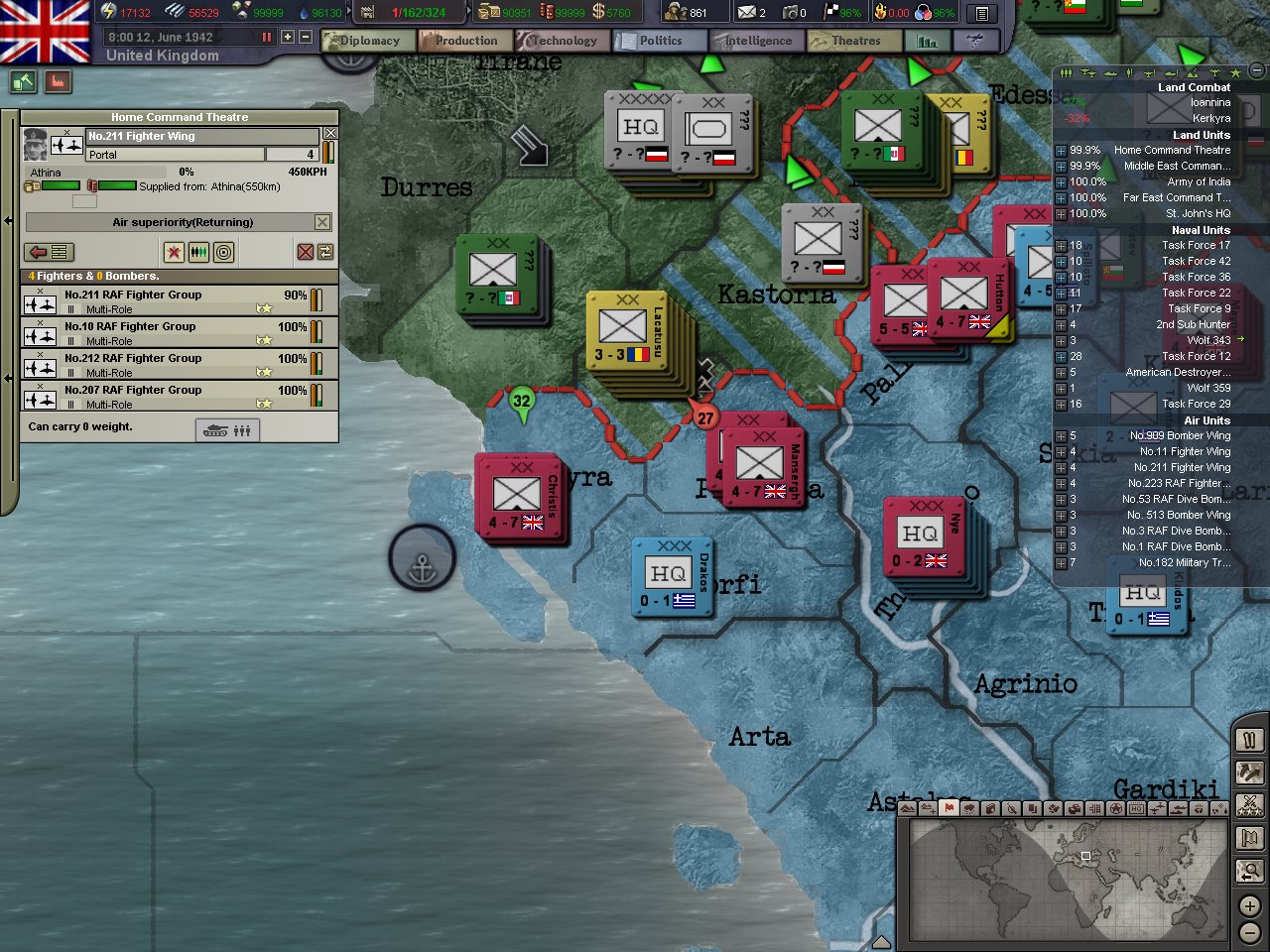
The Bulgarians had been tasked with holding Ioannia and repelling the assault everyone knew was coming. Our bombers had been hitting the positions day and night. And our artillery hadn't stopped for the day before the attack.
First we hit it from the south, then our forces from the west attacked. And finally our troops who had just taken Ioannia were launched into the assault.
After four days of attacking our troops finally took the mountain fortress.
First we hit it from the south, then our forces from the west attacked. And finally our troops who had just taken Ioannia were launched into the assault.
After four days of attacking our troops finally took the mountain fortress.
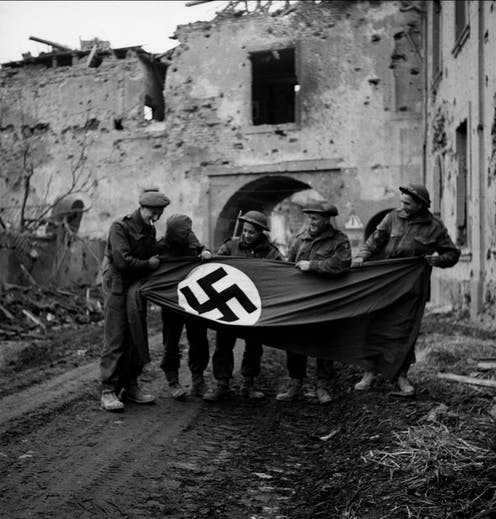
British soldiers with a captured German flag inside the Bulgarian positions in Ioannia,1942
It cost nearly three thousand men getting up the mountain and the Bulgarians lost nearly four thousand. Ioannia would go down as one of the most brutal battles in the war so far.
It cost nearly three thousand men getting up the mountain and the Bulgarians lost nearly four thousand. Ioannia would go down as one of the most brutal battles in the war so far.
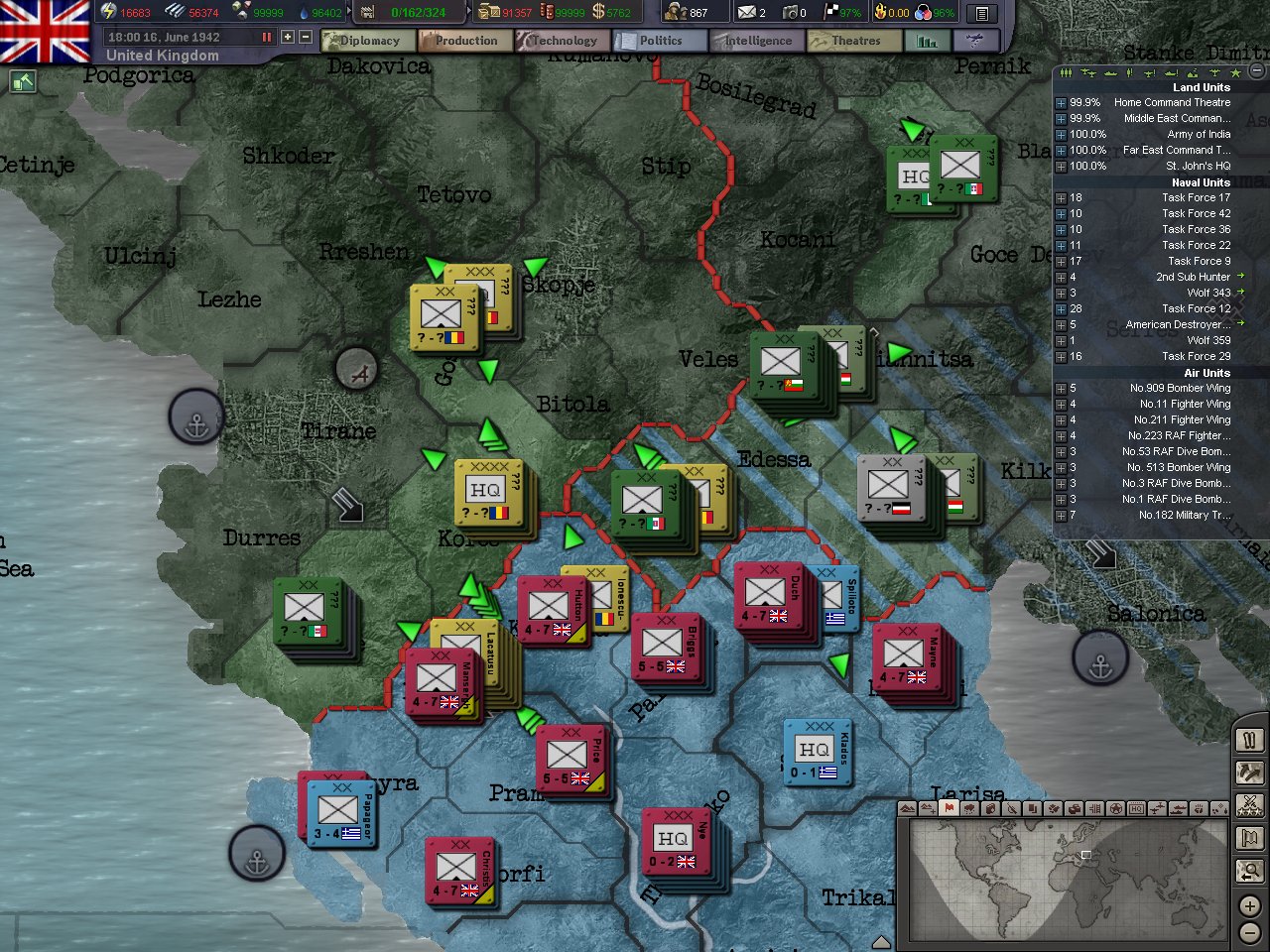
With the front expanded and pushed up the advance halted. Our troops were exhausted and the advance had cost far more men than had been expected. Newspapers and politicians alike would soon be talking about the rising causality lists from the campaign in Greece.
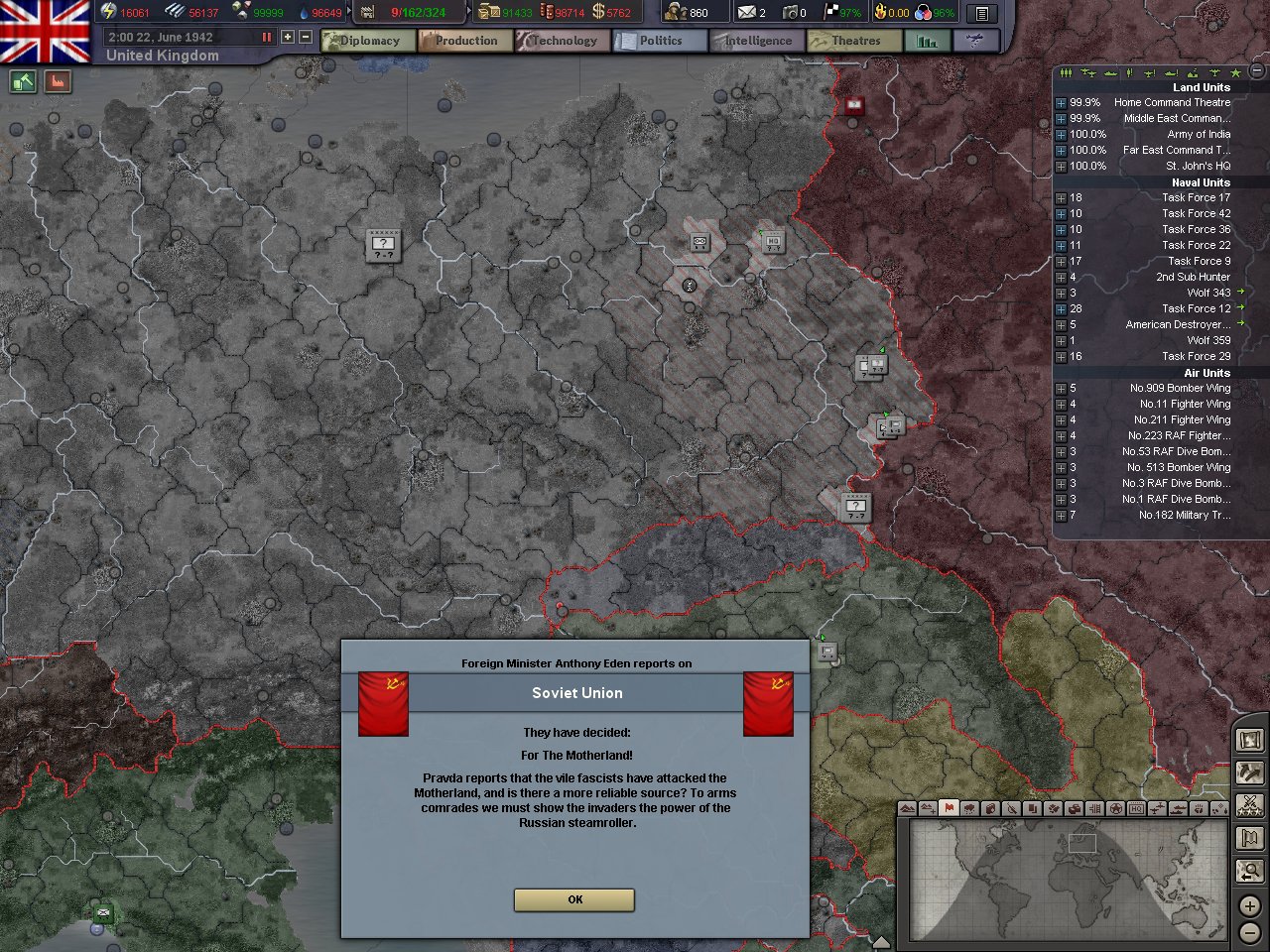
On June 22nd, 1942. The war changed.
The Soviet Union declared war on Nazi Germany. Adding another front to the war and giving the Nazis more enemies to fight.
The timing couldn't be better for us. The invasion of Italy is nearing and the Soviets drawing away hundreds of thousands of troops and hundreds of supplies would only make the invasion easier for us.
The Soviet Union declared war on Nazi Germany. Adding another front to the war and giving the Nazis more enemies to fight.
The timing couldn't be better for us. The invasion of Italy is nearing and the Soviets drawing away hundreds of thousands of troops and hundreds of supplies would only make the invasion easier for us.
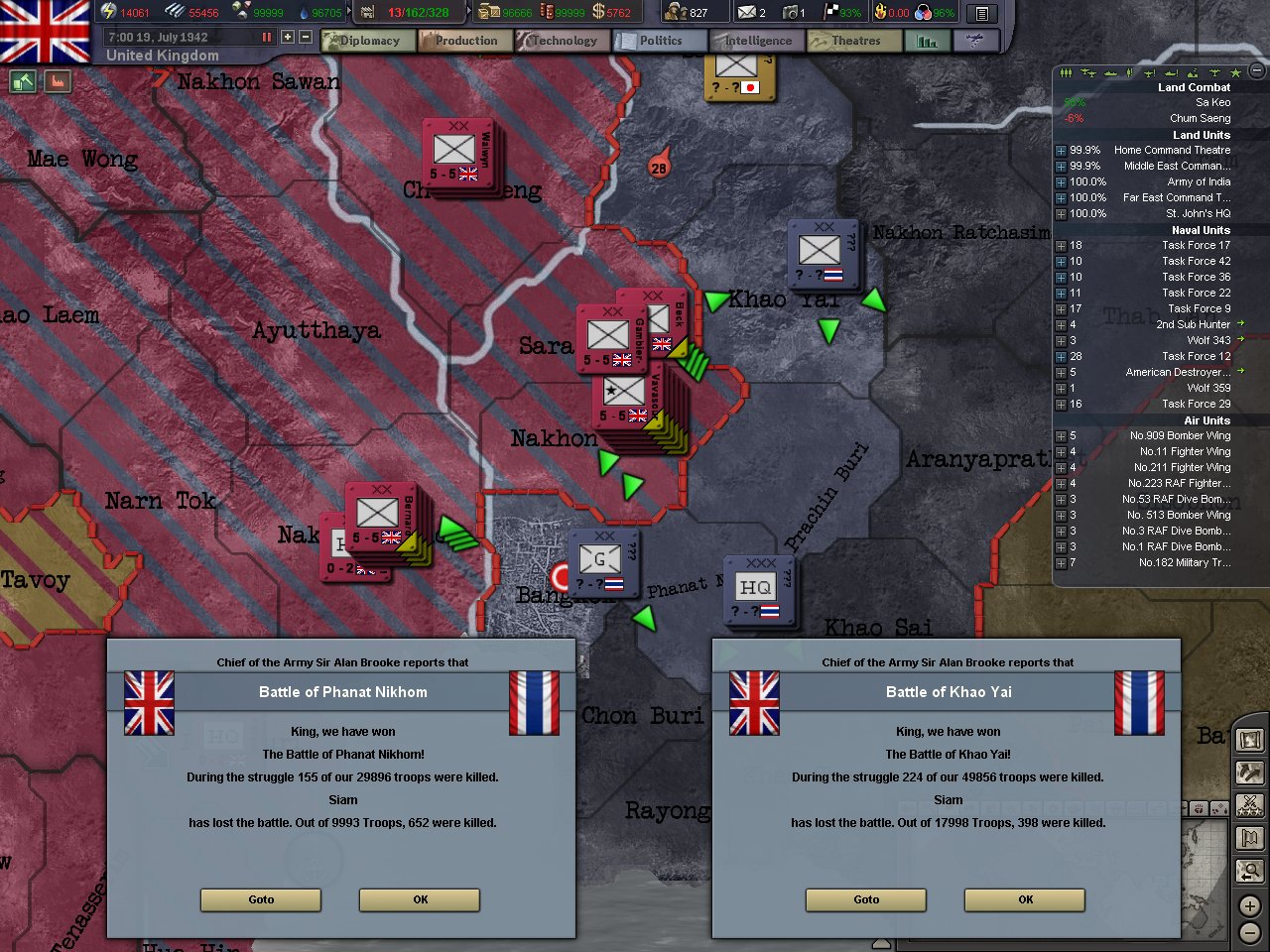
In mid July our forces in the Far East launched the assault on Bangkok. Our troops also launched attacks all along the front to break up the Japanese front line and create weak spots and holes our troops could exploit.
Following the victory at Bangkok, our forces won two battles with heavy casualites in both. In both battles the Japanese lost atleast 500 men, while our own forces lost atleast 300. These were bloody affairs but blood would have to pave the way to Berlin and Tokyo.
Following the victory at Bangkok, our forces won two battles with heavy casualites in both. In both battles the Japanese lost atleast 500 men, while our own forces lost atleast 300. These were bloody affairs but blood would have to pave the way to Berlin and Tokyo.
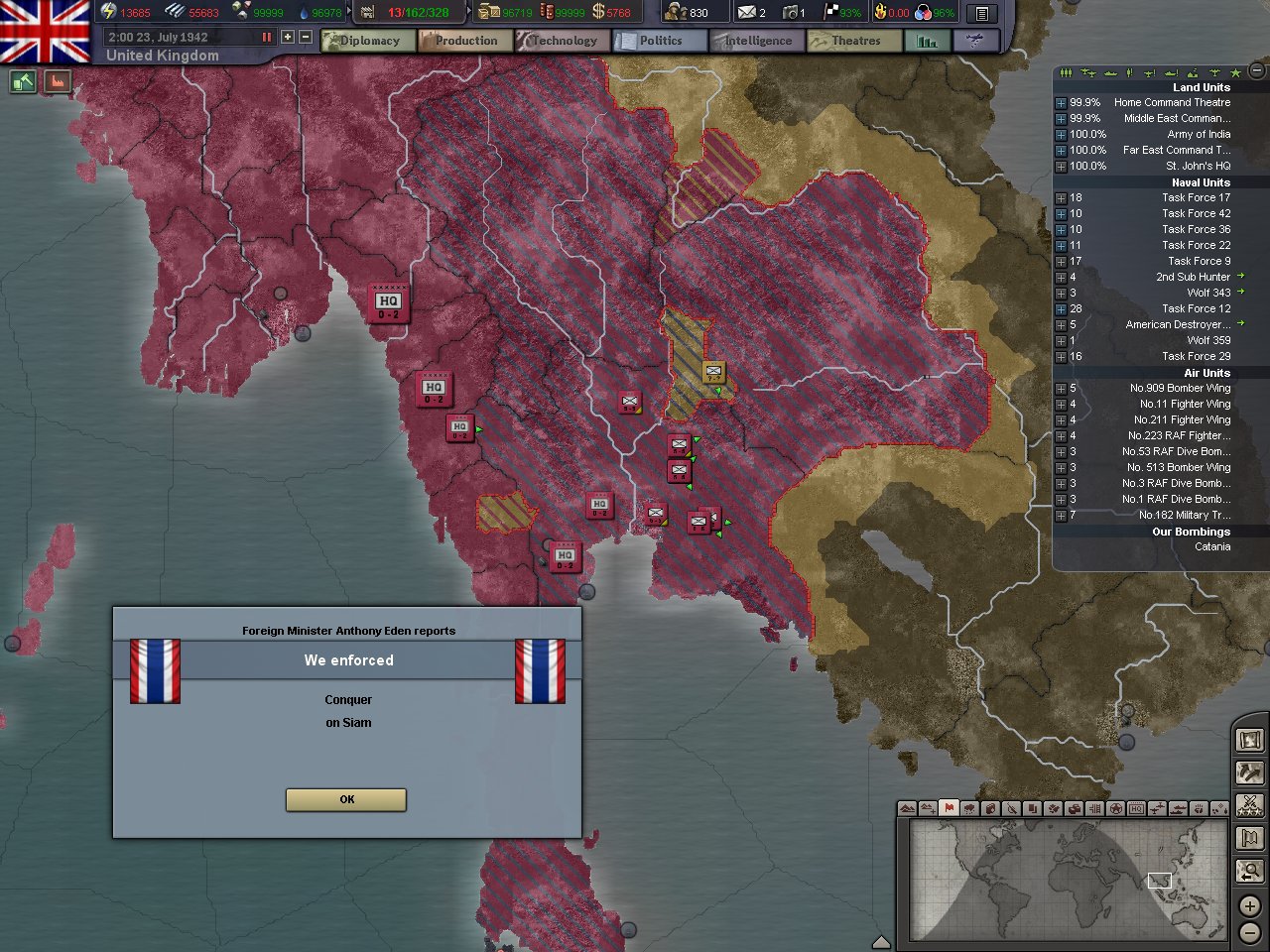
Several days after Bangkok fell, Siam capitulated. With Siam out of the way the front line was wide open for our forces.
The Army of India was ordered to plunge into the heart of Indochina. The first objective was the city of Saigon, then onto Hanoi. Once Indochina was liberated our forces could mount assaults on China, Taiwan, and the Japanese home islands.
The Army of India was ordered to plunge into the heart of Indochina. The first objective was the city of Saigon, then onto Hanoi. Once Indochina was liberated our forces could mount assaults on China, Taiwan, and the Japanese home islands.
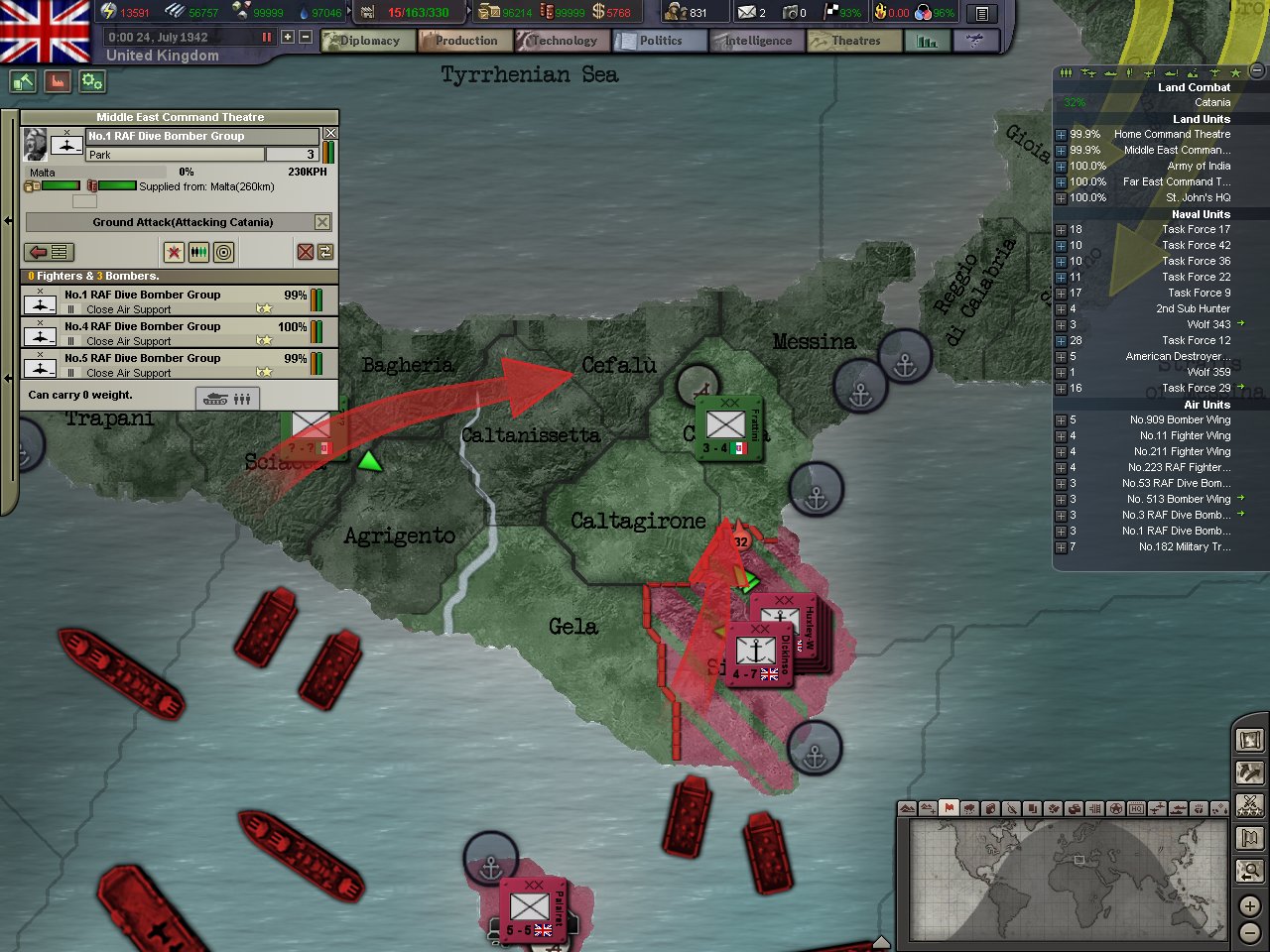
At midnight on the 24th of July, the 1st Commando Corp landed on the shores of Sicily.
Initial resistance was light but once our forces moved inland we hit the Italian defensive line.
The Italians were dug into the mountain side and would have to be shelled and bombed out of their holes. Bombers from Malta and the three carriers off the coast joined in the assault; as well as the big guns of the battleships patrolling the sea lanes.
Initial resistance was light but once our forces moved inland we hit the Italian defensive line.
The Italians were dug into the mountain side and would have to be shelled and bombed out of their holes. Bombers from Malta and the three carriers off the coast joined in the assault; as well as the big guns of the battleships patrolling the sea lanes.
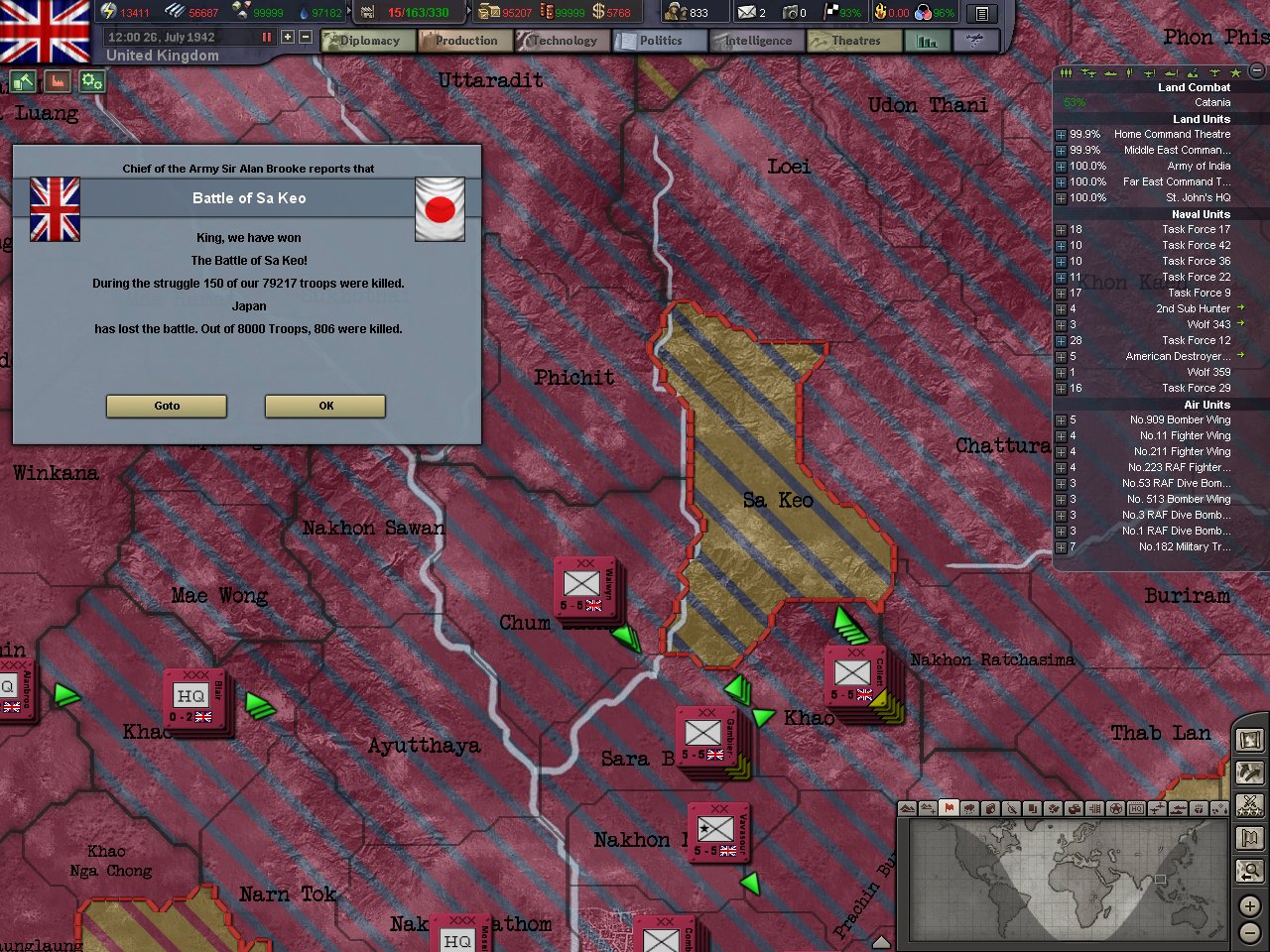
In Siam, several Japanese divisions were cut off and destroyed. Over five thousand Japanese soldiers walked into captivity with their heads hung low.
With this thorn in our side gone, the advance into Indochina could move onward unhindered and without threat.
With this thorn in our side gone, the advance into Indochina could move onward unhindered and without threat.
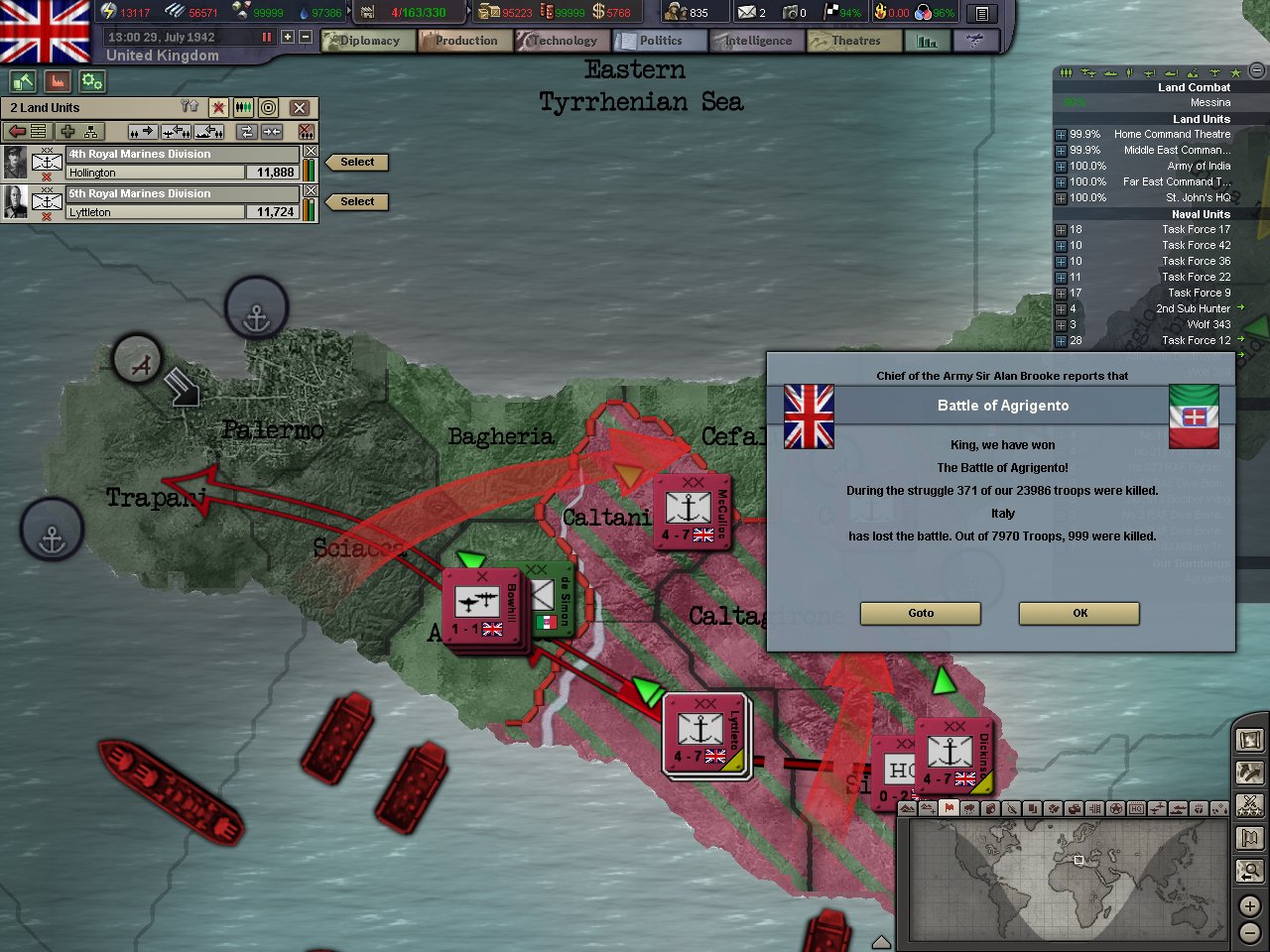
On the 27th our forces met a second Italian division holding a line across a river. After two days and several night assaults across the river we managed to push the Italians out of their lines. The enemy retreat was harried the whole time by our airforce and navy.
Pushing the Italians off of their defensive lines cost us almost one thousand men. But that was the cost of taking Sicily and destroying our enemy.
Pushing the Italians off of their defensive lines cost us almost one thousand men. But that was the cost of taking Sicily and destroying our enemy.
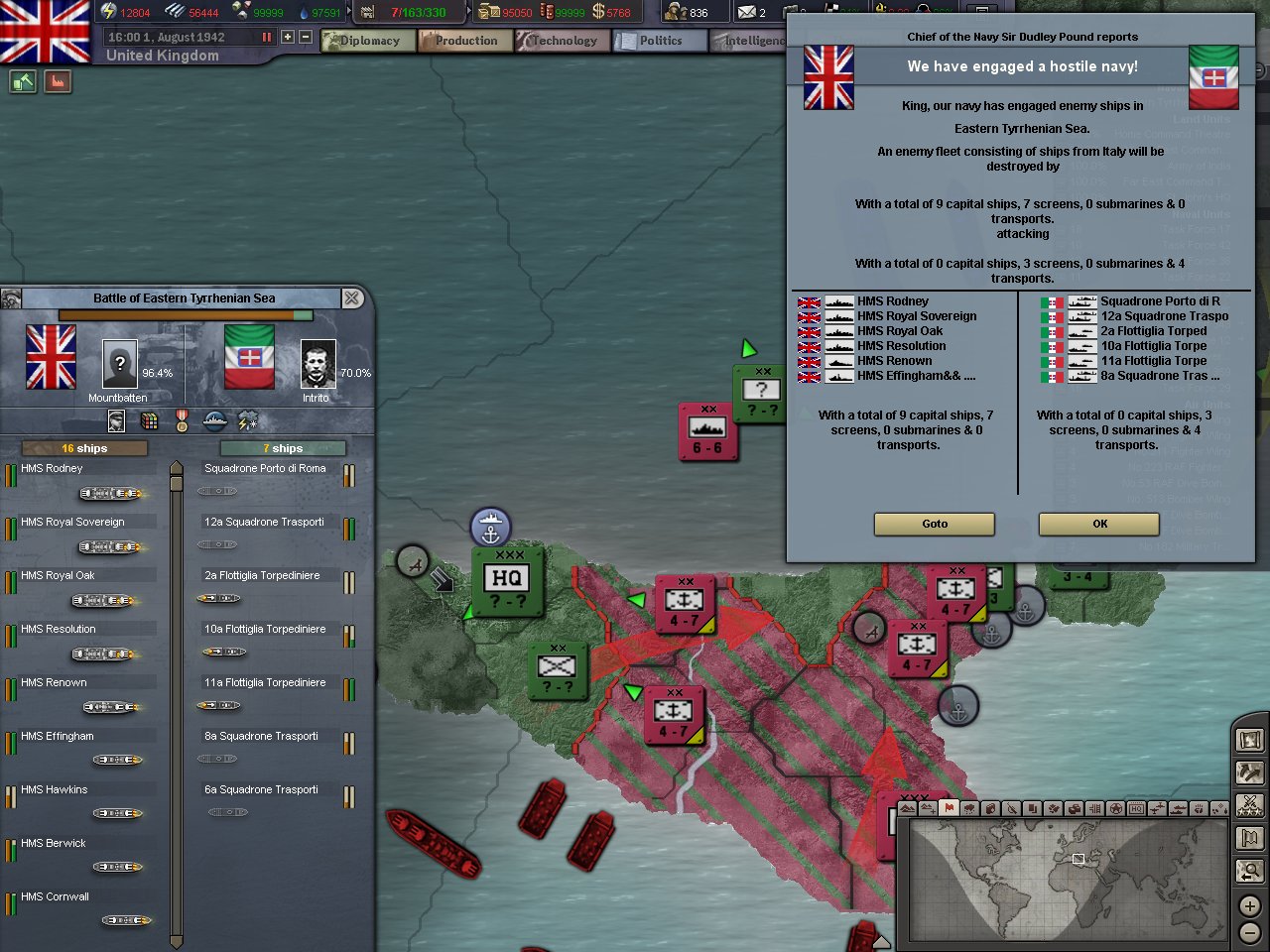
An Italian fleet attempting to bring troops into or out of Sicily was destroyed.
Our fleet led by the HMS Rodney, Royal Sovereign, Royal Oak, and Resolution, poured broadside after broadside into the Italian fleet. The Italians were caught in the open sea and with an incompetent commander were thoroughly destroyed.
A second fleet followed two days later and met the same fate as the first, destroyed and obliterated.
Our fleet led by the HMS Rodney, Royal Sovereign, Royal Oak, and Resolution, poured broadside after broadside into the Italian fleet. The Italians were caught in the open sea and with an incompetent commander were thoroughly destroyed.
A second fleet followed two days later and met the same fate as the first, destroyed and obliterated.
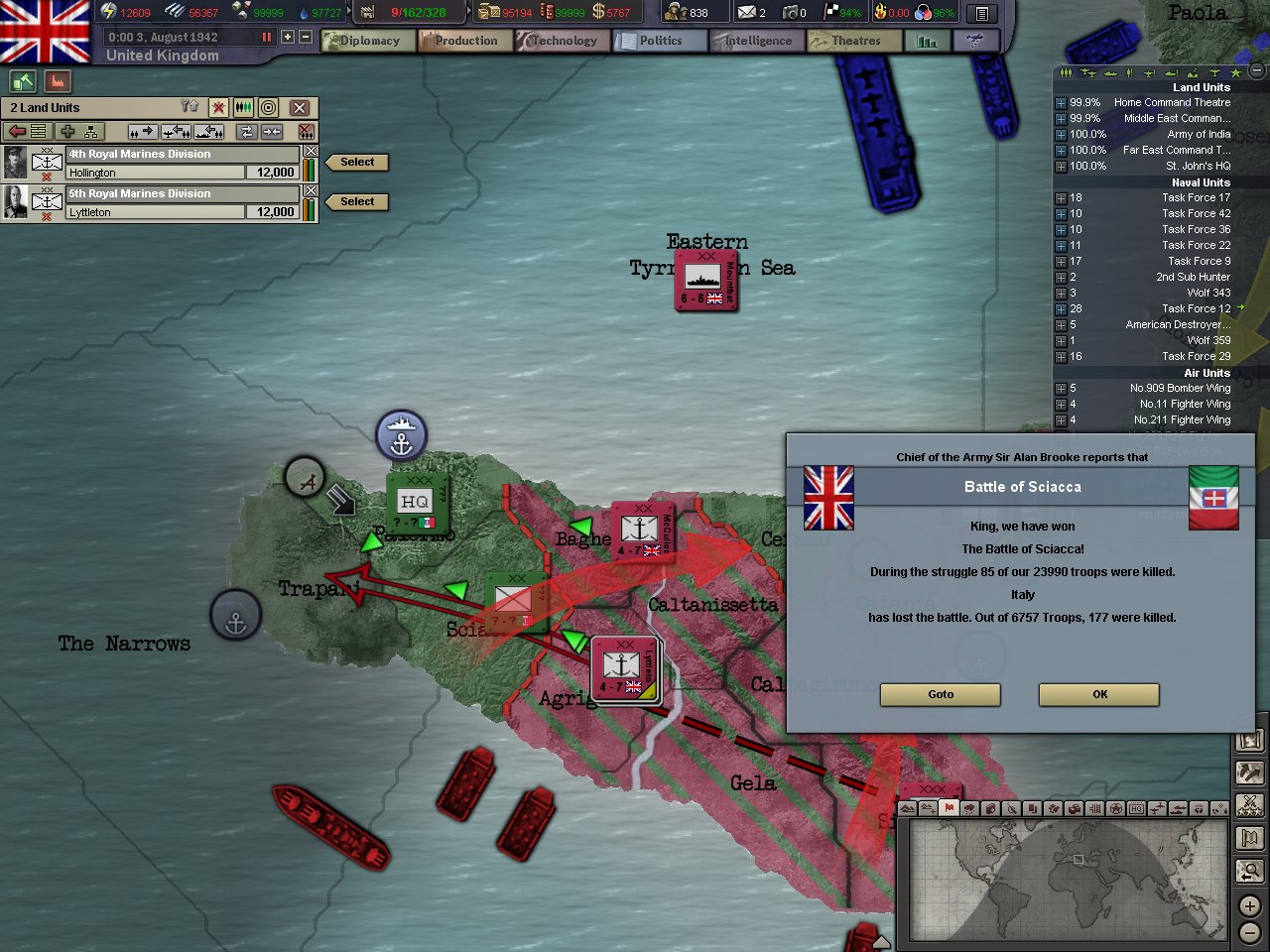
The 4th and 5th divisions of the Commando Corp finished off the campaign cornering and destroyed a enemy division with little casualties.
An Italian attempt to send troops across the straits of Messina was beaten back with heavy enemy causalities. More Italian naval ships were destroyed as well. Five transports were sunk along with all their cargo.
An Italian attempt to send troops across the straits of Messina was beaten back with heavy enemy causalities. More Italian naval ships were destroyed as well. Five transports were sunk along with all their cargo.
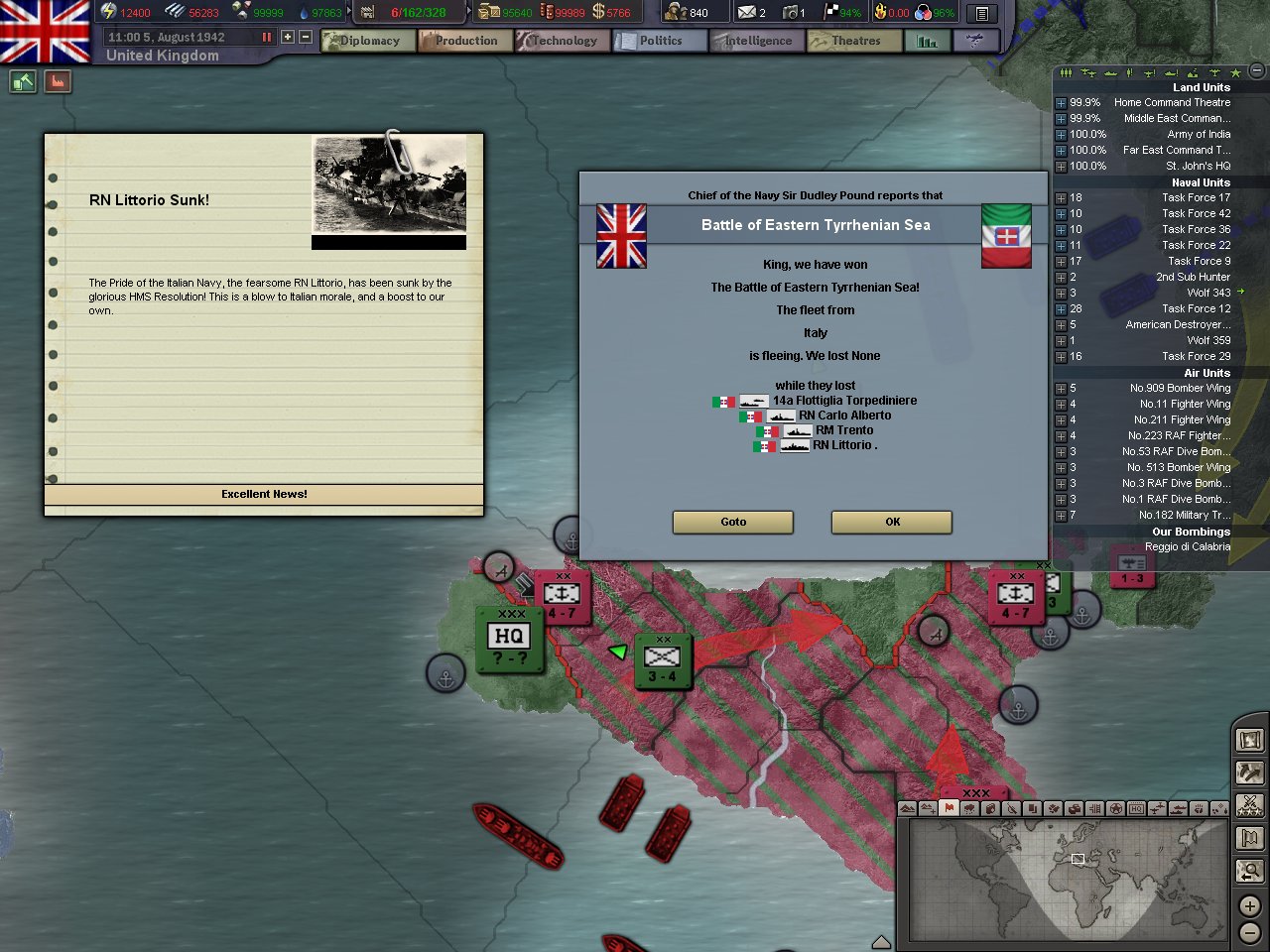
The Italians sent more ships desperately into the jaws of our navy. Mountbatten's fleet was battered but had taken no casualties and had sunk over twenty ships. The invasion of Sicily had been successful and cost the Italians two infantry divisions, and a very significant portion of their remaining navy.
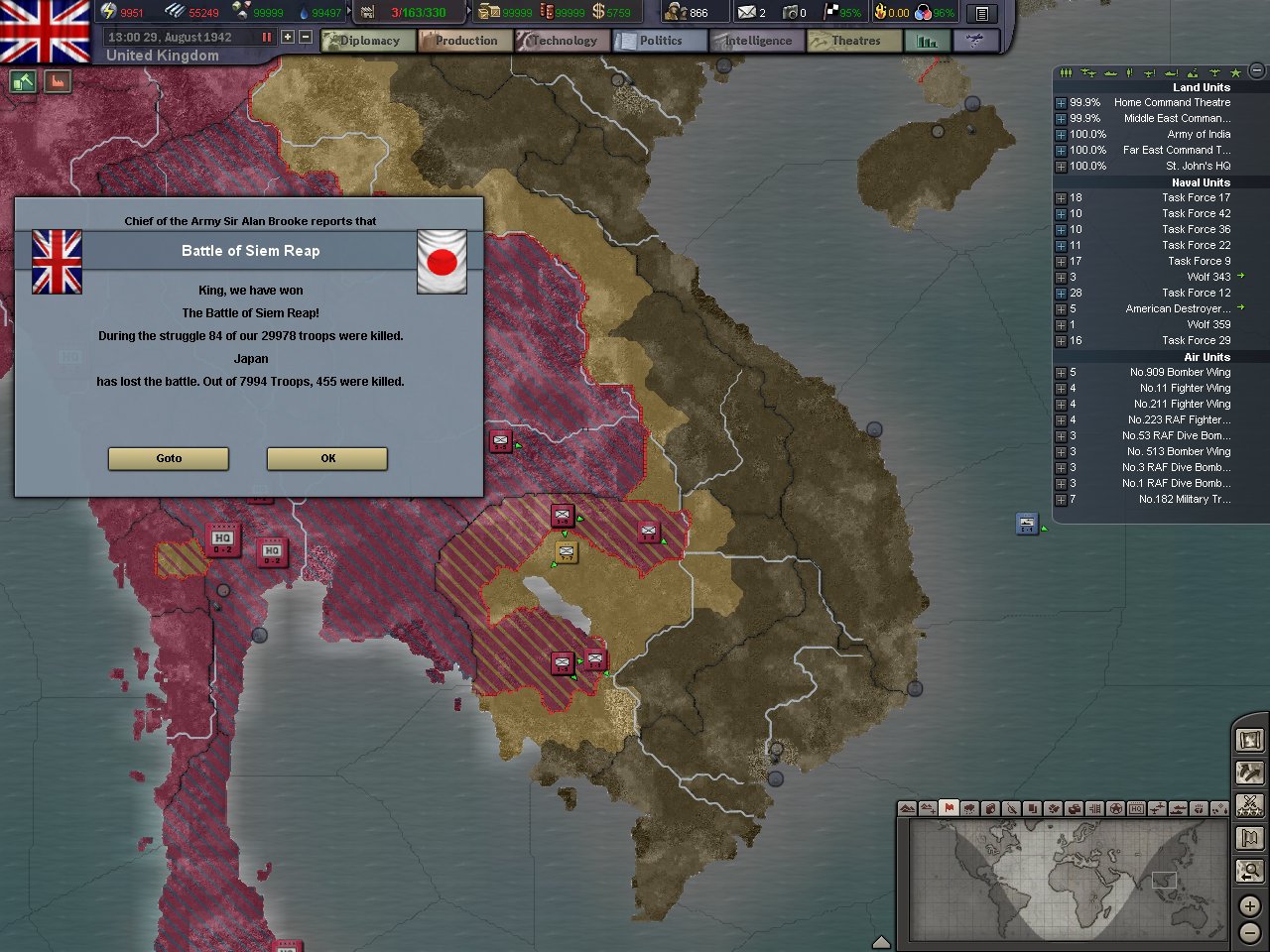
A Japanese division, attempting to move into position against our forces in the Far East were caught off guard by our rapid advance.
The vanguard of their division made contact with the lead troops of our invasion. The initial small firefight grew into a large scale battle with our forces dug into good positions. Our other advancing divisions swung in on the Japanese flanks and turned the battle into a rout.
The vanguard of their division made contact with the lead troops of our invasion. The initial small firefight grew into a large scale battle with our forces dug into good positions. Our other advancing divisions swung in on the Japanese flanks and turned the battle into a rout.
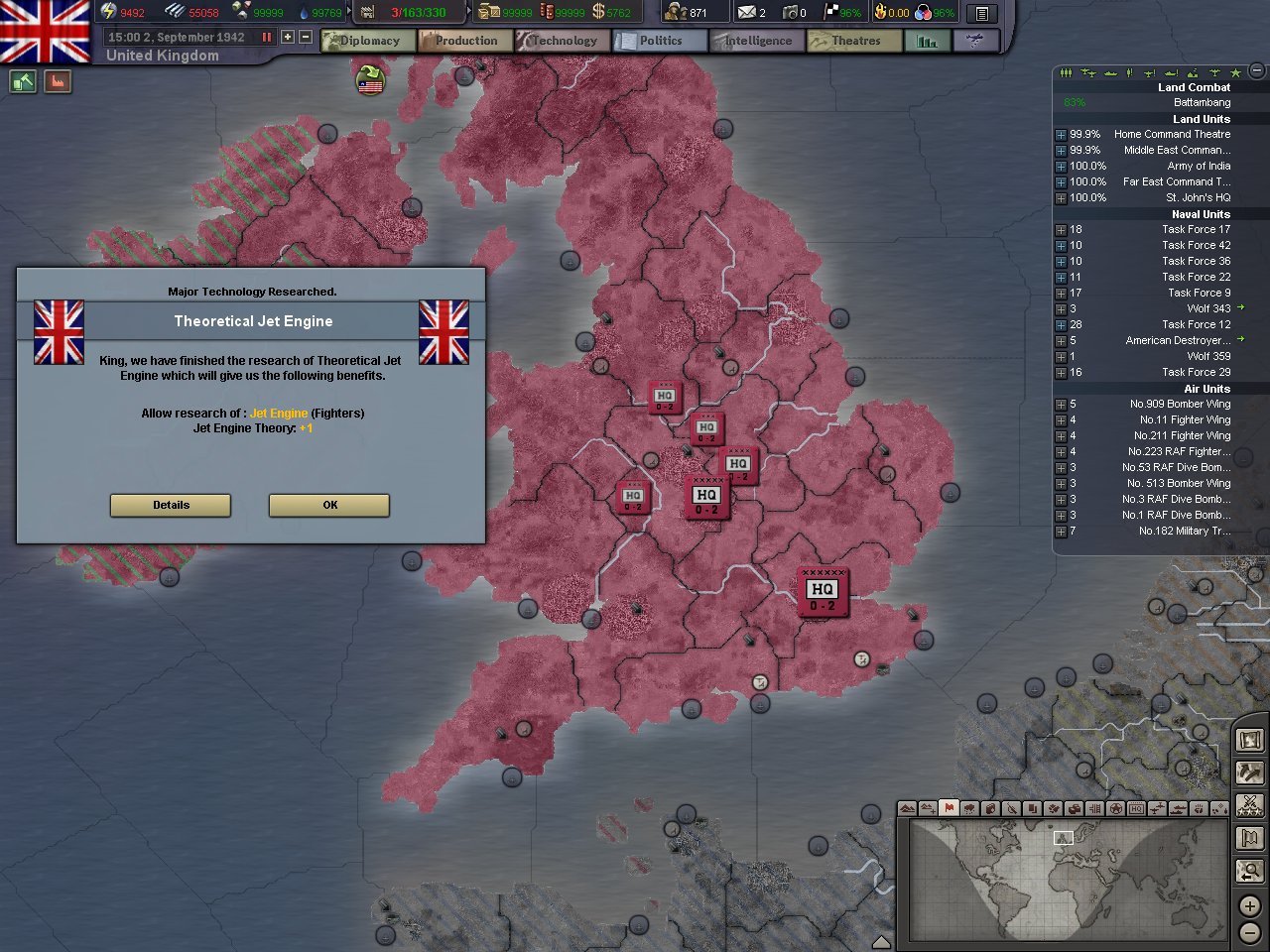
September kicked off with good news. Our scientists working in the home islands began working on the jet engine. If we could figure out how to stabilize it and put into flight without the whole thing going boom our fighters would rule the sky in no time.
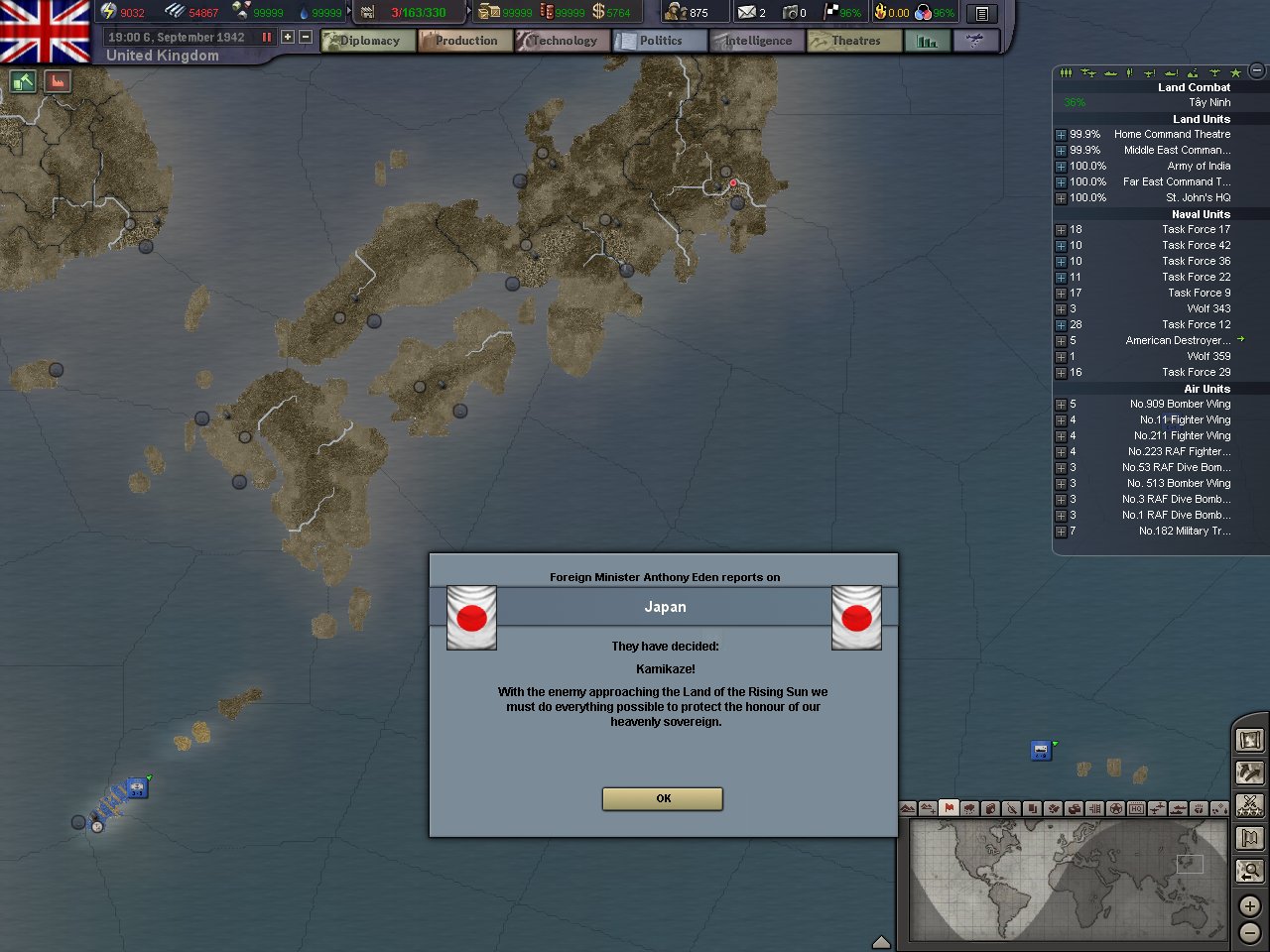
American marine forces landed on the island of Okinawa and were met by something no one had seen from the Japanese thus far in the war. Deliberate suicide attacks.
The American fleet was torn apart and a great deal of ships were sunk or heavily damaged during the assault on the island.
The American fleet was torn apart and a great deal of ships were sunk or heavily damaged during the assault on the island.
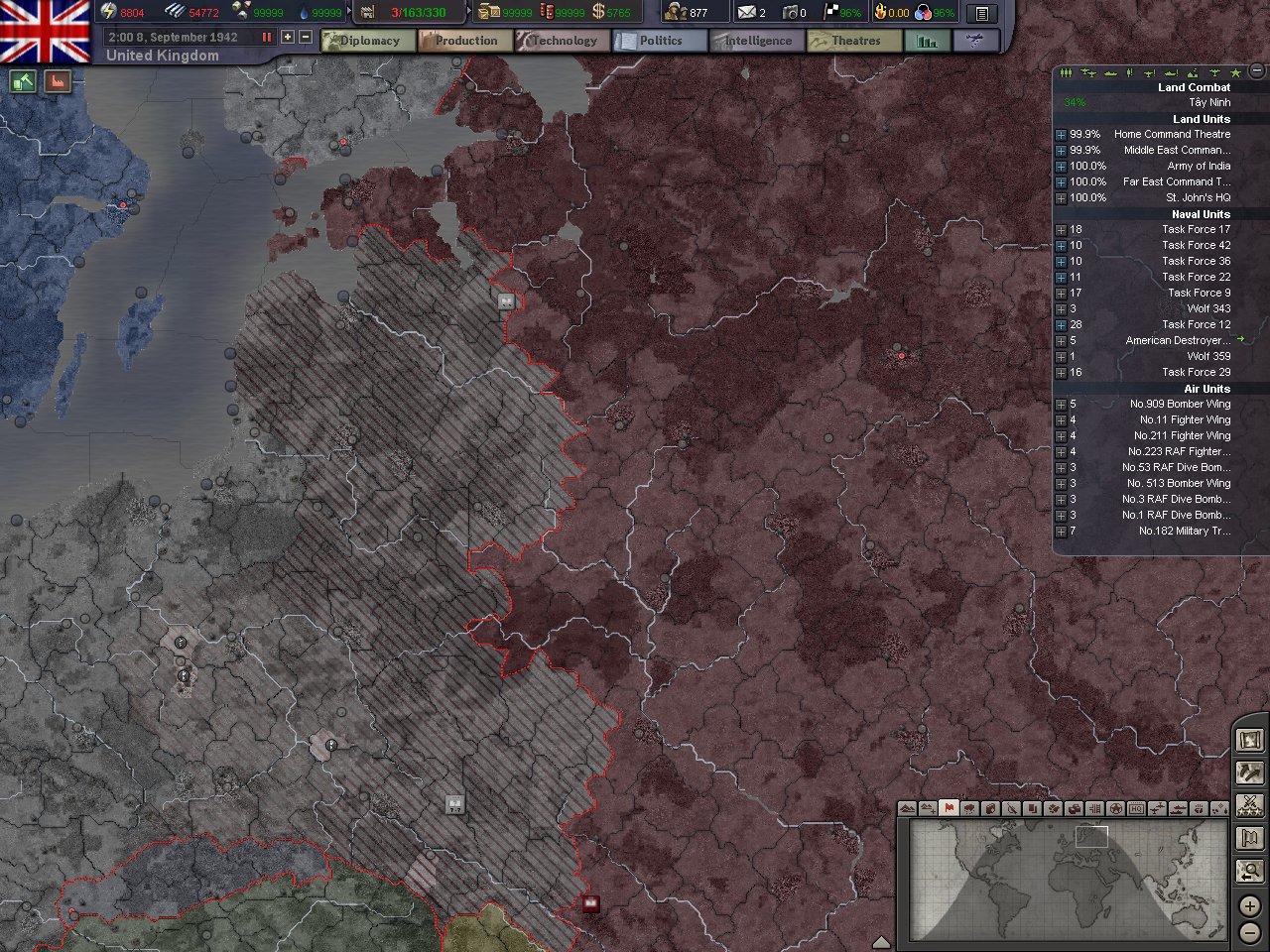
On the Russian Front the Germans were advancing closer and closer to the great cities of Leningrad and Kiev. The Russians were putting every man and woman infront of the Germans but the Nazi war machine kept on moving forward.
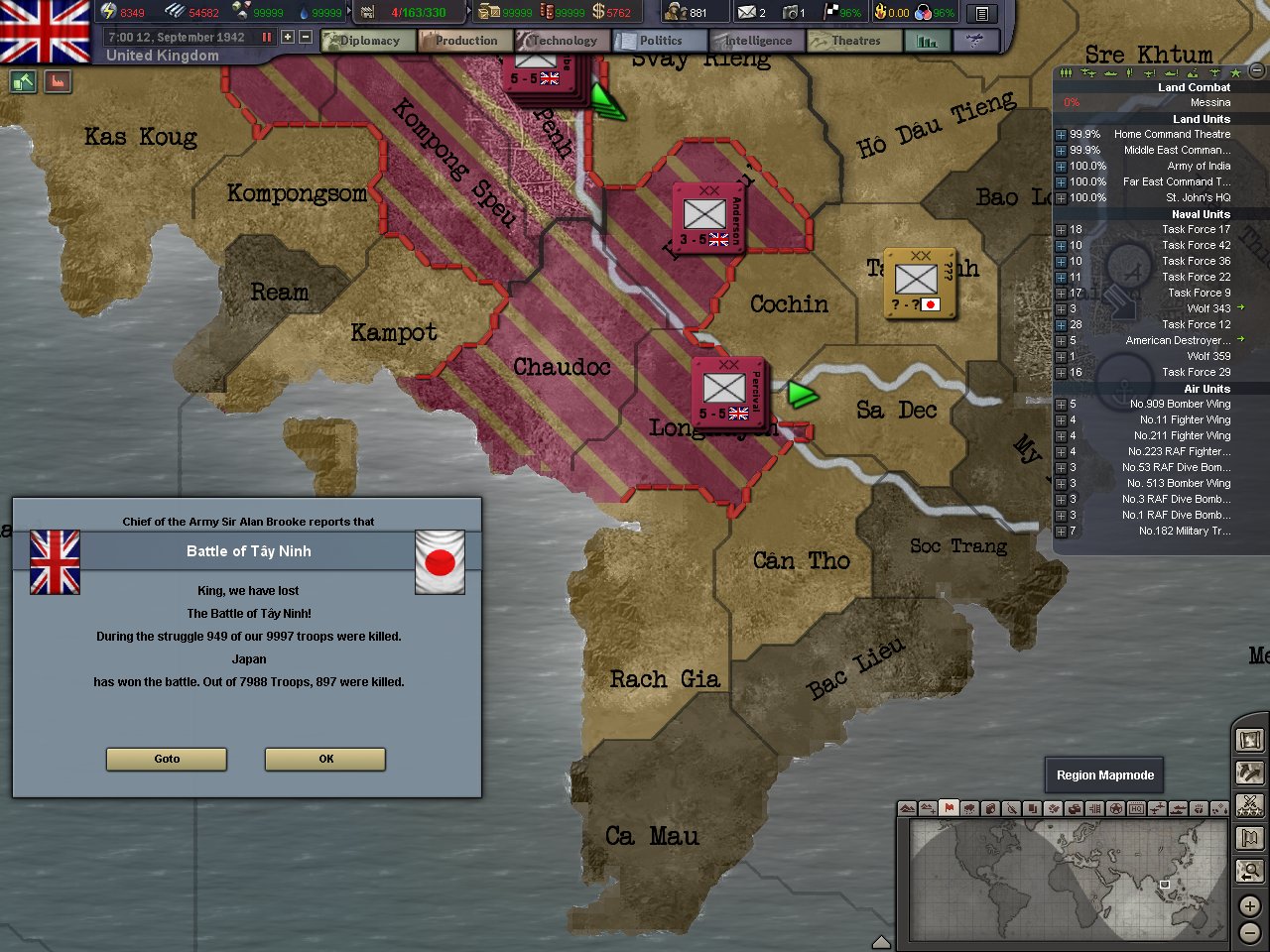
Several kilometres outside of Saigon our forces were thrown back by determined Japanese resistance. It was the first real resistance our troops had faced since the fall of Siam and bloodied our noses a little.
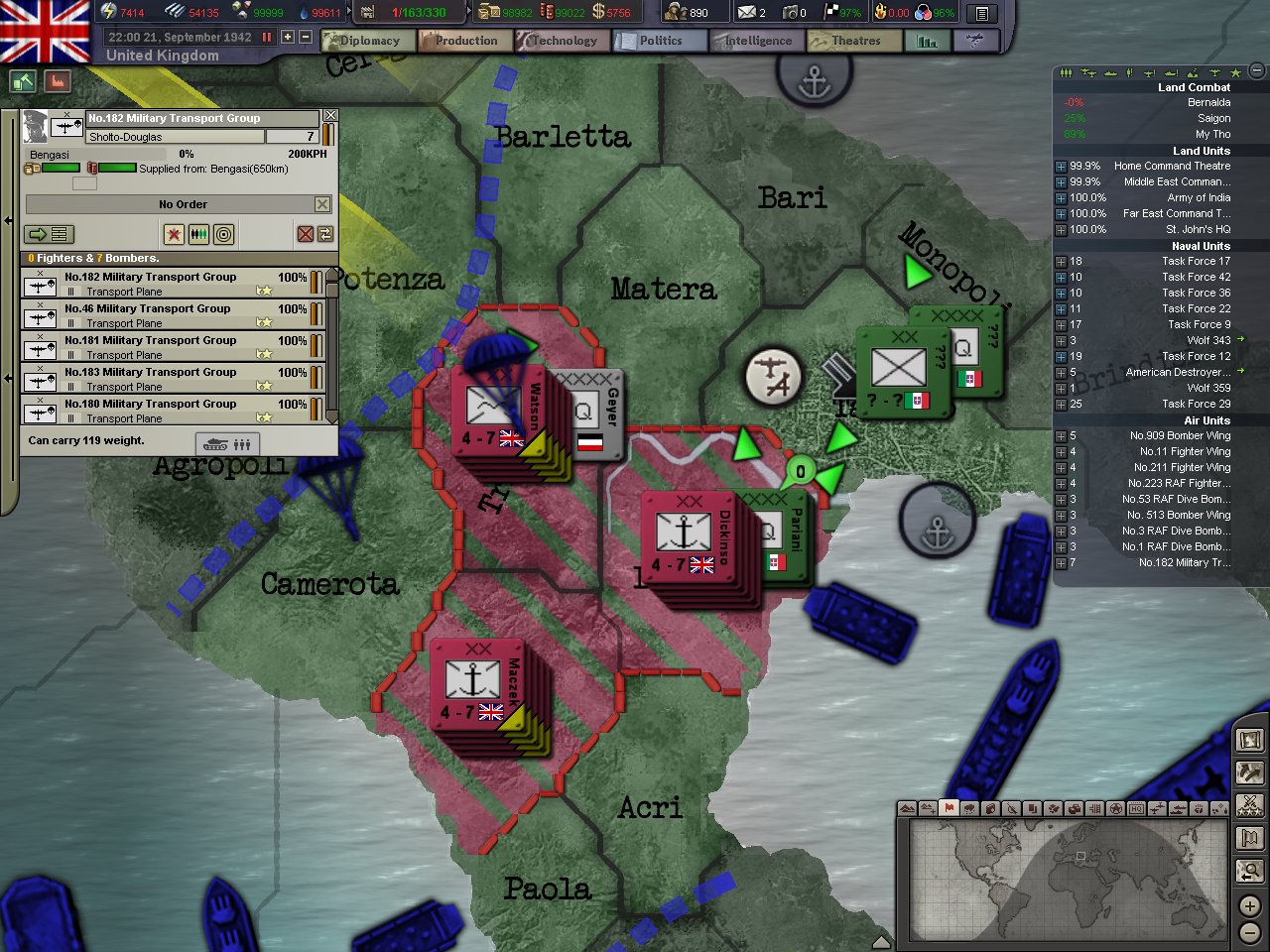
In the last few hours of the 21st of September, the invasion of Italy began. Army Group General Auchinleck gave the green light and the two Commando Corps and the Airborne Crop dropped into Italy. The objective of the airborne was to secure the blue line in the north. The first Commando Corp, landed on the western coast of the Italian boot, was the move and secure the line in the south. While the 2nd Corp moved to secure the port and city of Taranto, and the port in Bari, allowing supplies and reinforcements to be brought ashore.
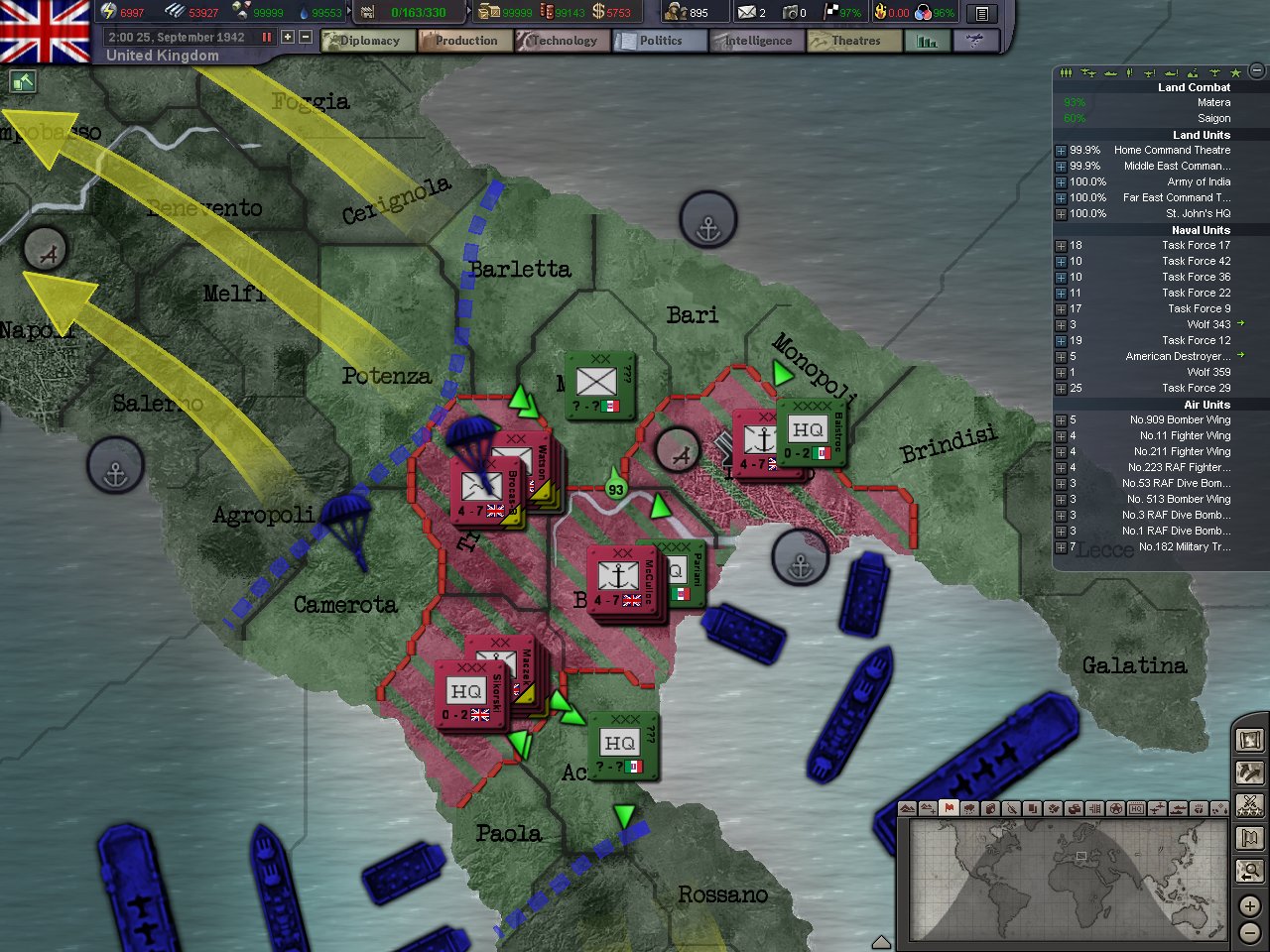
Alittle over three days after the initial landings our troops secured the port in Taranto. The Royal Navy immediately began off loading supplies, and bringing the wounded out of the fighting. Not that the fighting so far had been heavy, casualites had been light. Only a few hundred overall while the scattered and shocked Italians had suffered nearly two thousand dead.
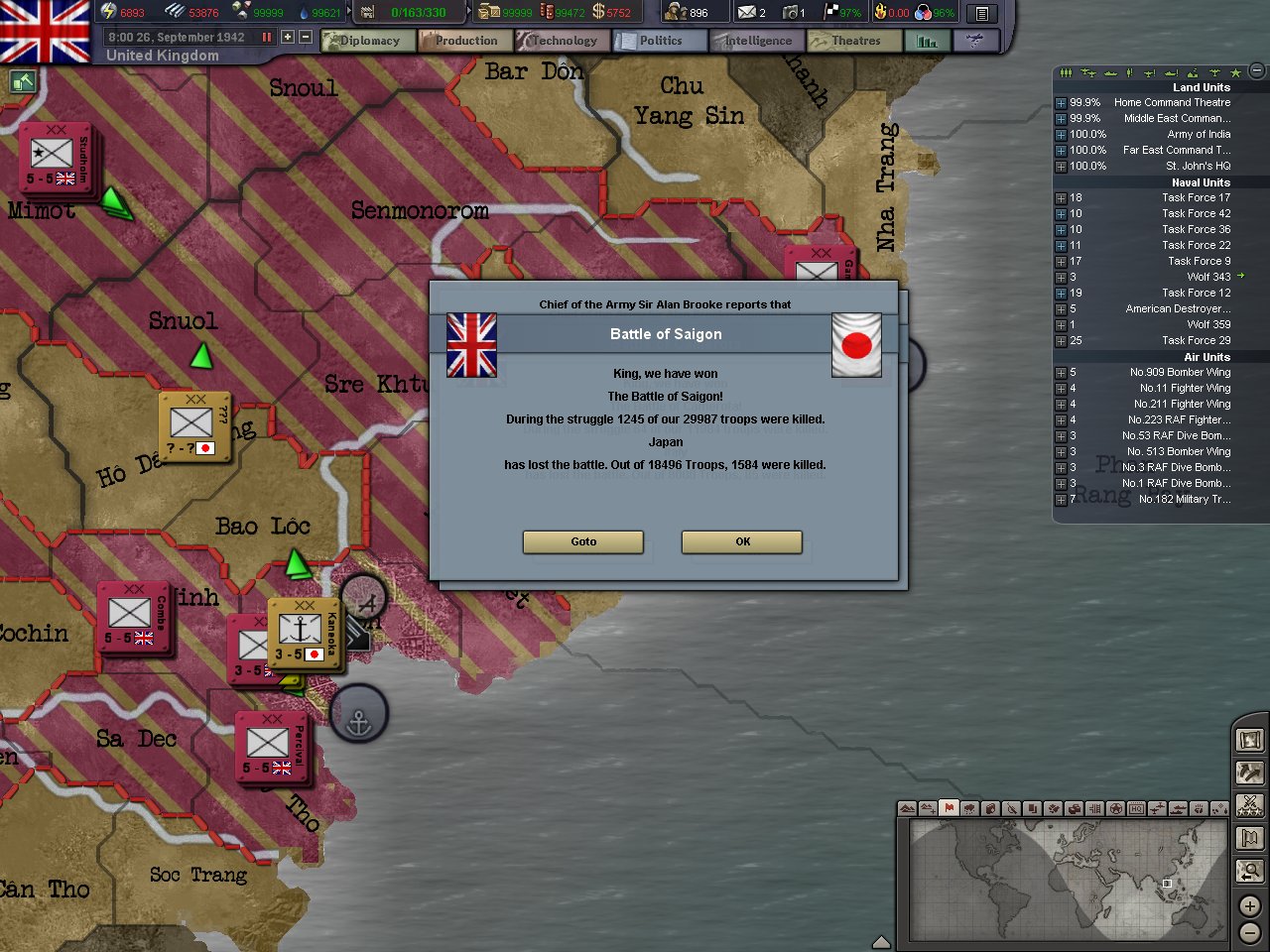
The day after Taranto fell, Saigon fell too.
Saigon had seen far heavy fighting. Our troops were twice beaten by the Japanese on the outskirts of town. But after a Japanese counterattack failed to capitalize on their victory our troops moved slowly into the suburbs and then house by house took the city from the Japanese. The cost was the heaviest seen since the defeats in Greece the year prior and reminded the army, and those at home that the war would still cost many more young men and boys.
Saigon had seen far heavy fighting. Our troops were twice beaten by the Japanese on the outskirts of town. But after a Japanese counterattack failed to capitalize on their victory our troops moved slowly into the suburbs and then house by house took the city from the Japanese. The cost was the heaviest seen since the defeats in Greece the year prior and reminded the army, and those at home that the war would still cost many more young men and boys.
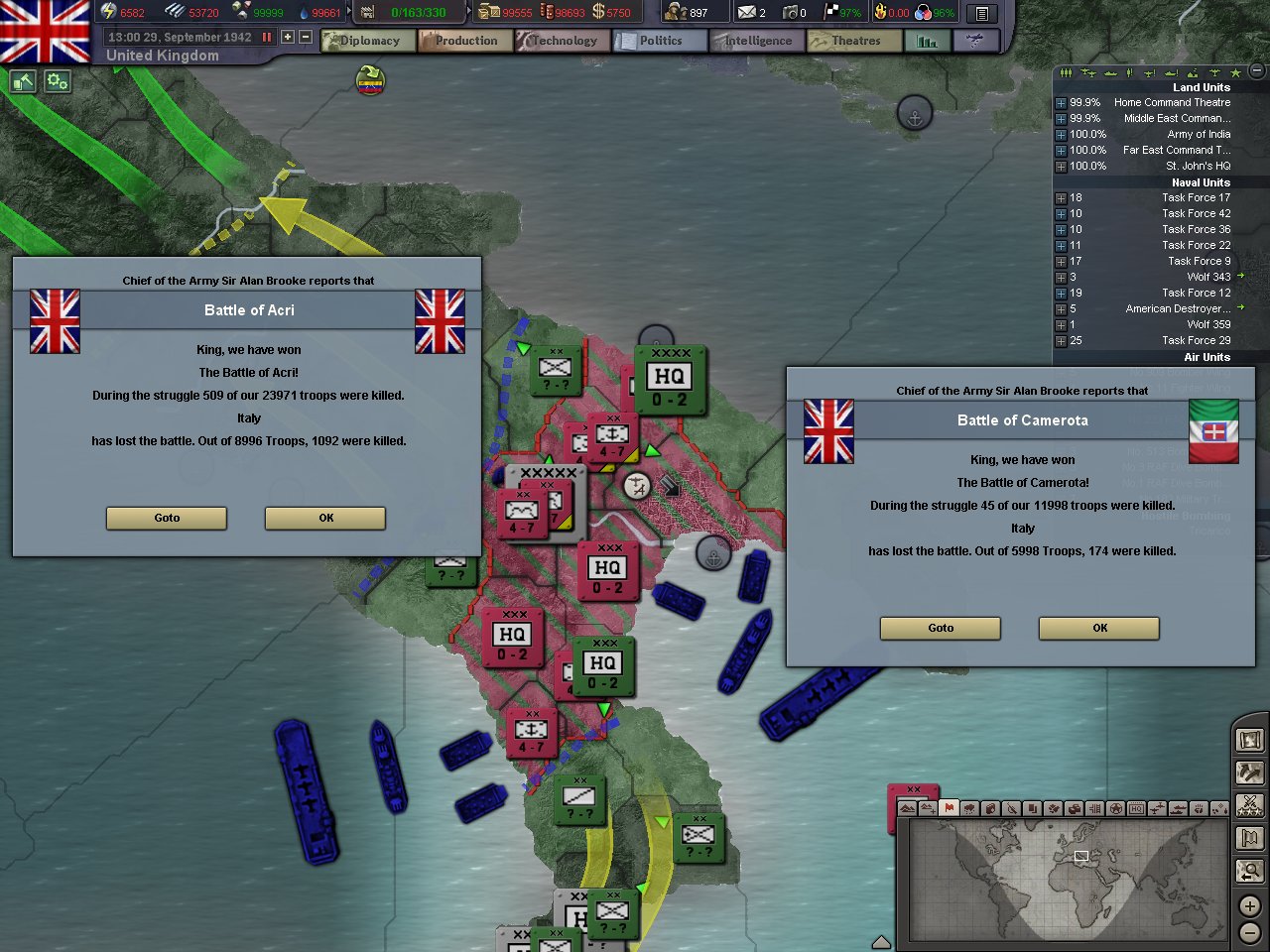
With the southern line secure, roughly 50,000 German, Italians, and Bulgarians were trapped in the toe of Italy. Our navy made sure they couldn't be evacuated by sea, and our airforce kept up constant bomber raids to make sure they were always watching the skies. The advance south would have to be halted for 10 days while the northern line was secured and more troops were brought ashore. The delay was unexpected and unwanted but hopefully wouldn't cause any harm in the advance north or south.
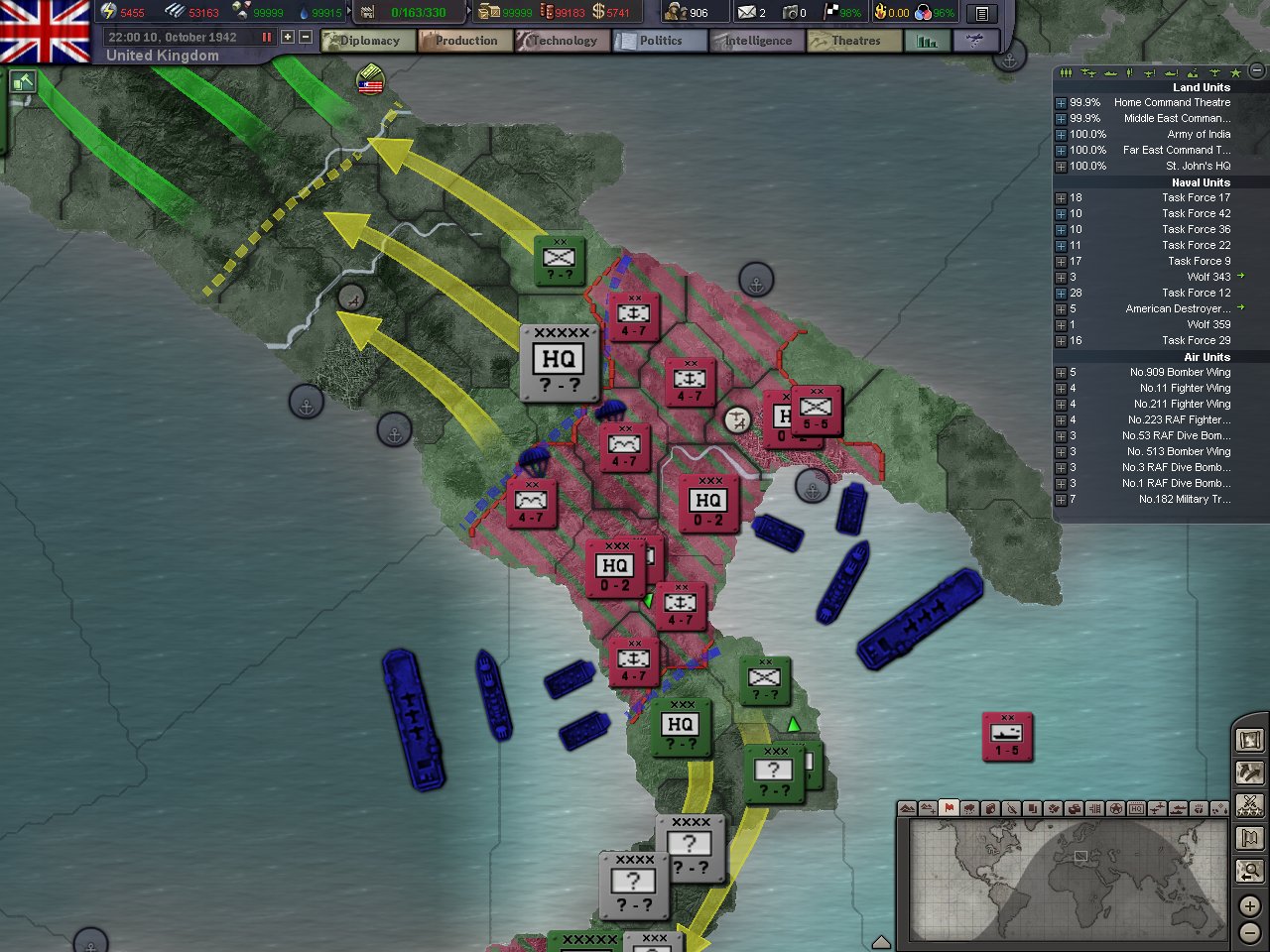
With both lines secured. The order was given for the northern front to advance. The Axis forces hadn't had time to move troops south to meet our invasion so for the first week or so it was a mere matter of marching. The scattered German or Italian units were quickly isolated and destroyed.
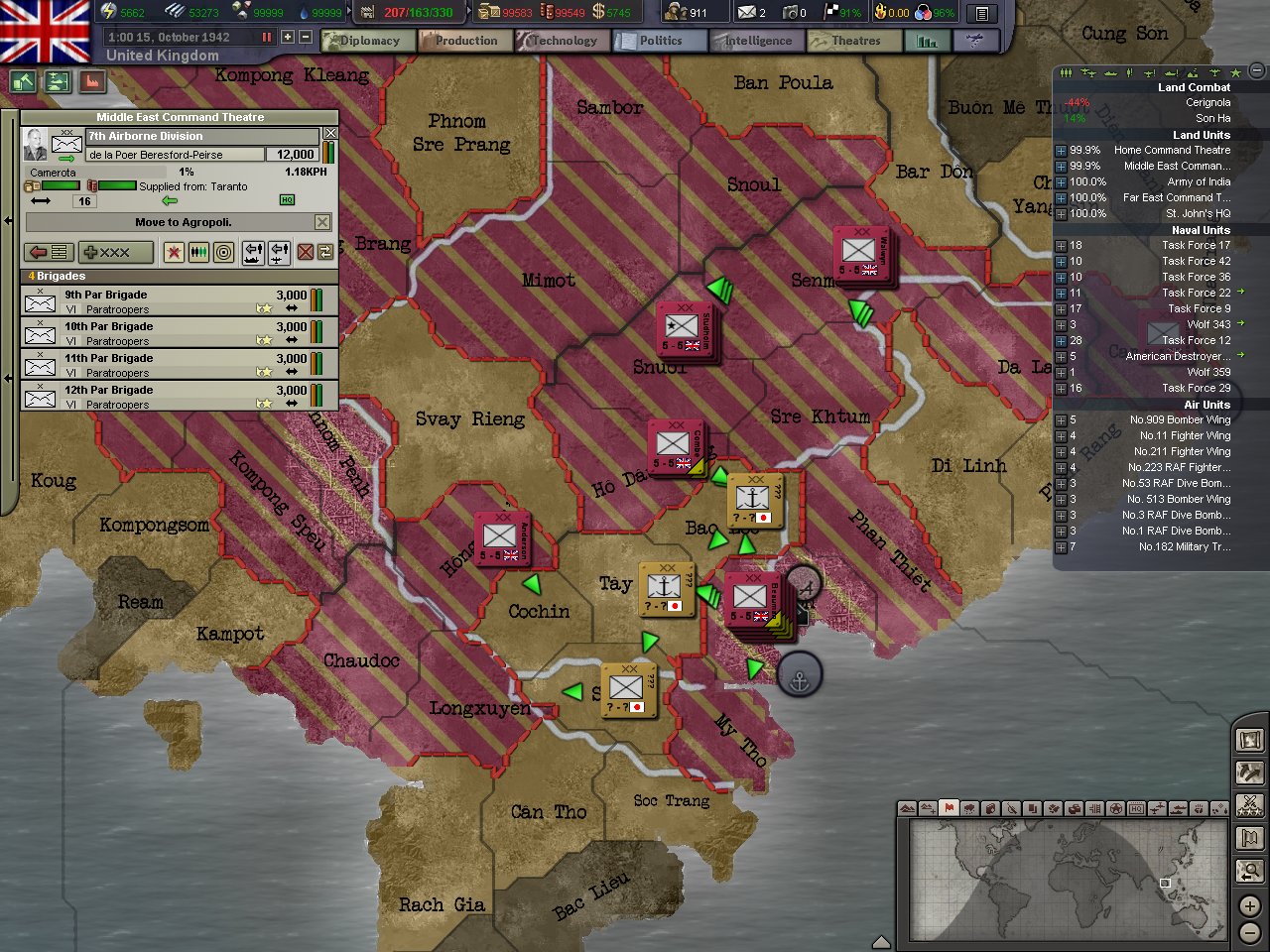
On the 15th of October the Far East Army was woken up by quite the surprise. Three Japanese divisions had been landed behind our lines at Saigon.
Divisions were quickly moved from inside Saigon and the surrounding area to meet this new threat on our flank. We couldn't let this threat take away momentum from our advance towards Hanoi.
Divisions were quickly moved from inside Saigon and the surrounding area to meet this new threat on our flank. We couldn't let this threat take away momentum from our advance towards Hanoi.
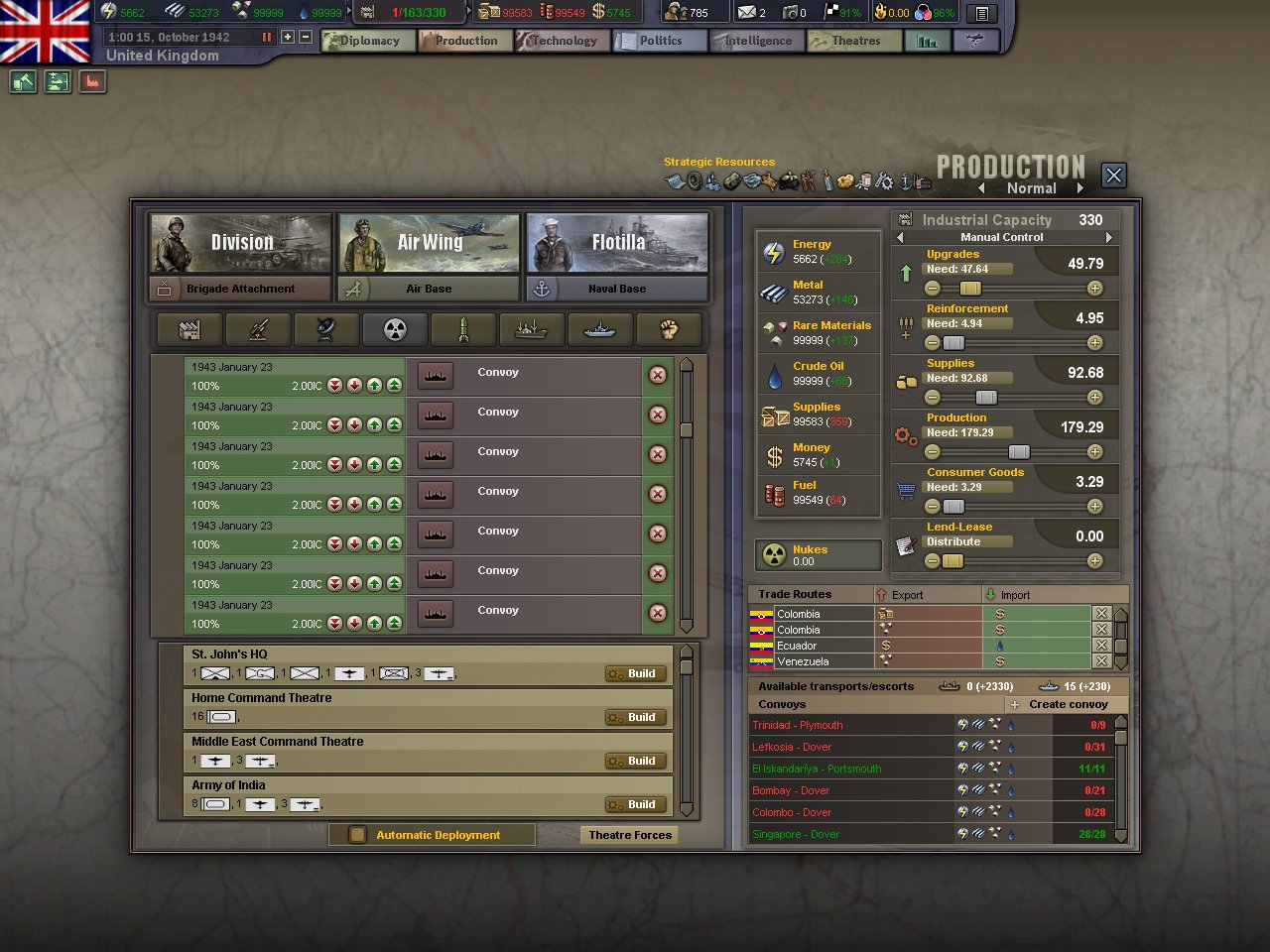
As the war had gone on and on, our convoys had suffered and it began to show. Convoys carrying supplies to far flung outposts of the empire were having ships stripped away as more important convoys took priority. Convoys to Italy, Hong Kong, and the Far East were given priority over places like-Bermuda, Ethiopia, and Palestine.
Our transports were getting picked apart by Axis submarines so a major industrial effort was started to add more ships to our dwindling convoys and get supplies across our great Empire.
Our transports were getting picked apart by Axis submarines so a major industrial effort was started to add more ships to our dwindling convoys and get supplies across our great Empire.
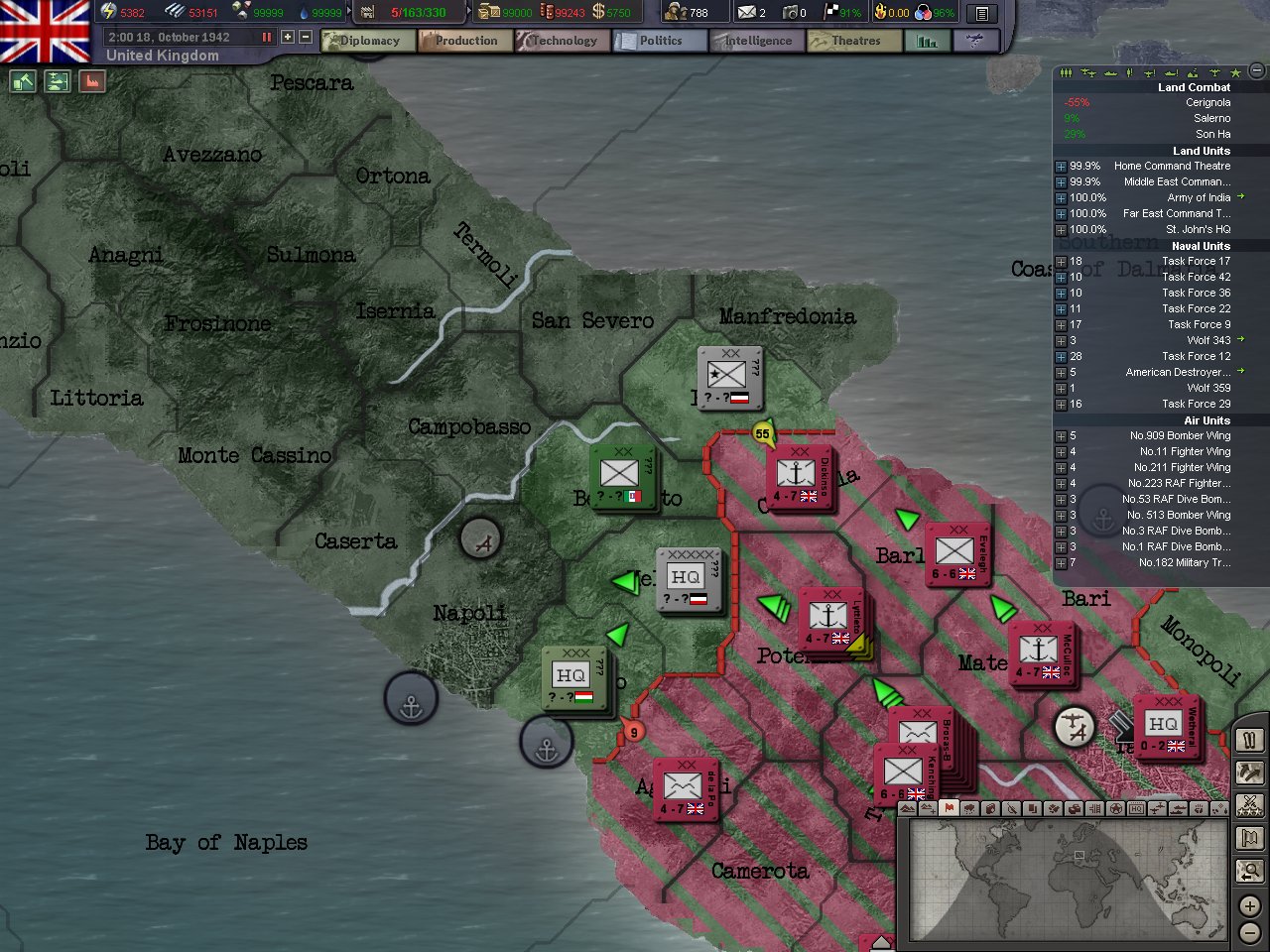
Back in Italy, the advance was going slower than anticipated. A Waffen SS division was holding up the advance on the east coast. While dug in Bulgarians and Germans were holding us in the center. We had the advantage in numbers but our troops and their commanders, were quickly learning that the defenders would have the advantage in any battle in these mountains.
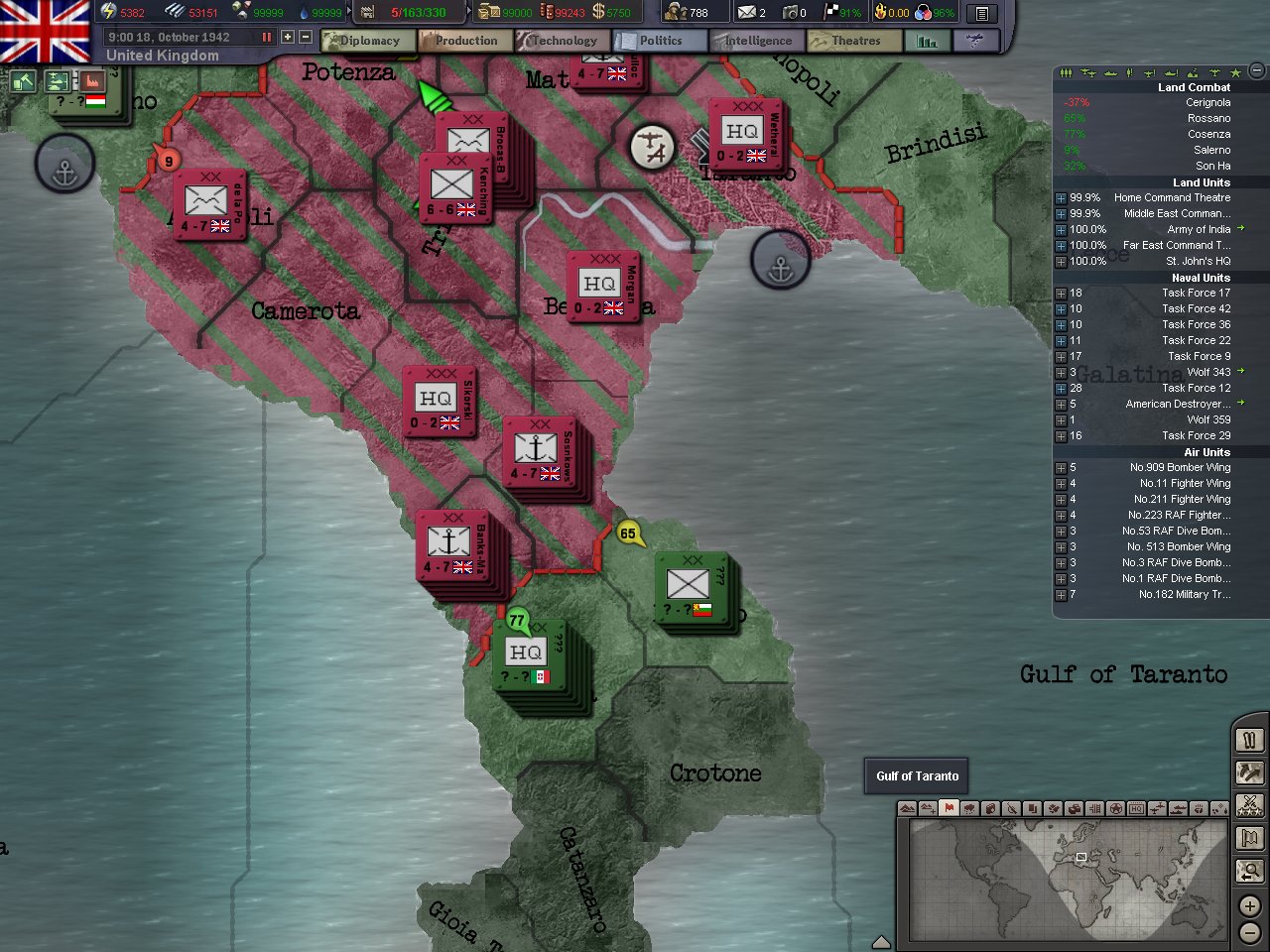
In the toe of the boot, the advance was going more to plan.
The Bulgarians and Italian divisions were caught unprepared for the invasion and were ready for an assault from across the Straits of Messinia, not from the north in Italy. It was only a matter of time and how much blood we would have to spill till we destroyed or captured the enemy divisions in the toe.
The Bulgarians and Italian divisions were caught unprepared for the invasion and were ready for an assault from across the Straits of Messinia, not from the north in Italy. It was only a matter of time and how much blood we would have to spill till we destroyed or captured the enemy divisions in the toe.
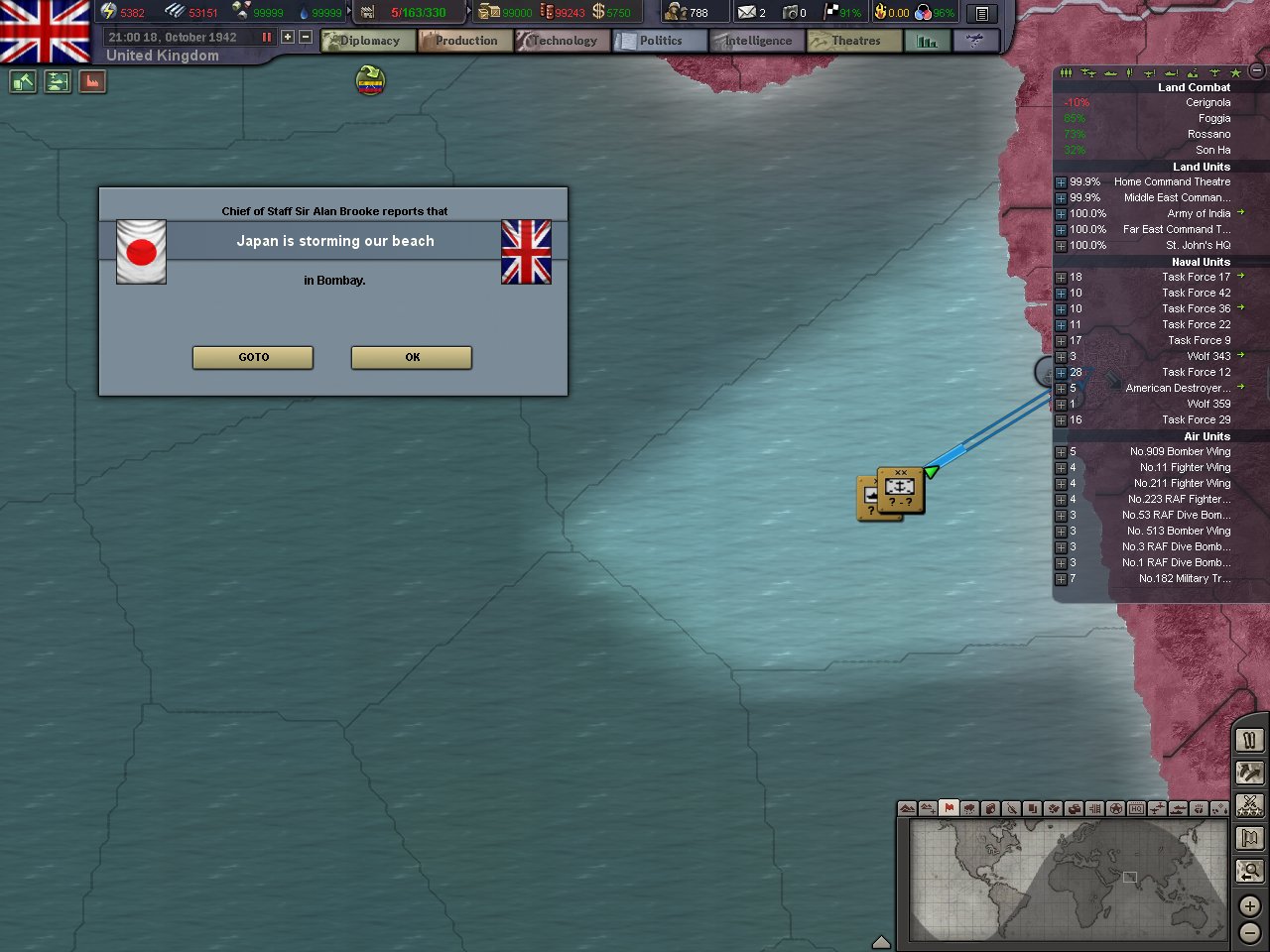
And then the Japanese did something very unexpected. They landed a corp in Bombay, on the west coast of India. The move caught the entire British High Command off guard and sent us into a scramble. If the Japanese managed to land several corps and march their way through India taking vital ports and cities. It could spell disaster for our entire theater in the far east.
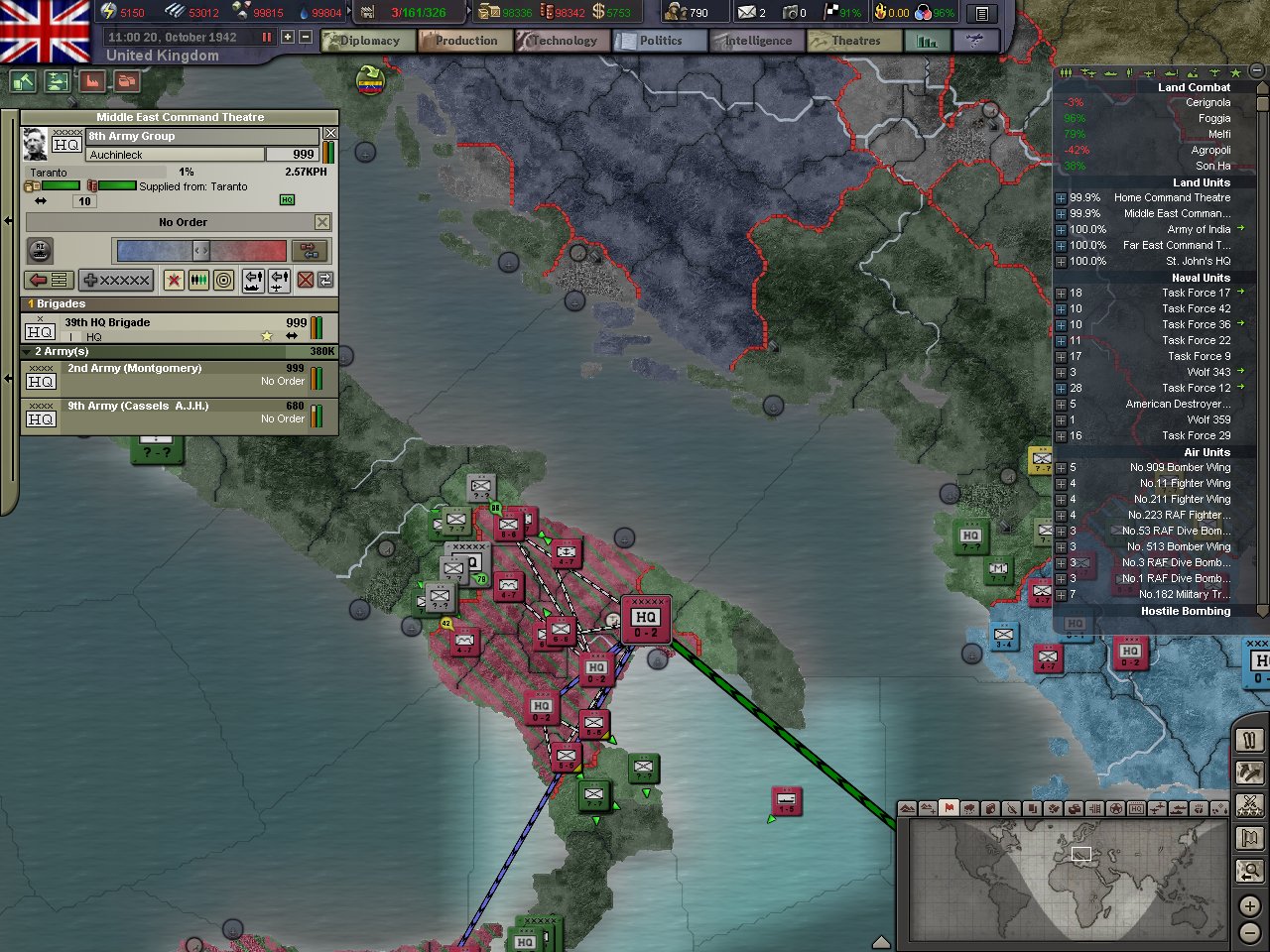
By the 20th of October, a full month after the first landings most of the invasion army was ashore including Auchinleck with the GHQ for the Mediterranean.
With fresh divisions on hand in Italy it was hoped that a speedy advance would soon commence up with the boot and onto Rome!
With fresh divisions on hand in Italy it was hoped that a speedy advance would soon commence up with the boot and onto Rome!
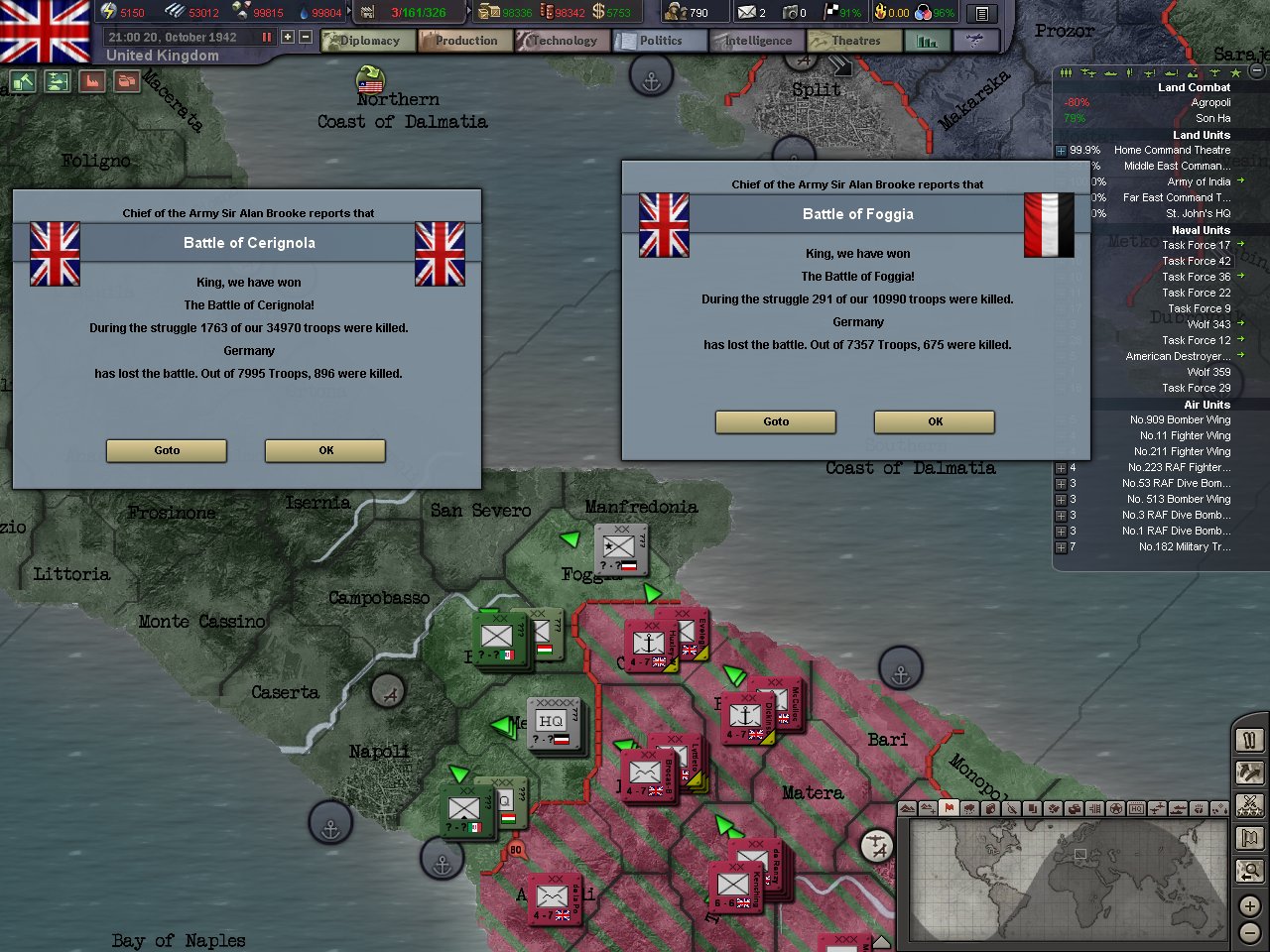
The same day that Auchinleck landed with his HQ in Taranto, forces in the north of Italy won to victories forcing the Axis forces back.
The Battle of Cerignola had huge casualties for our forces, while Foggla had minor causalities in comparison to the rest of the campaign.
The Battle of Cerignola had huge casualties for our forces, while Foggla had minor causalities in comparison to the rest of the campaign.
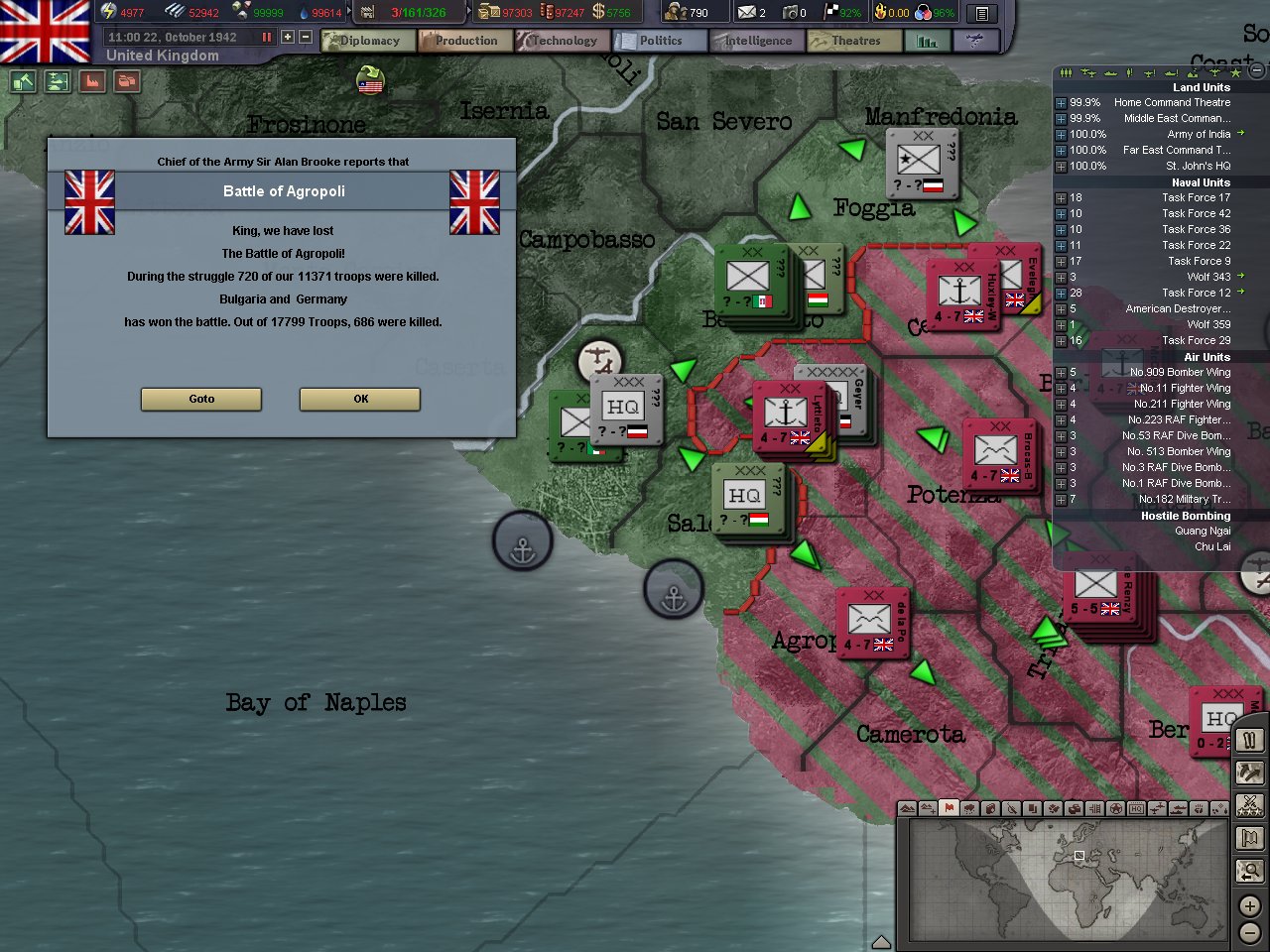
On the coast, an isolated airborne division was pushed back with heavy casualties. Orders immediately went out to send reinforcements to the coast to fill this hole and prevent a breakthrough.
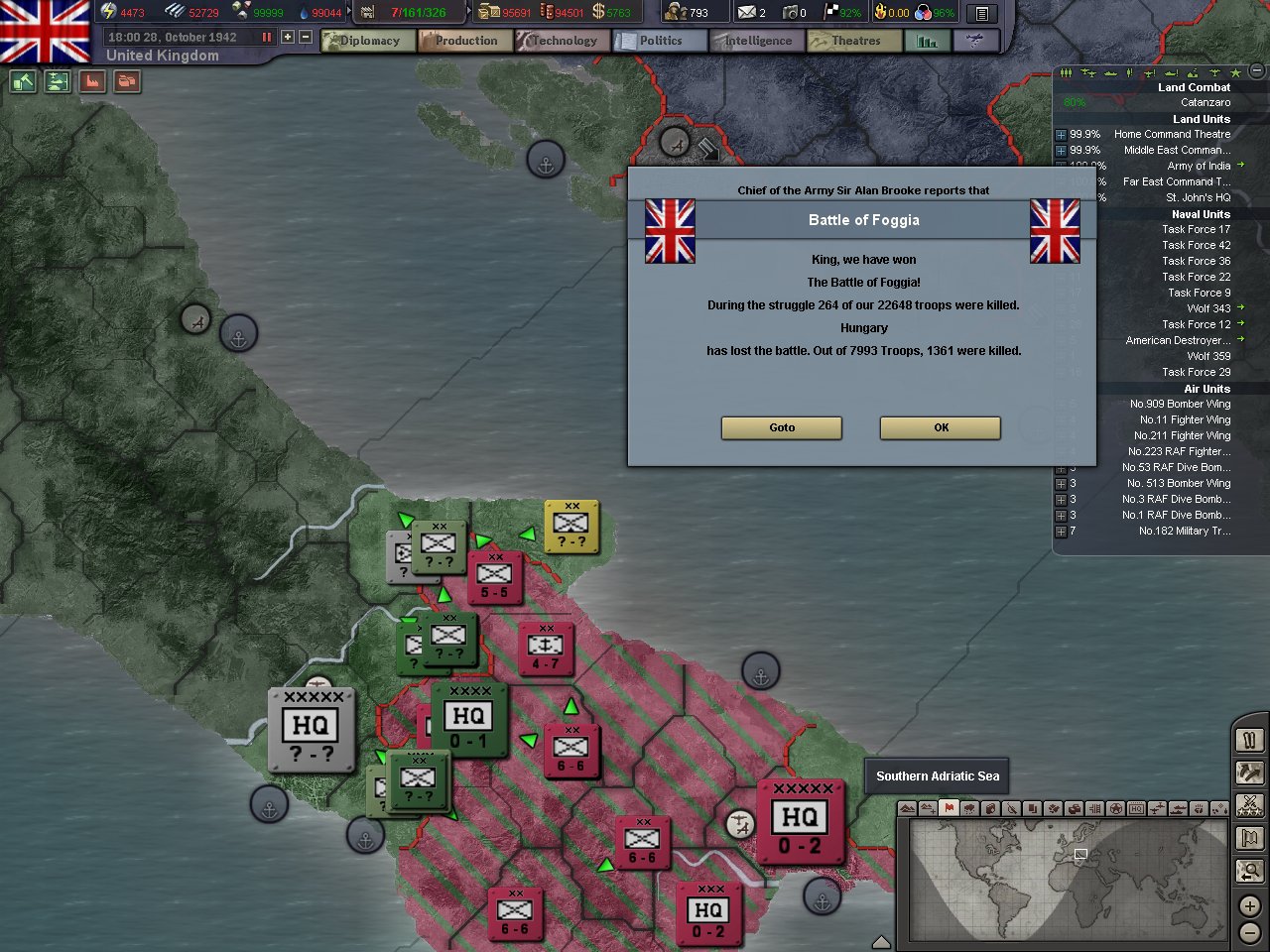
A Italian and Bulgarian counterattack was sent running back with heavy casualties inflicted.
In the south of the toe, the encirclement continued to be squeezed tighten as Italian forces were pushed closer and closer to the toe of the boot.
In the south of the toe, the encirclement continued to be squeezed tighten as Italian forces were pushed closer and closer to the toe of the boot.
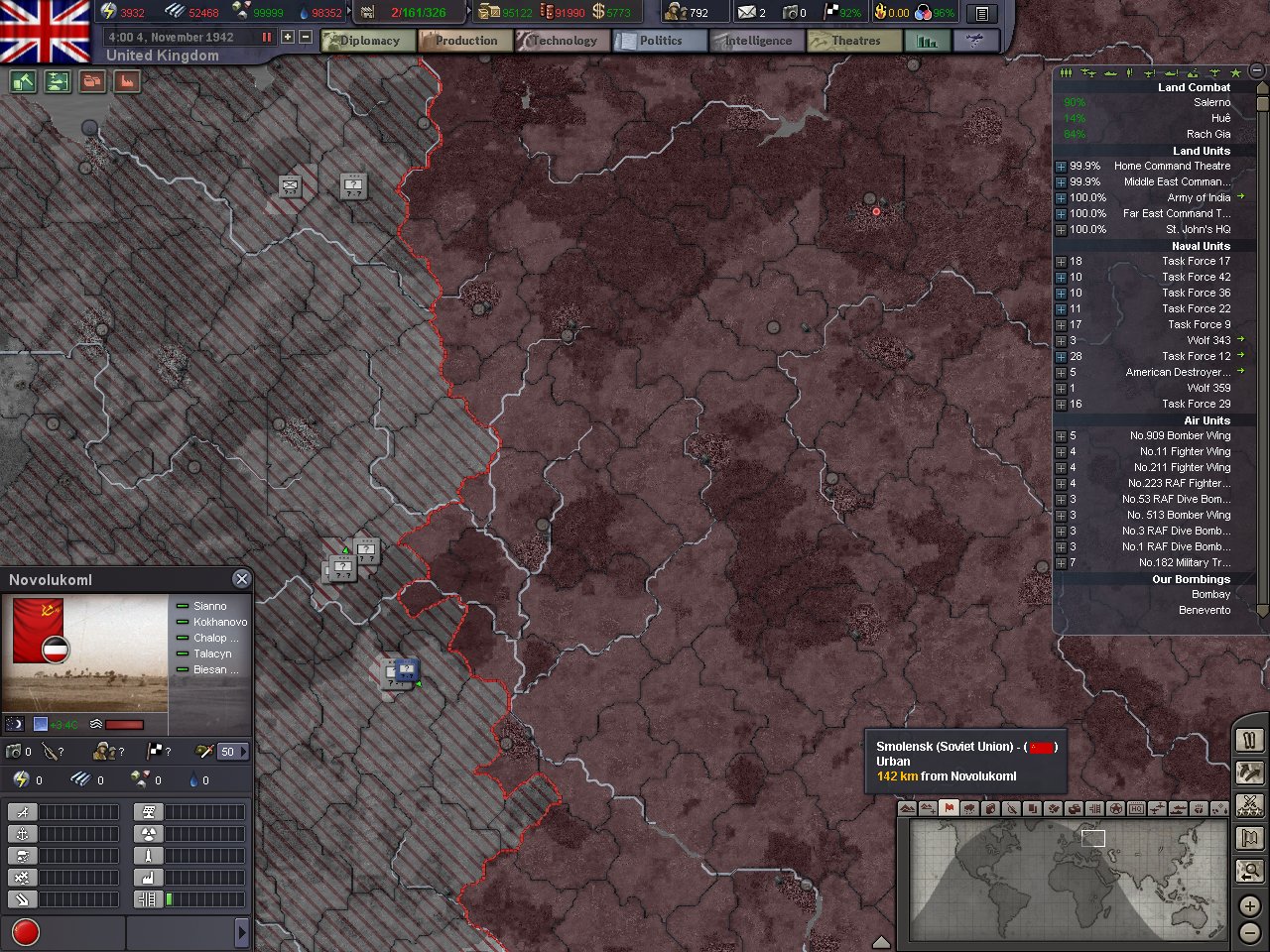
On the Russian Front. The Nazi forces are on the edge of Smolensk. Once that city falls, the road to Moscow is wide open for Nazi panzer divisions to roll onto.
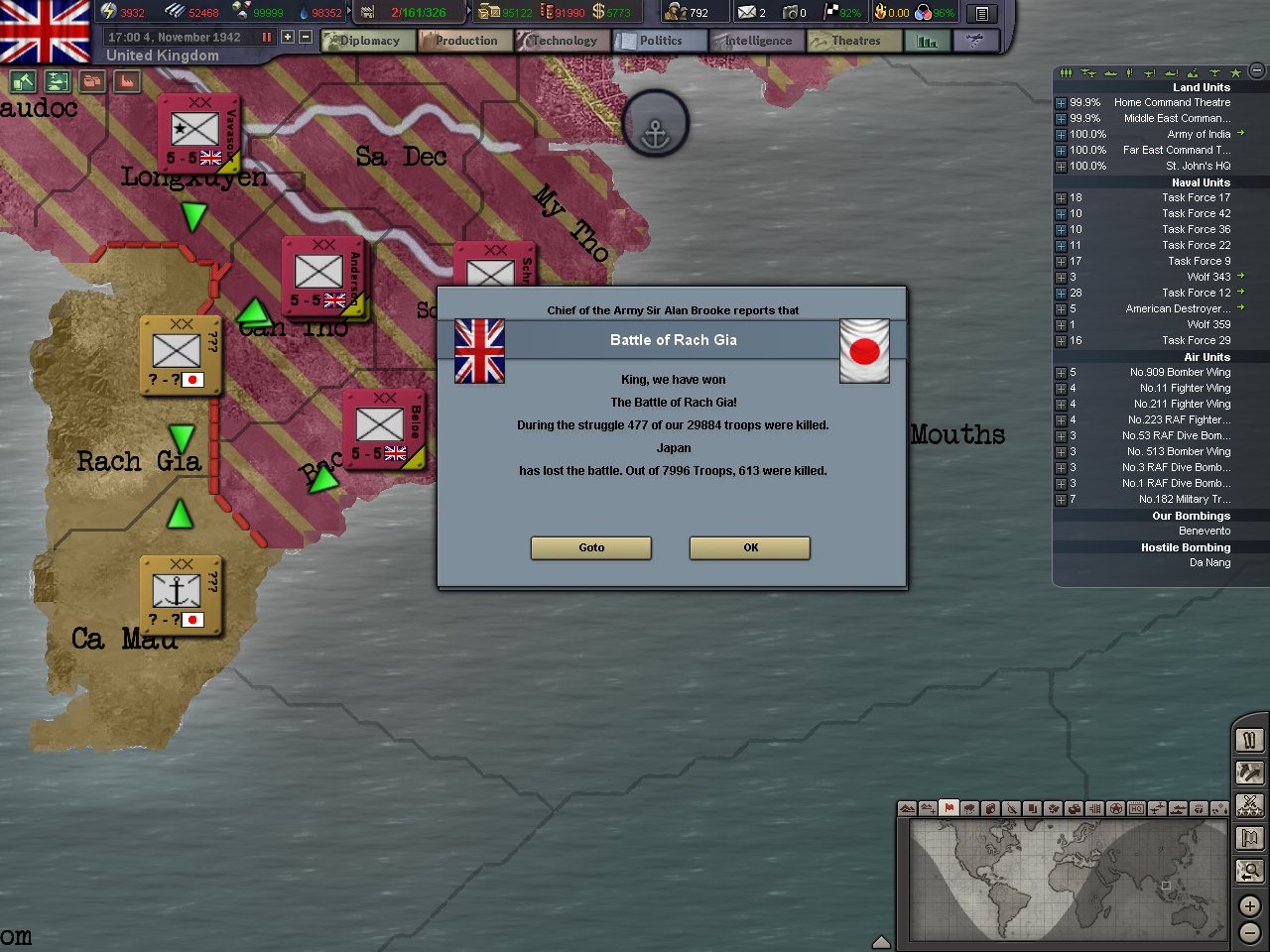
In Indochina, two hard fought battles finish.
Near Saigon, the Japanese flank landing is pushed onto the coast after a week long battle costing just over 400 men. The ambitious Japanese landing that aimed to take Saigon and retake the initiative in the Far East would fail. And later on November the 7th the final enemy resistance would be crushed and 8,000 of the 30,000 Japanese landing force would march into captivity.
Near Saigon, the Japanese flank landing is pushed onto the coast after a week long battle costing just over 400 men. The ambitious Japanese landing that aimed to take Saigon and retake the initiative in the Far East would fail. And later on November the 7th the final enemy resistance would be crushed and 8,000 of the 30,000 Japanese landing force would march into captivity.
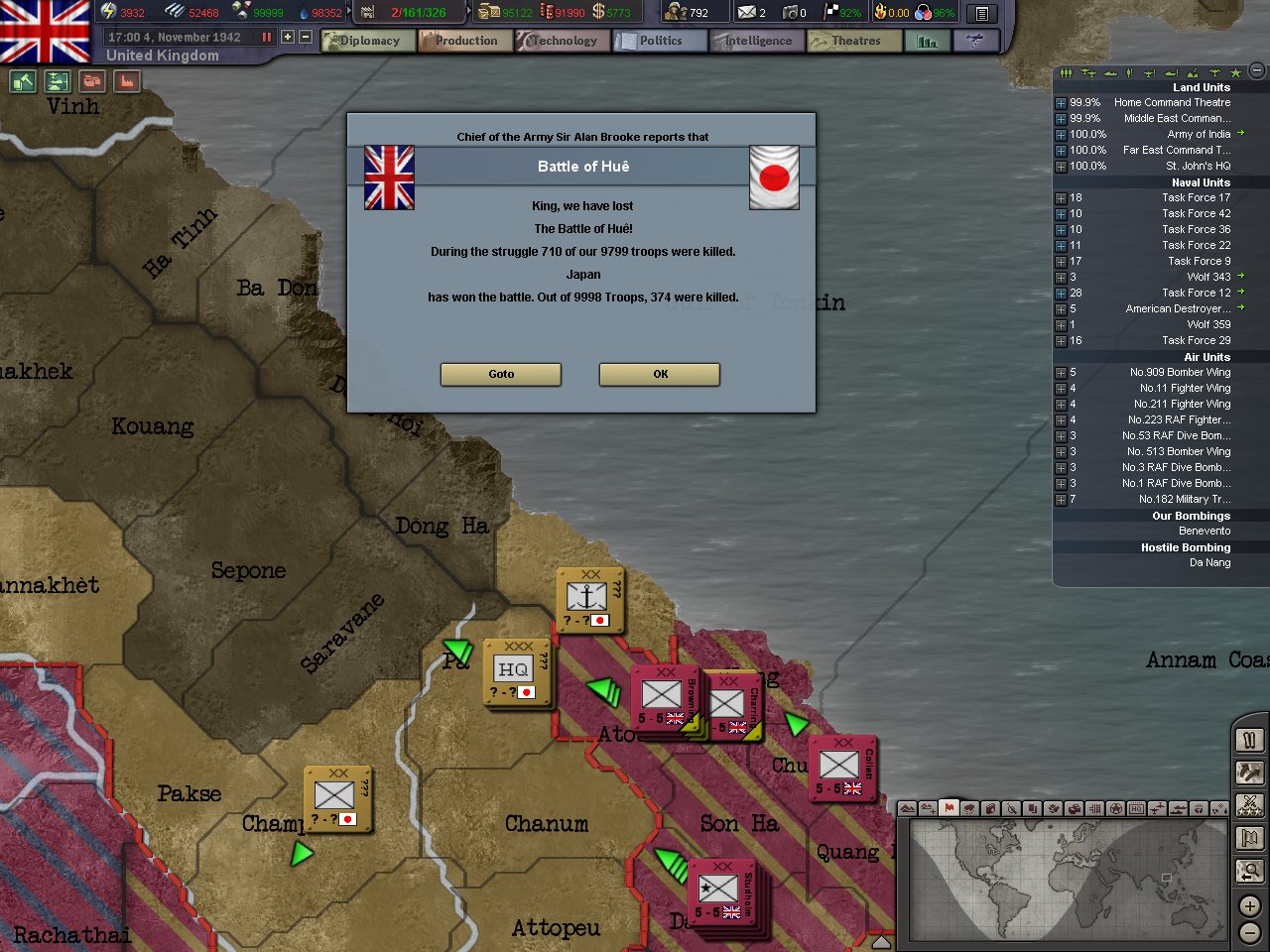
Our advance north would be halted at the city of Hue where the Japanese would make a brief stand blooding our nose.
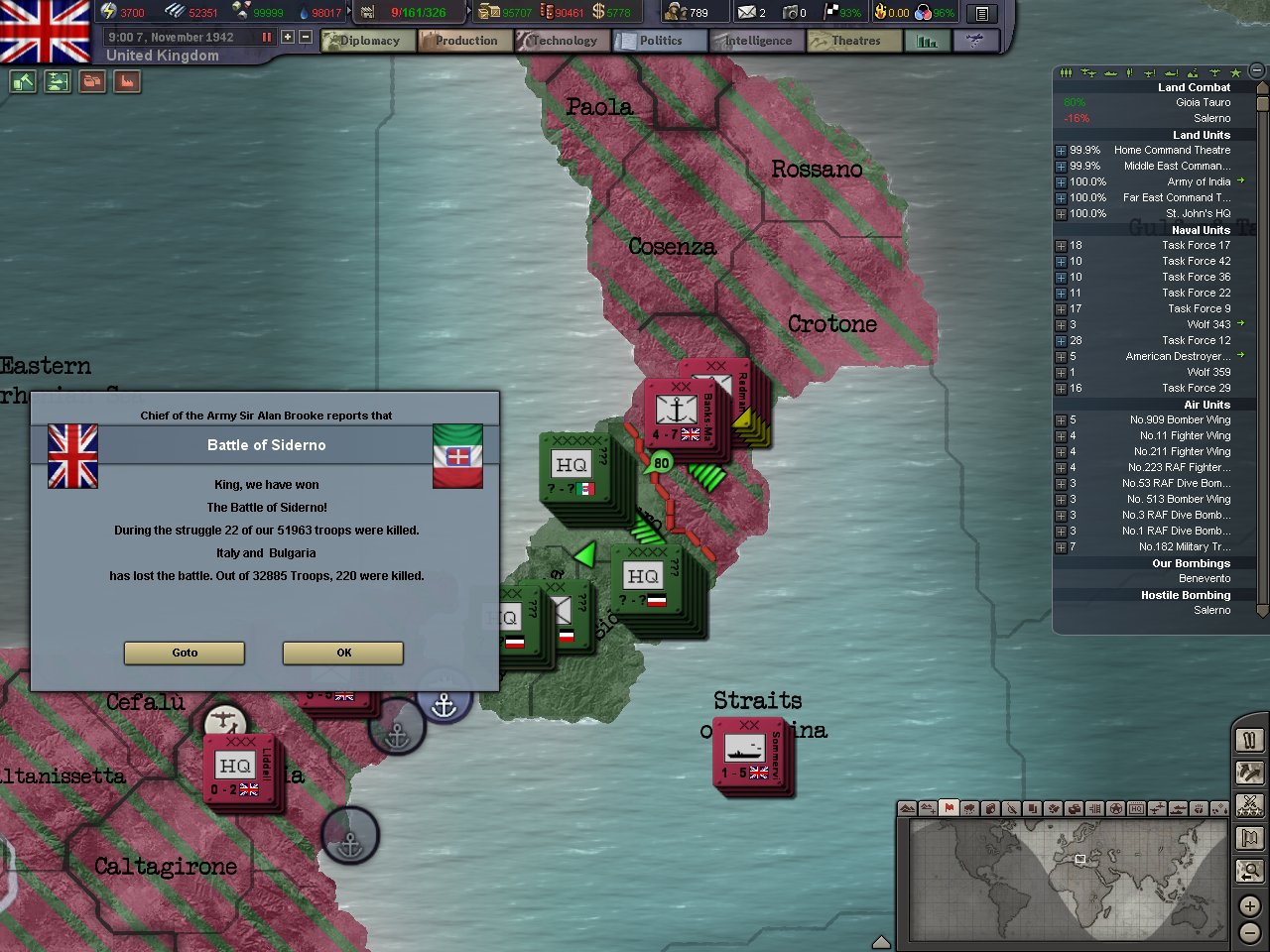
In Italy our advance down the toe of the boot would grind on, slowly pushing the over 100,000 pocket tighter against the coast with no escape.
To the north, the Germans tried to halt our advance with a counterattack near Salerno. But the German division would be repulsed by the men of the 1st Airborne Division.
To the north, the Germans tried to halt our advance with a counterattack near Salerno. But the German division would be repulsed by the men of the 1st Airborne Division.
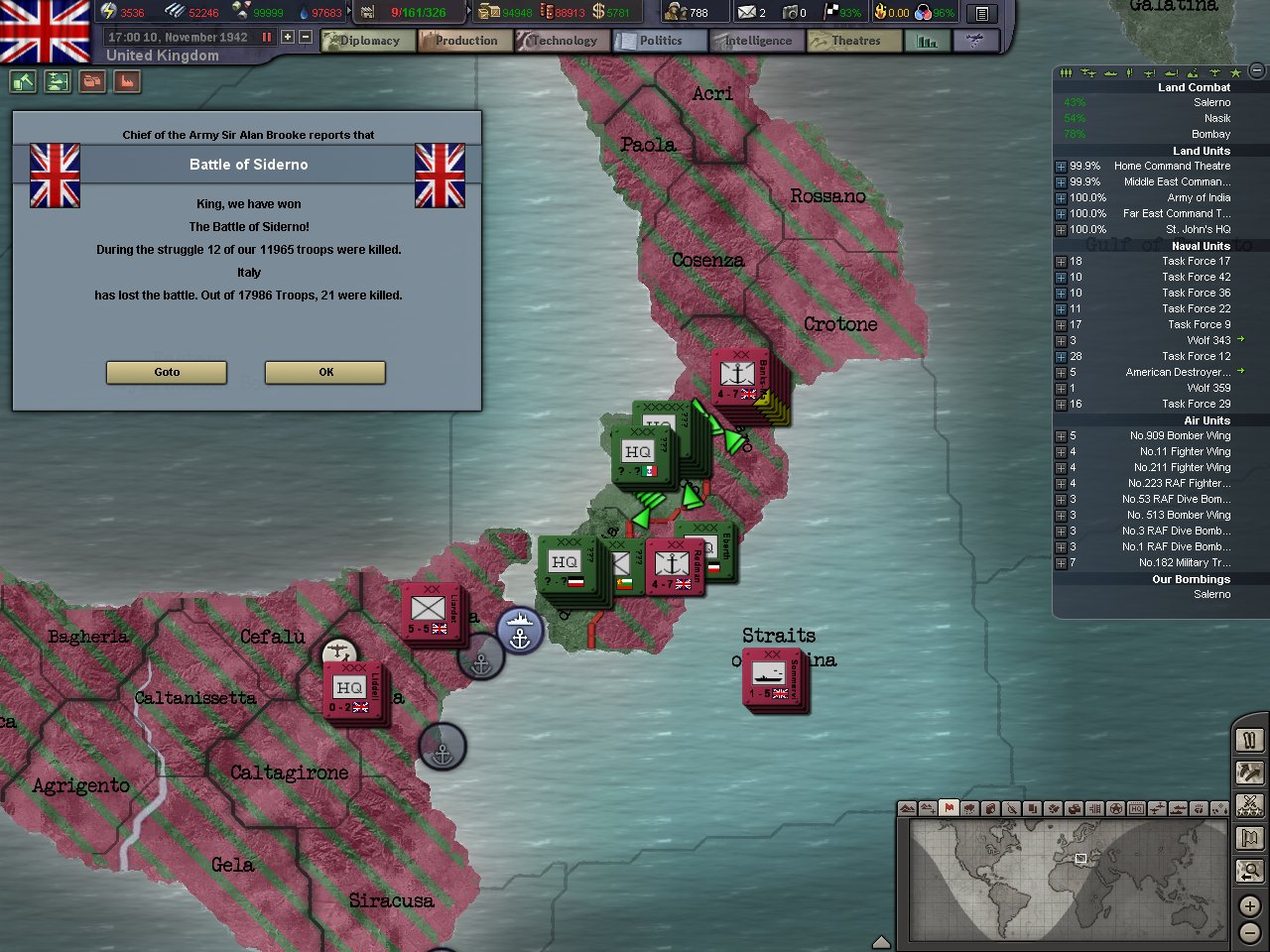
Down in the toe of Italy things continue going bad for the over 100,000 Axis troops trapped. With Royal Navy ships lending close support, with air cover and artillery our Royal Marines and infantry make quick progress getting around Axis positions and squeezing the foothold tighter.
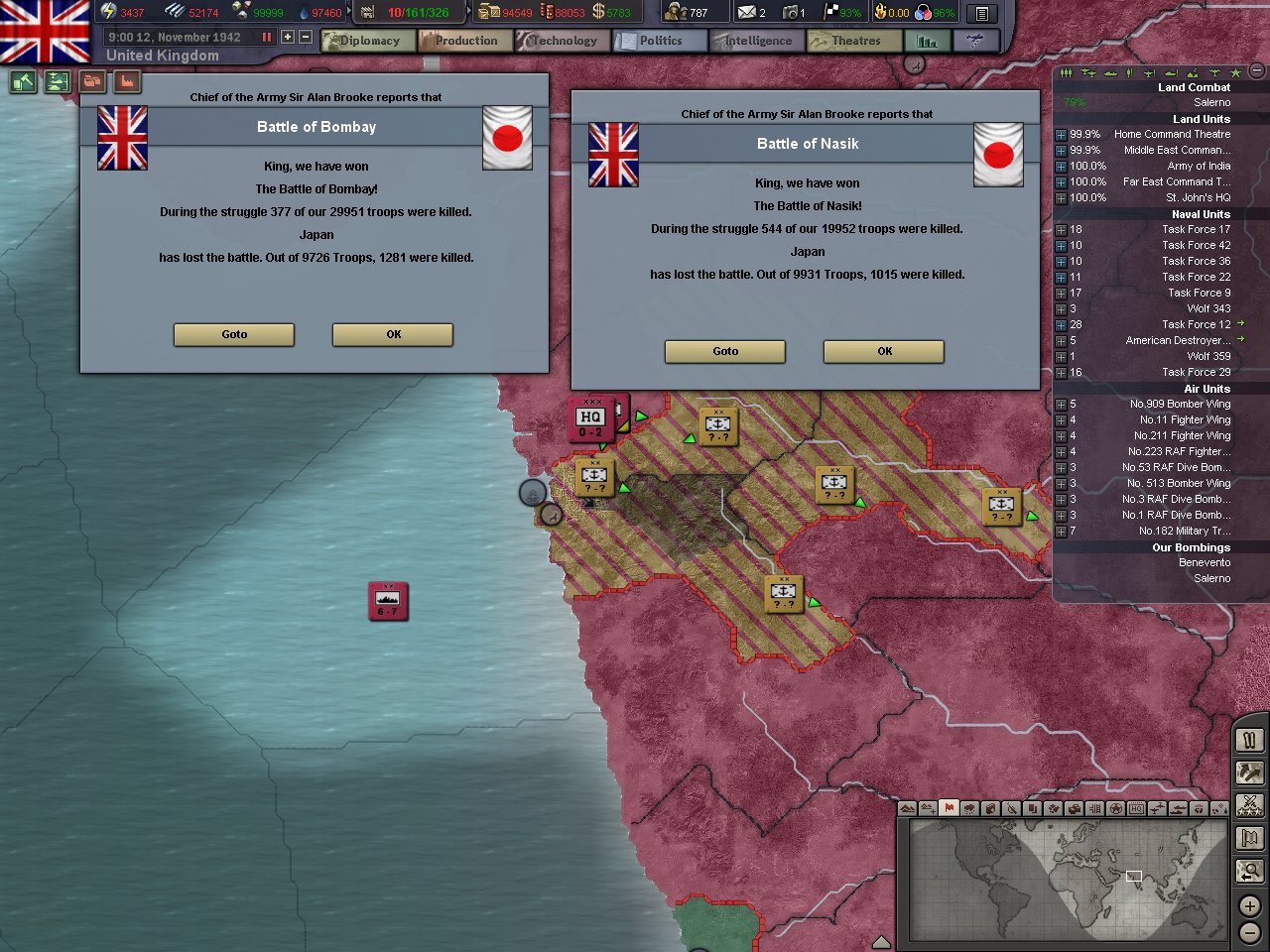
While our invasion of Italy goes somewhat to plan, the Japanese invasion of India is counterattacked.
The ambitious Japanese invasion of Bombay would be met with an infantry corp that was hastily moved from the Home Islands. The bloody Battle of Bombay would see the Indian population rise up against the Japanese occupiers and join the British infantry in the battle.
Japanese soldiers would be butchered in alleyways and houses by citizens as the Japanese attempted to move through the streets to combat the British regulars. With the port of Bombay being liberated from Japanese hands, the Japanese invasion losing the valuable port they would no longer receive supplies and reinforcements; spelling doom for the remaining Japanese forces.
The ambitious Japanese invasion of Bombay would be met with an infantry corp that was hastily moved from the Home Islands. The bloody Battle of Bombay would see the Indian population rise up against the Japanese occupiers and join the British infantry in the battle.
Japanese soldiers would be butchered in alleyways and houses by citizens as the Japanese attempted to move through the streets to combat the British regulars. With the port of Bombay being liberated from Japanese hands, the Japanese invasion losing the valuable port they would no longer receive supplies and reinforcements; spelling doom for the remaining Japanese forces.
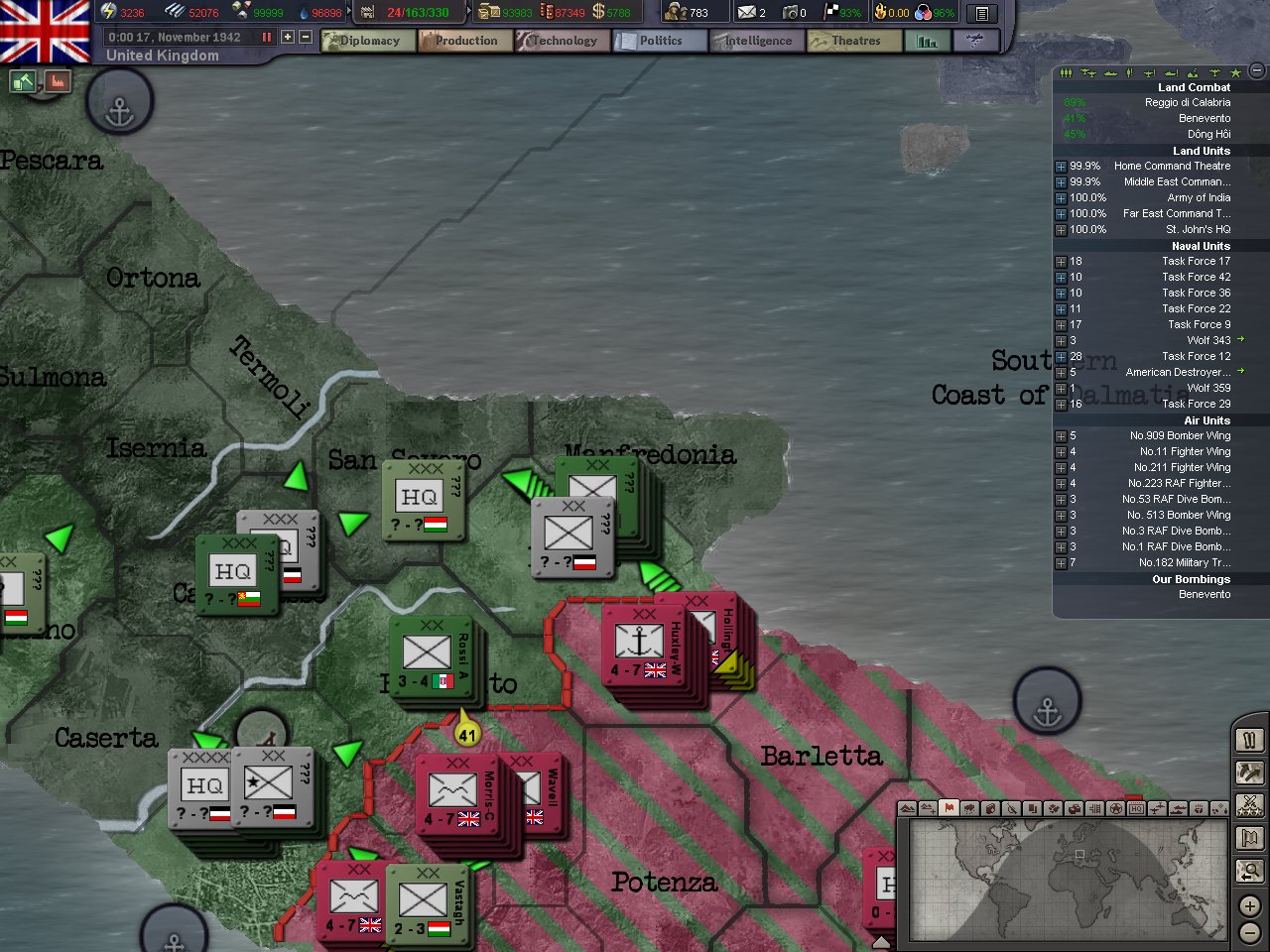
Back in Italy, an advance down the western coast of the peninsula led by Marines and tanks drove the Axis forces from their positions.
In the following days of this advance it is hoped that our troops can secure the city of Naples and bridge heads beyond the city. So that once our forces are done mopping up the Axis forces trapped in the south of the peninsula move back North, a general offensive can be launched along the whole of the front.
In the following days of this advance it is hoped that our troops can secure the city of Naples and bridge heads beyond the city. So that once our forces are done mopping up the Axis forces trapped in the south of the peninsula move back North, a general offensive can be launched along the whole of the front.
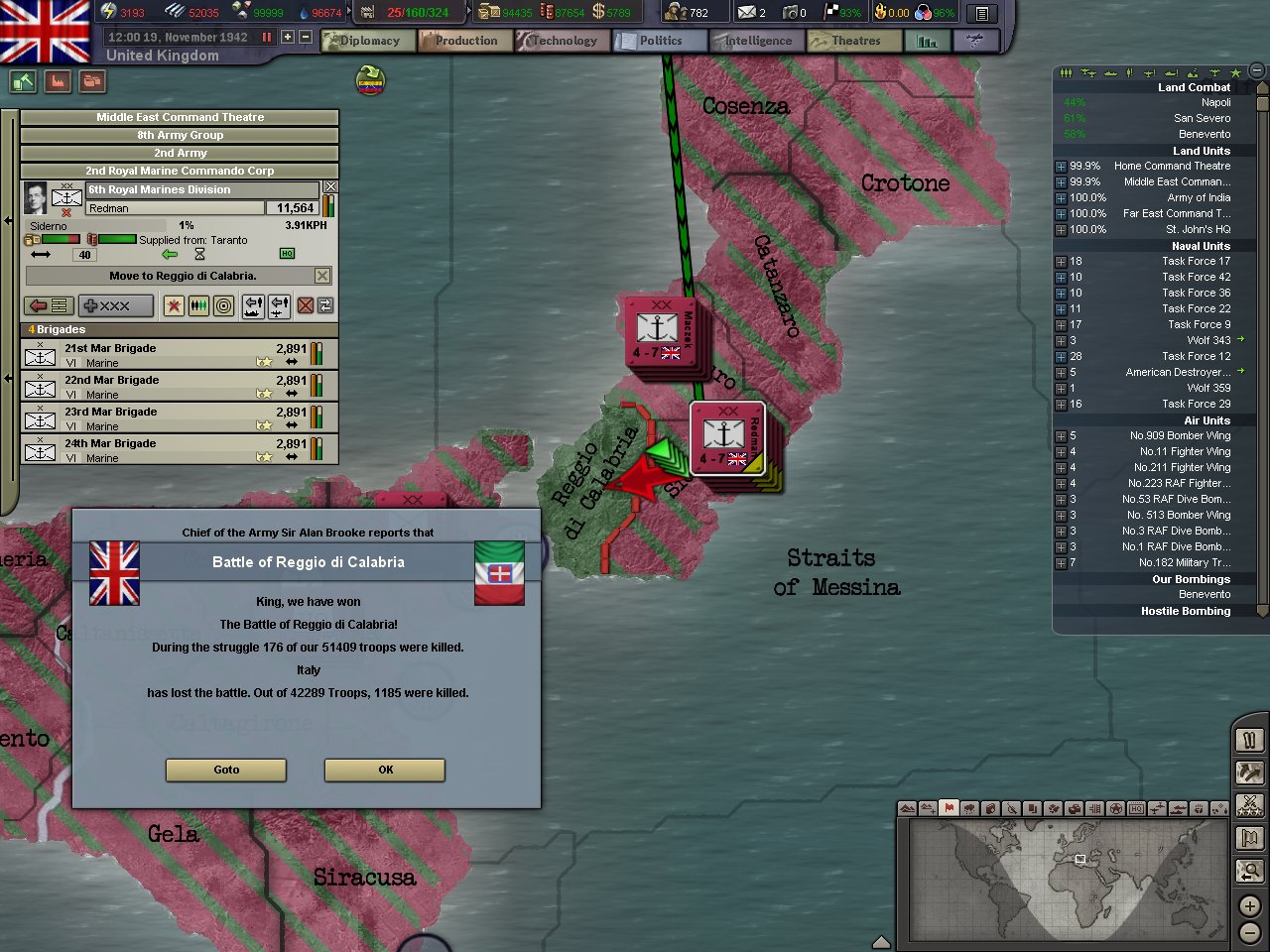
And only three days after our troops begin advancing around Naples, and only 59 days since our brave boys landed in Italy. Over 150,000 Axis troops, and all of their heavy equipment including tanks, trucks, artillery and supplies, are captured. With the enemy in the south destroyed or now sailing on transport ships to POW camps in Egypt. The two corps that marched south as well as the corp in Sicily can now be sent north to help speed the advance on to Rome!
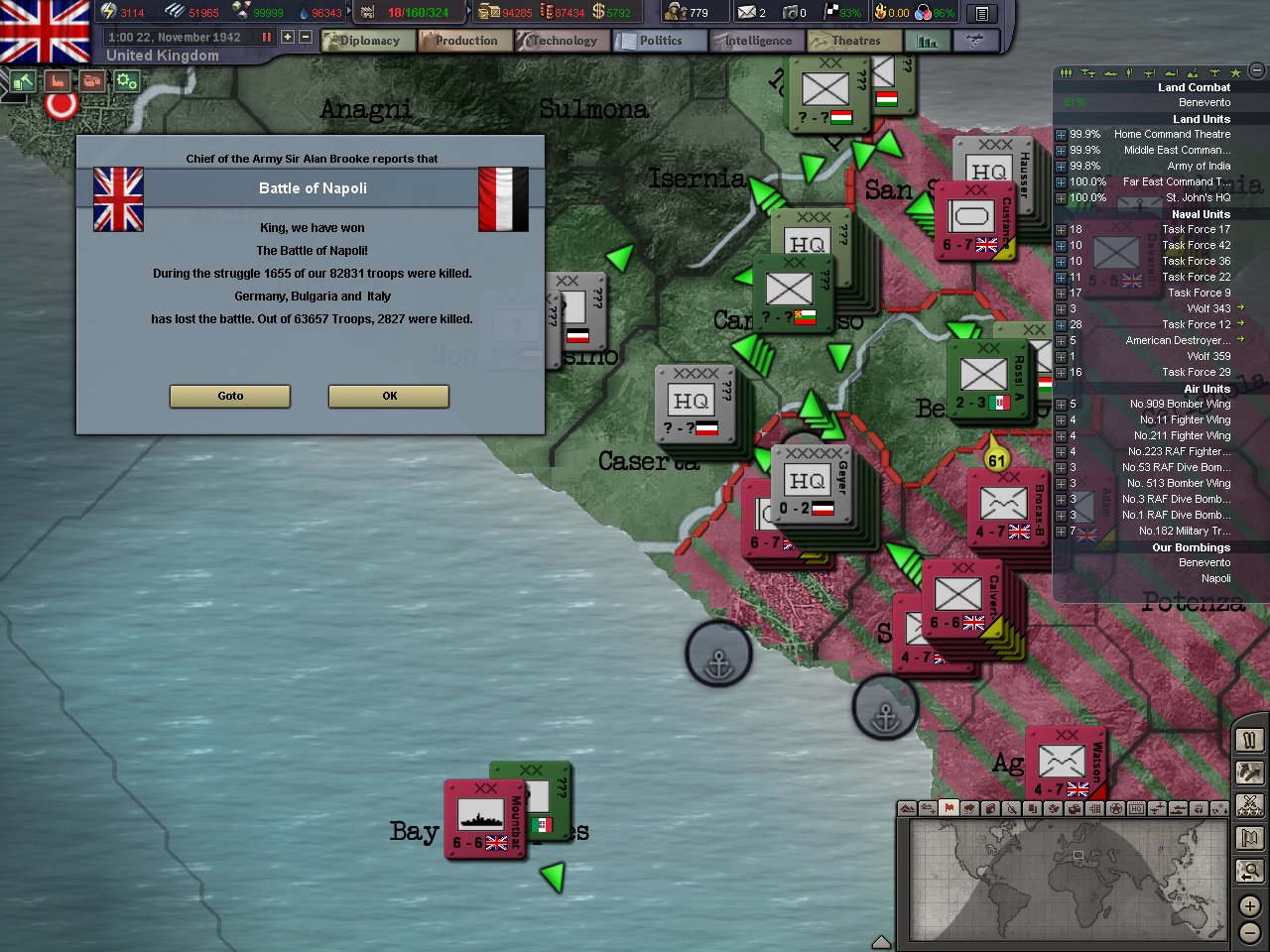
With the triumphant news of our victory in the south, more good news came as the city of Naples fell to our brave boys. With fresh units arriving on the frontlines now was the time to push. Sheer will and momentum, (and alittle bit of heavy artillery and tanks) would keep our troops moving north and prevent the Axis forces from digging in along the many mountains and rivers.
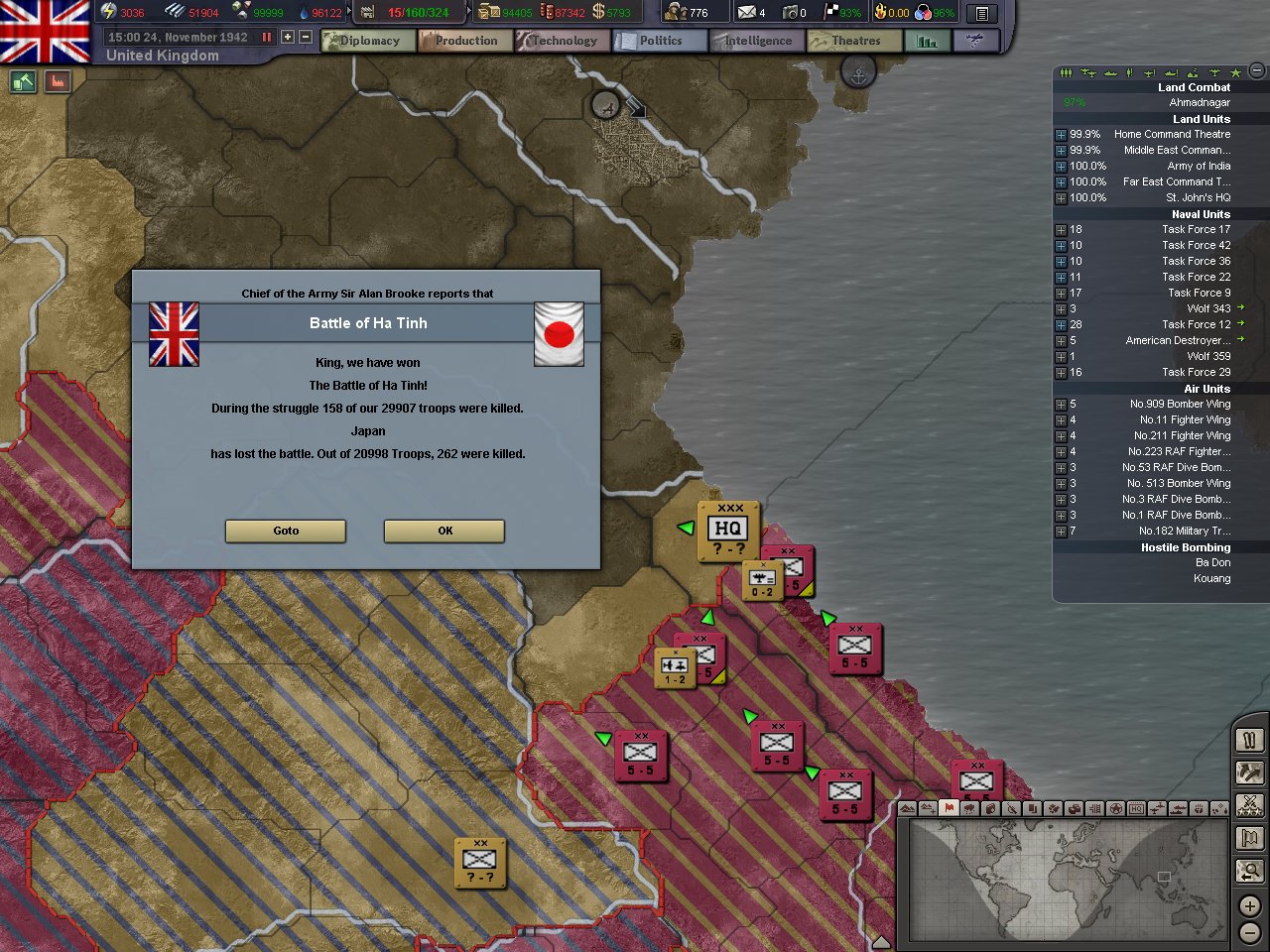
After the city of Hue was abandoned by the Japanese, four Indian and one English division would press onto Hanoi. With the few enemy divisions that were infront of them pushed aside and destroyed, the road looks clear for our boys. Hanoi and it's vital port will be secure with just a mere matter of marching!
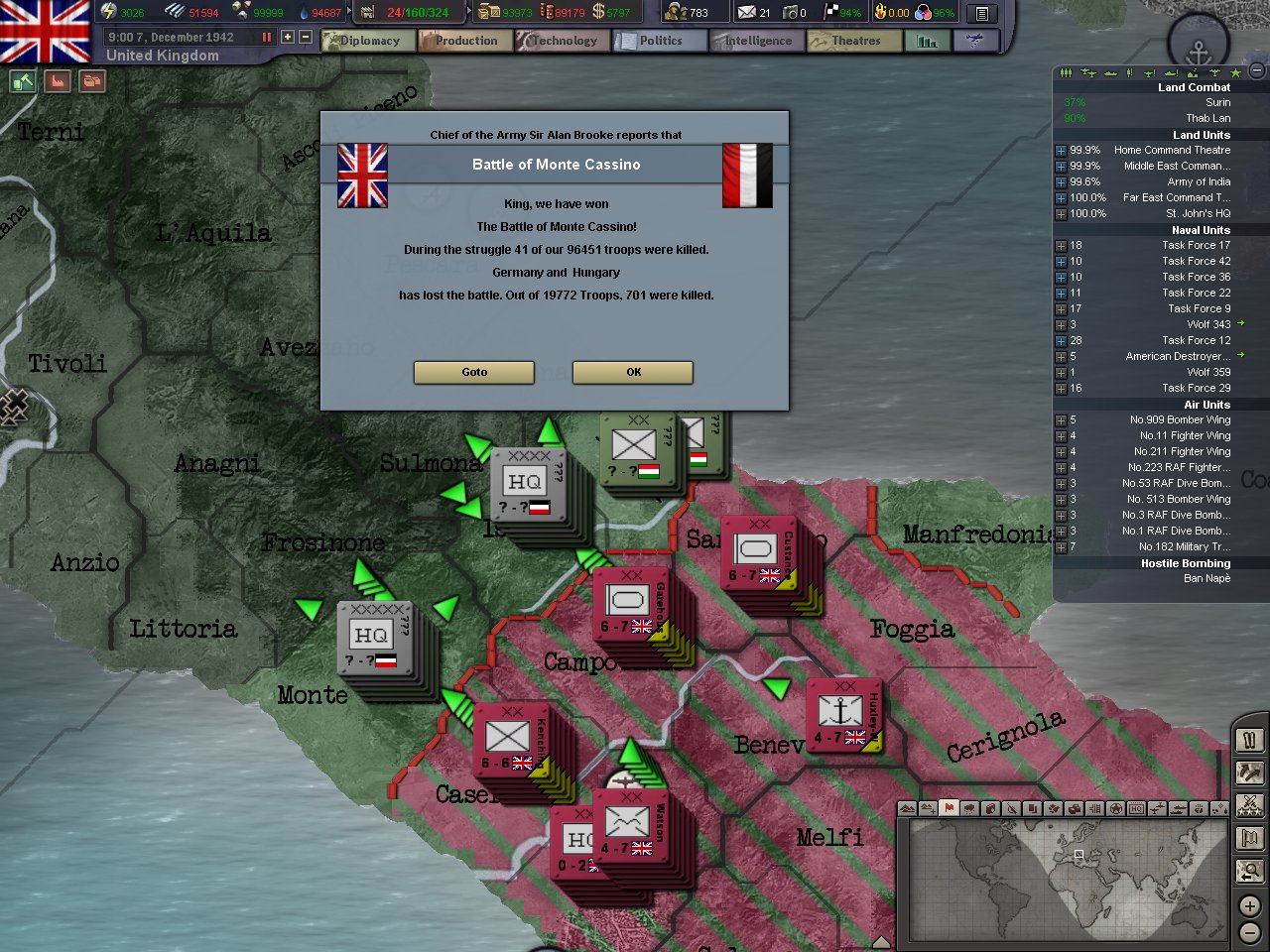
On the 7th of December, as the days begin to grow shorter and the nights colder. The historic and impressive Monte Cassino was secured by a lighting attack by our brave Paras! The Axis frontline may be crumbling but their units were still giving a fight. The day before Cassino was secure, Bulgarian forces had made a deadly stand, they were eventually pushed from their positions but not before almost 3,000 men would die on both sides.
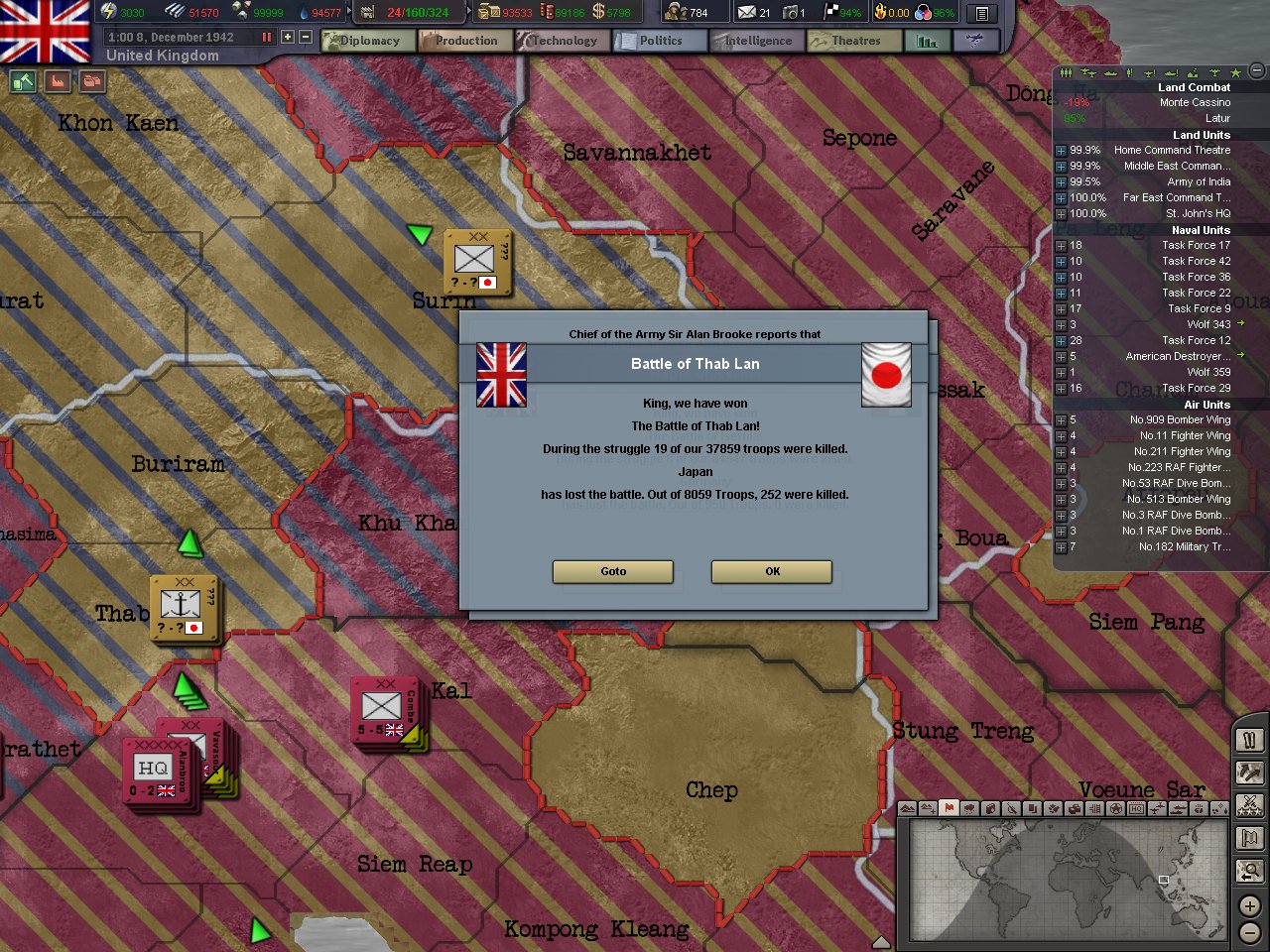
Back in Vietnam, our troops would turn back to Japanese divisions who were attempting to sneak around our main frontline and hit our supply lines from the north. The Battle of Surin saw our men attack a well dug in and prepared Japanese position. It was hell digging them out of the thick jungle but we damn sure got them out. The Battle of Thab Lan would be an entirely different battle. The Japanese marines were ambushed on a jungle road and after a sharp but bloody fight would retreat back the way they had come.
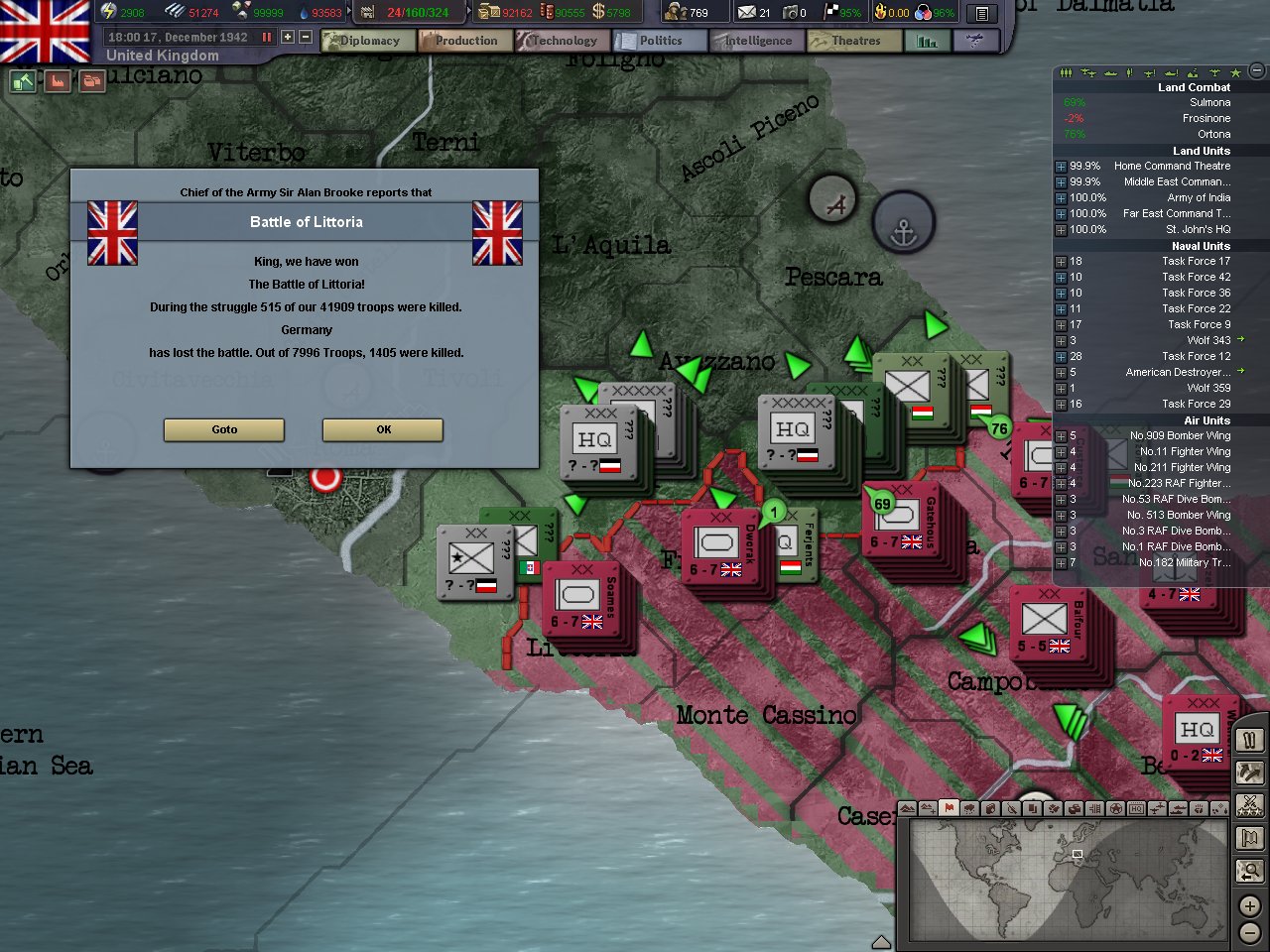
With our armored units leading the drive towards Rome, securing the capital city before the new year begins to become a reality. Only a small SS division stands in the way. With the demoralized Italian and Bulgarian divisions on a full retreat, the out numbered German divisions had no hope of making a stand near the city.
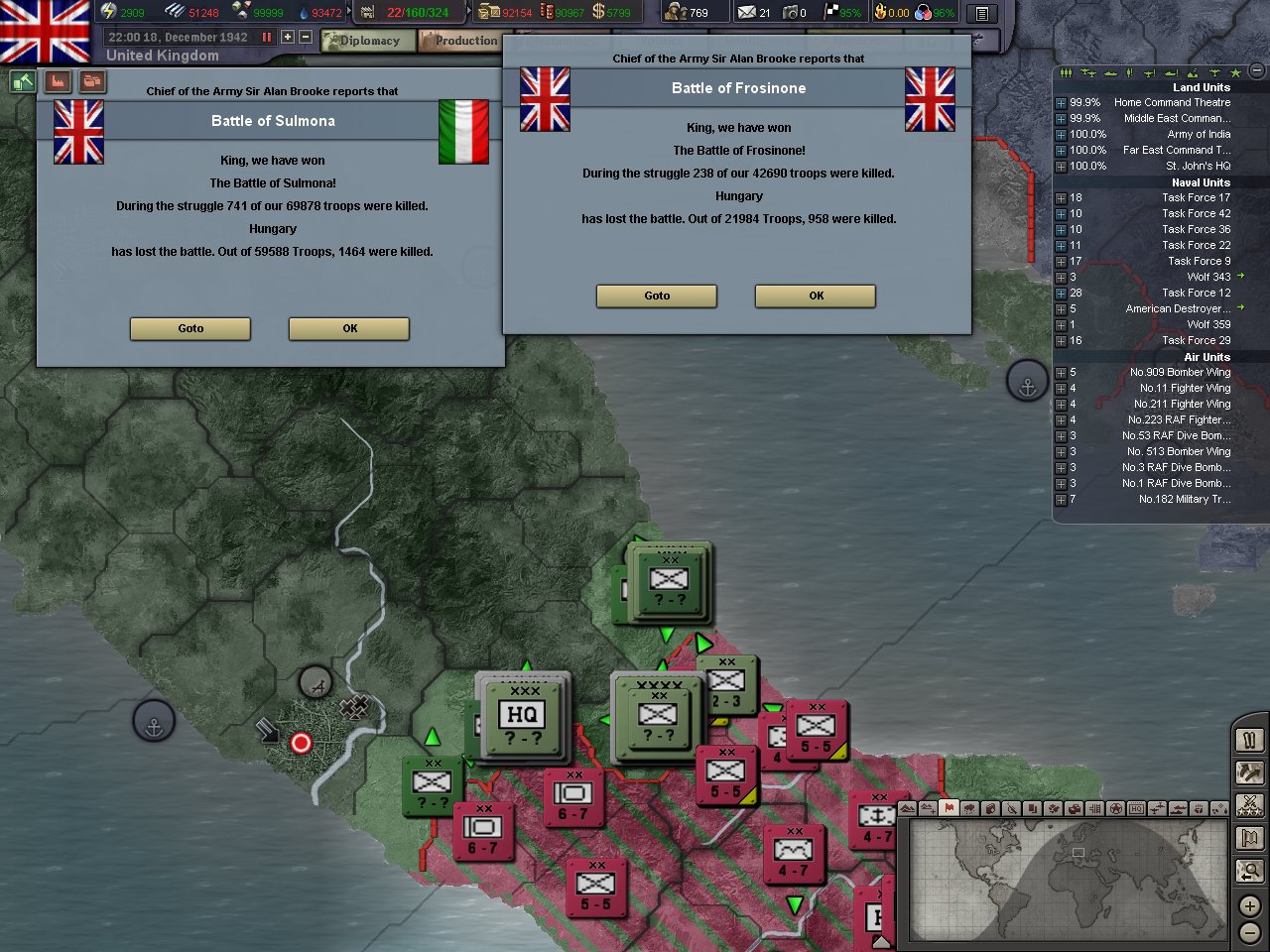
The 18th saw three victories come our way. The port of Ortona would fall after bloody battle costing us 600 men, but costing the Bulgarians 1,400 men.
The centre of the Axis line would be knocked open after two fierce engagements were fought. Both would be typical of the campaign so far in Italy. A combined arms attack would hit the Axis lines, with artillery in close support as well as the RAF on hand to lend a few rockets and 500 pound bombs where needed.
The defending Axis forces, to their credit, would fight and stand under our withering attack and air strikes. Holding onto their positions despite our overwhelming firepower and troops.
The centre of the Axis line would be knocked open after two fierce engagements were fought. Both would be typical of the campaign so far in Italy. A combined arms attack would hit the Axis lines, with artillery in close support as well as the RAF on hand to lend a few rockets and 500 pound bombs where needed.
The defending Axis forces, to their credit, would fight and stand under our withering attack and air strikes. Holding onto their positions despite our overwhelming firepower and troops.
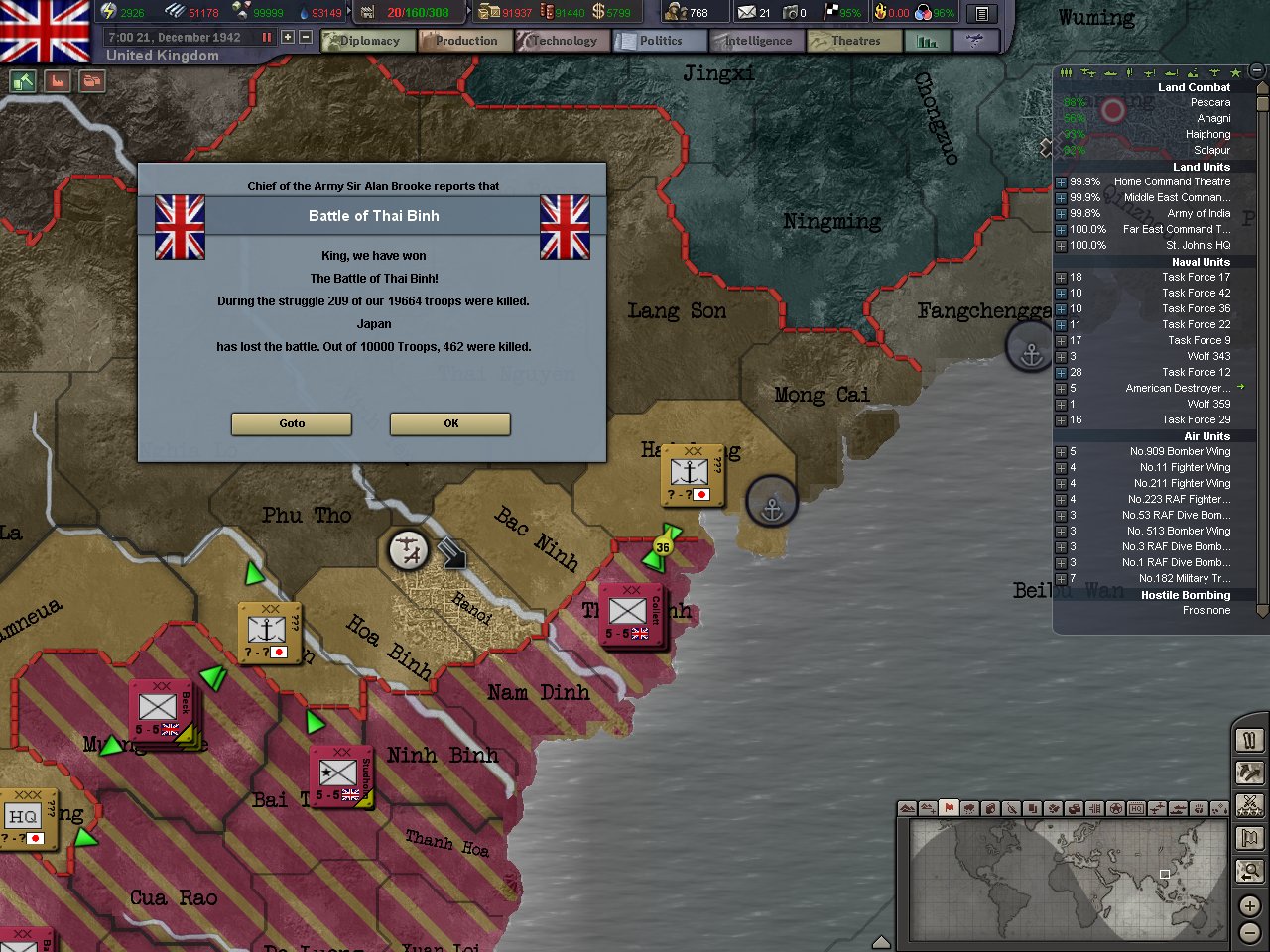
A Japanese counterattack along the flank of our advance towards Hanoi would be stopped, and two of our lead infantry divisions would attack a Japanese marine division holding the port outside of Hanoi. One more tough battle and our victory in Vietnam would be secure!
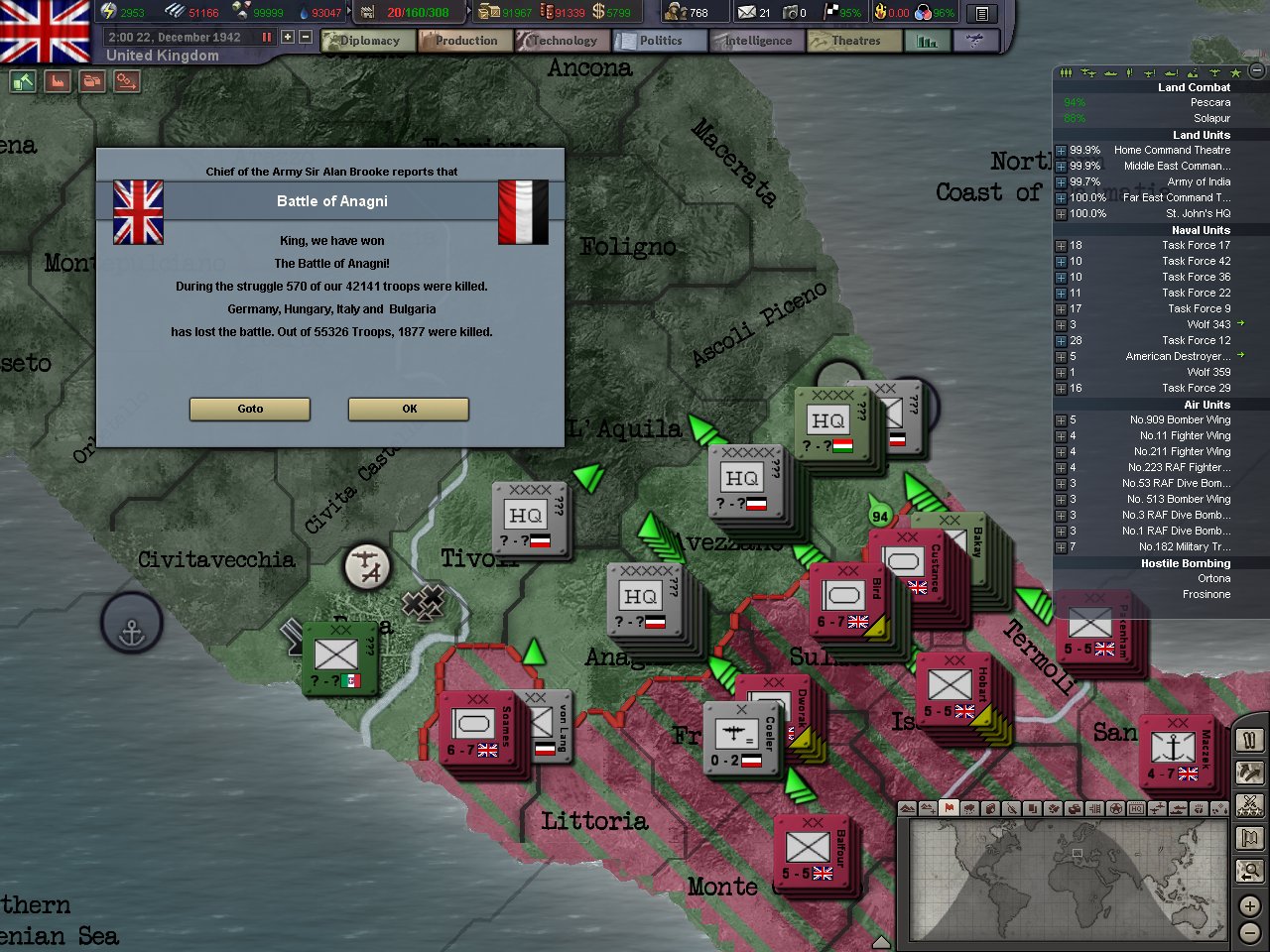
The Axis line in Italy would turn into a full retreat across the whole of the peninsula. Our armored spear aimed towards Rome would however hold and not advance until the rest of the front had caught up. It may have costed us securing Rome before Christmas, but not exposing any point of our frontline as well as allowing our supplies to catch up would be worth holding the advance for a week.
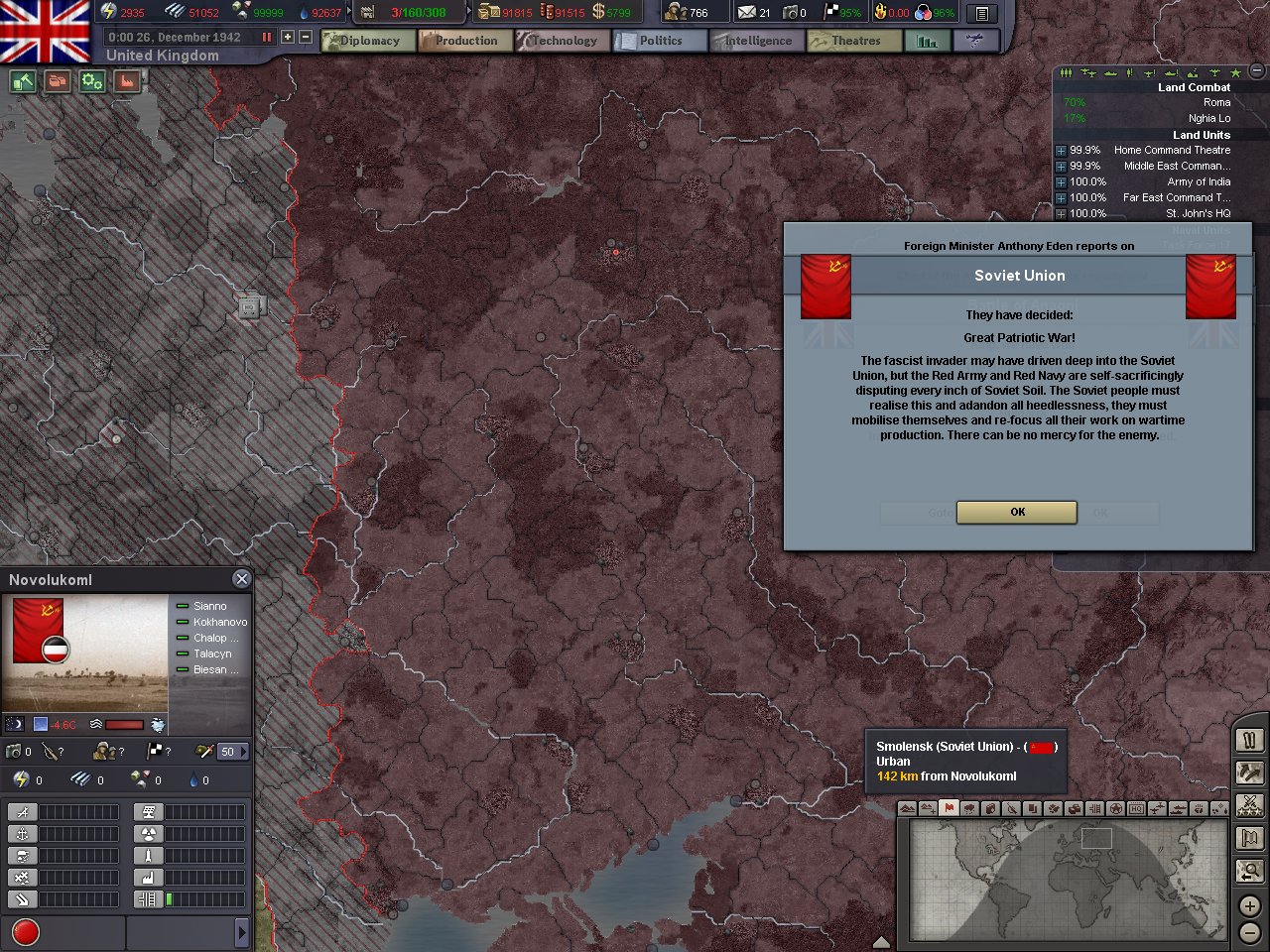
In the Soviet Union, leader Joseph Stalin addressed his nation in a rousing speech. Declaring that the war against the fascist invaders was now a Great Patriotic War! And that every man, woman, and child would have to play their part on the frontlines and at home!
In the House of Commons soon after the speech. MP Winston Churchill, who after being passed up for the job of Prime Minister by the King George VI had become a firm supporter of the King hoping to gain favor.
Churchill stood up in Parliament and made a short appeal that support and supplies should be sent to the Soviets in their fight against the Nazis and Axis forces. Another MP, who had been critical of Churchill, His Majesty and Prime Minister Halifax, stood up and asked why Churchill, who routinely criticized the Soviet Union and its leader, would choose now to make a favorable comment on them and that support from our Empire should be sent to them. Churchill, cigar in hand, stood up and said "My dear sir, if Hitler invaded Hell I would make at least a favorable reference to the Devil in the House of Commons." The rebuke was met with great applause and the MP who had been critical shrinked away in his seat.
In the House of Commons soon after the speech. MP Winston Churchill, who after being passed up for the job of Prime Minister by the King George VI had become a firm supporter of the King hoping to gain favor.
Churchill stood up in Parliament and made a short appeal that support and supplies should be sent to the Soviets in their fight against the Nazis and Axis forces. Another MP, who had been critical of Churchill, His Majesty and Prime Minister Halifax, stood up and asked why Churchill, who routinely criticized the Soviet Union and its leader, would choose now to make a favorable comment on them and that support from our Empire should be sent to them. Churchill, cigar in hand, stood up and said "My dear sir, if Hitler invaded Hell I would make at least a favorable reference to the Devil in the House of Commons." The rebuke was met with great applause and the MP who had been critical shrinked away in his seat.
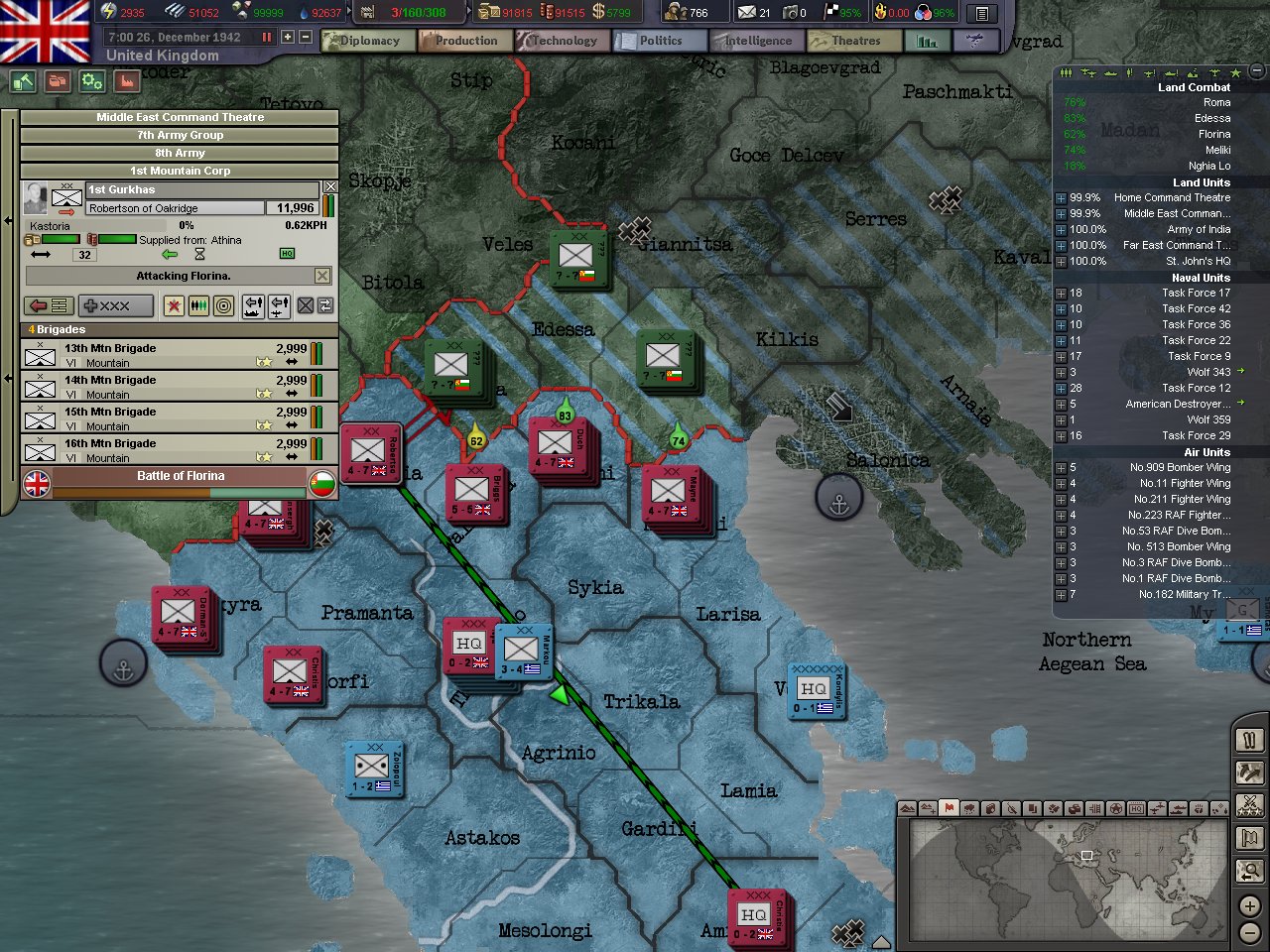
Back on the front lines.
The Greek front, though it had be silent for a few months since the invasion of Italy had begun. Was now sent on the offensive. The Axis frontline had been greatly weakened and now only a small handful of Bulgarian divisions held the front. It was now time to put pressure on another front!
The Greek front, though it had be silent for a few months since the invasion of Italy had begun. Was now sent on the offensive. The Axis frontline had been greatly weakened and now only a small handful of Bulgarian divisions held the front. It was now time to put pressure on another front!
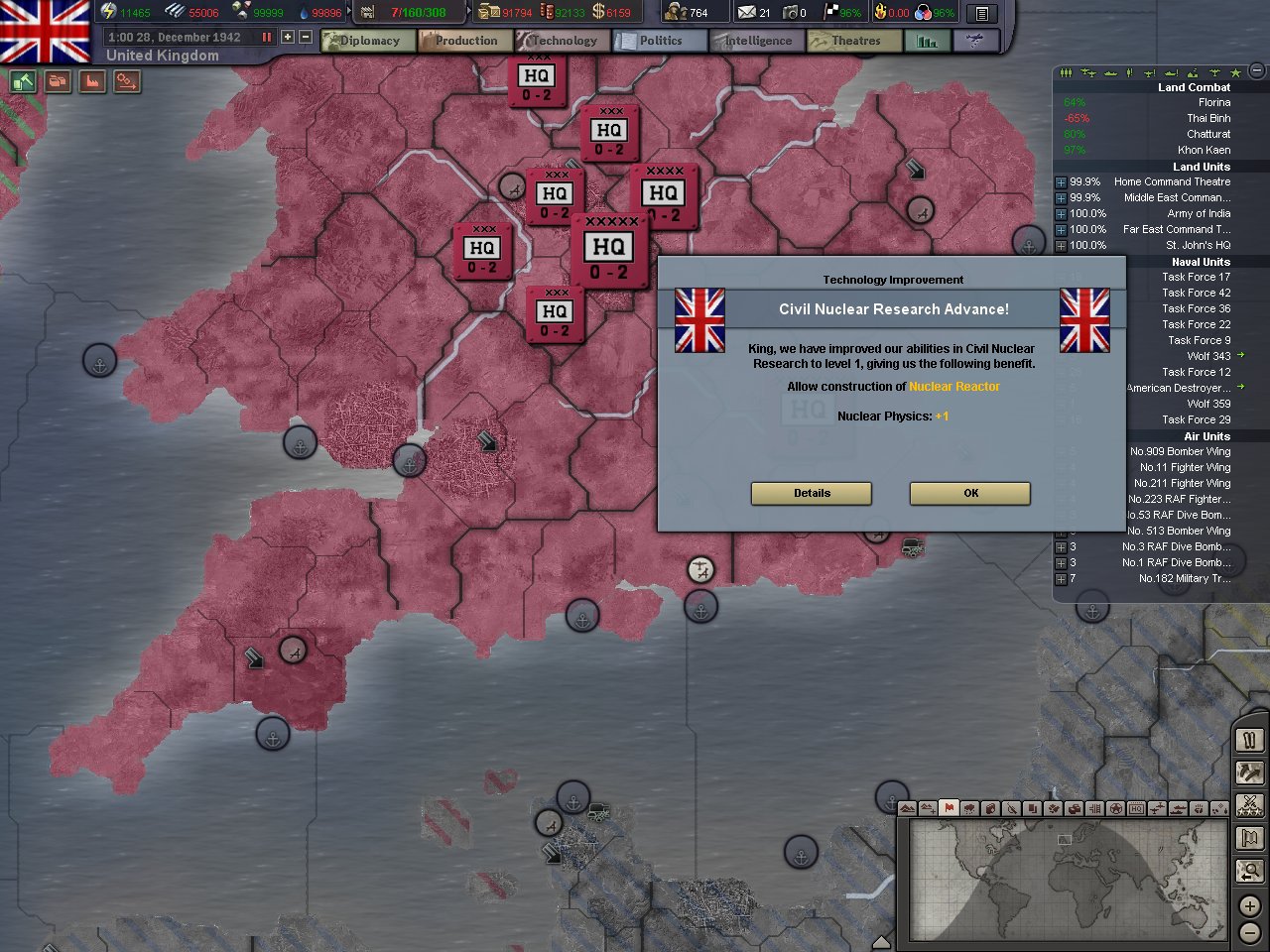
Back home two bits of good news added ontop of the many victories our armed forces had won this year. The year ended with a great surge of volunteers as recruiting stations became filled with men trying to join the heroic Paratrooper Corp, or trying to join the great men of the Royal Marines! The new recruits, where ever they were joining, would be a great help as causality lists kept on growing as the days kept going.
The next bit of good news was that our Nuclear Research was now ready to kick into high gear! Hopefully, in two years now, we'll have the capacity to begin constructing nuclear weapons, though God willing the war will be long done before we reach that option.
The next bit of good news was that our Nuclear Research was now ready to kick into high gear! Hopefully, in two years now, we'll have the capacity to begin constructing nuclear weapons, though God willing the war will be long done before we reach that option.
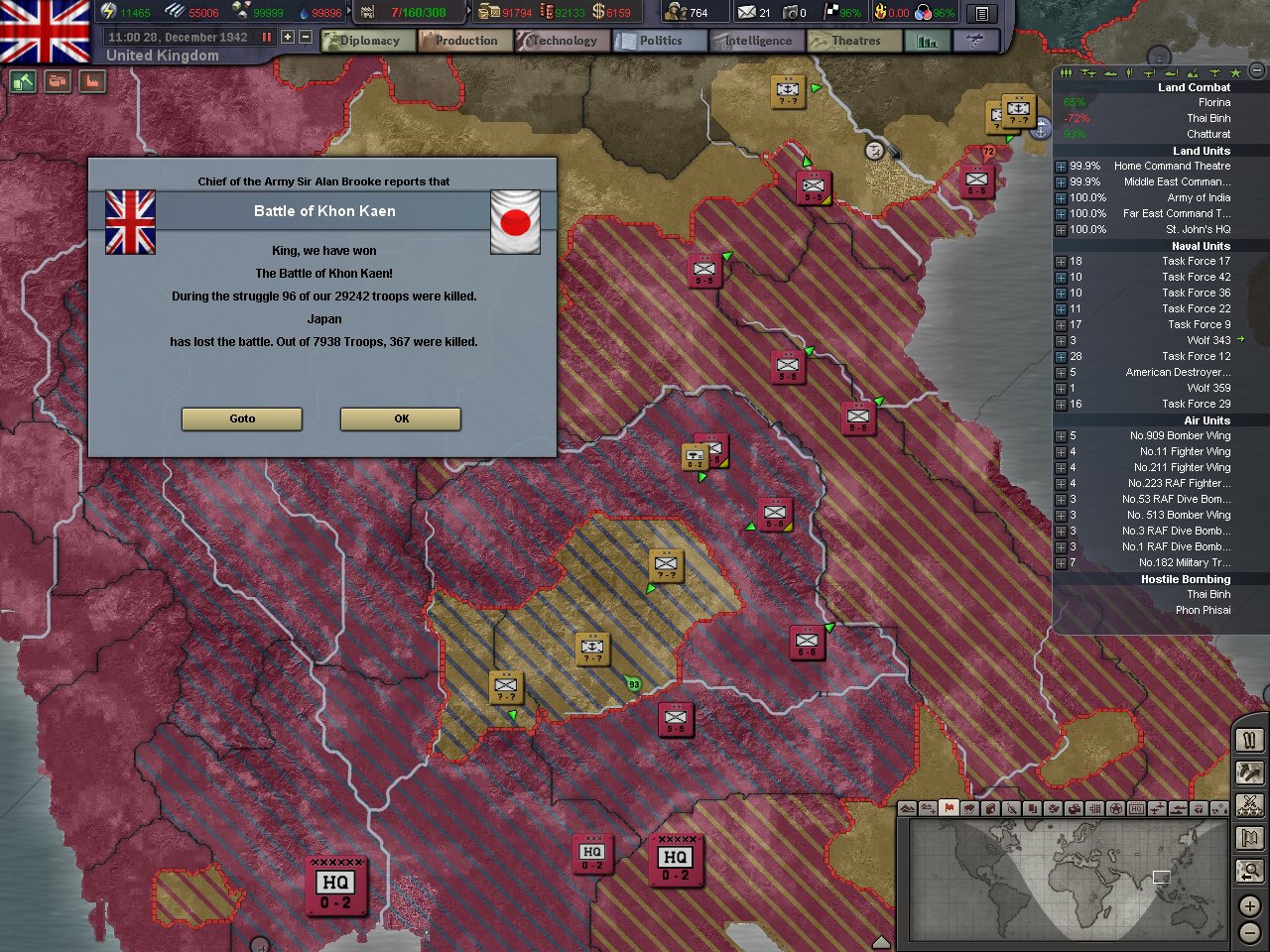
As the battle to the north around Hanoi grounds in, our other forces in Vietnam surround three Japanese divisions in the Jungles, and begin tightening the noose around their necks.
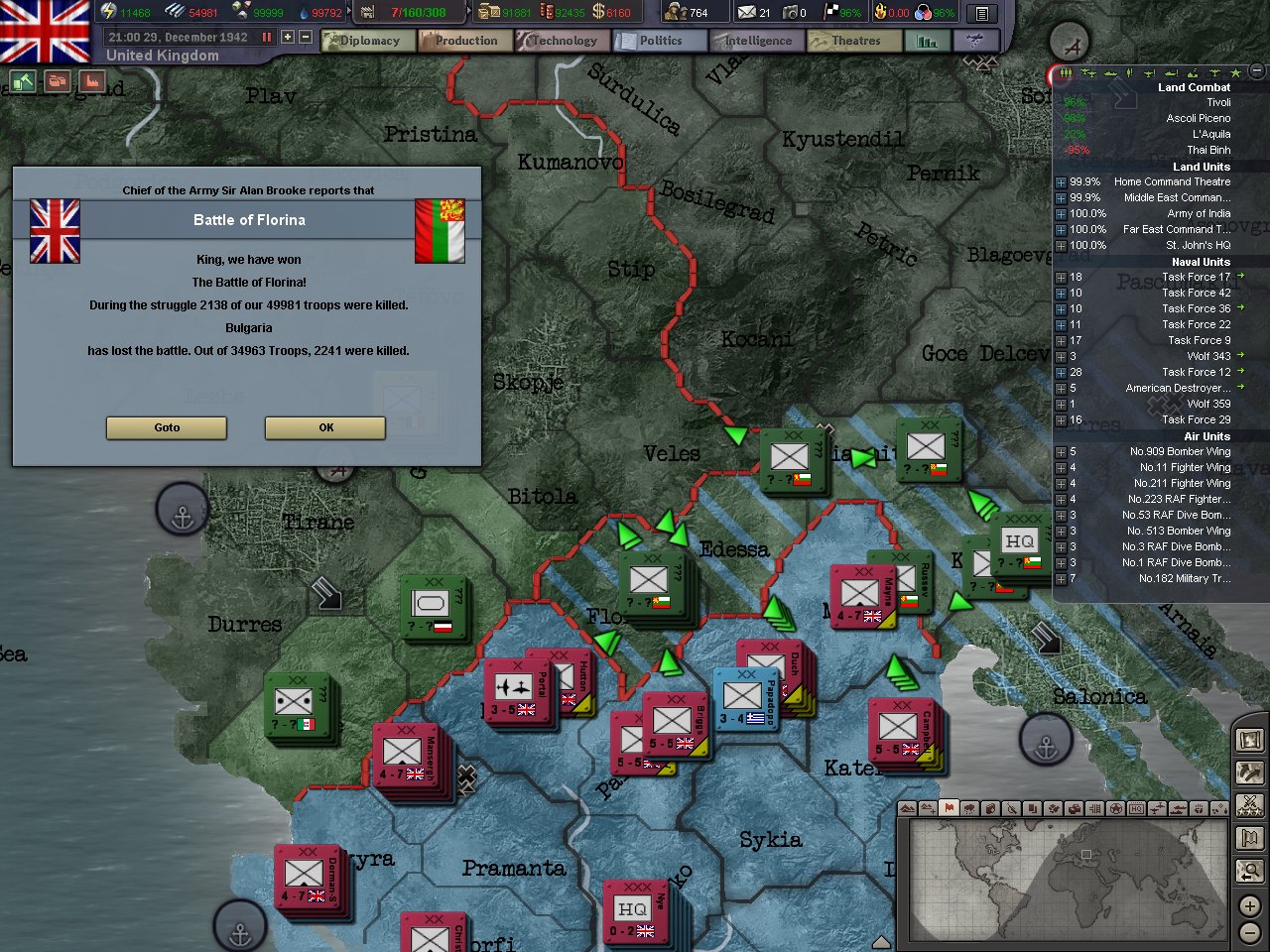
The advance in Greece met with success as we pushed the weak Bulgarian defenders back and out of the few regions in Greece under Axis occupation.
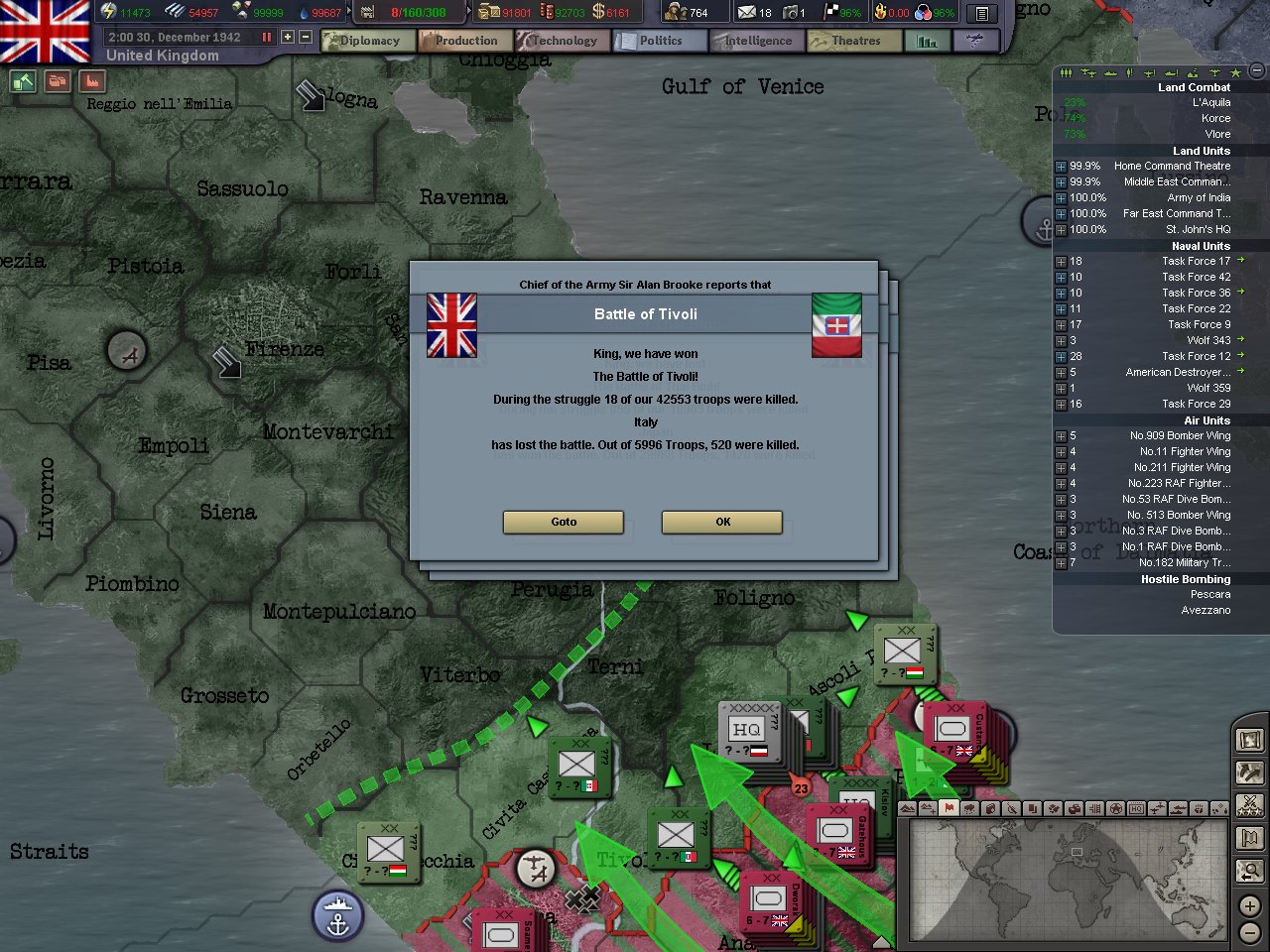
On the 29th of December our armored units entered the historic city of Rome, forcing out the Italians. Else where on the front, our men encountered some stiff resistance from some Germans and Italians. With our divisions advancing on the flanks of this pocket of resistance, the plan was to pin them with our forces in the front, and then crack into the exposed flanks of the Axis divisions.
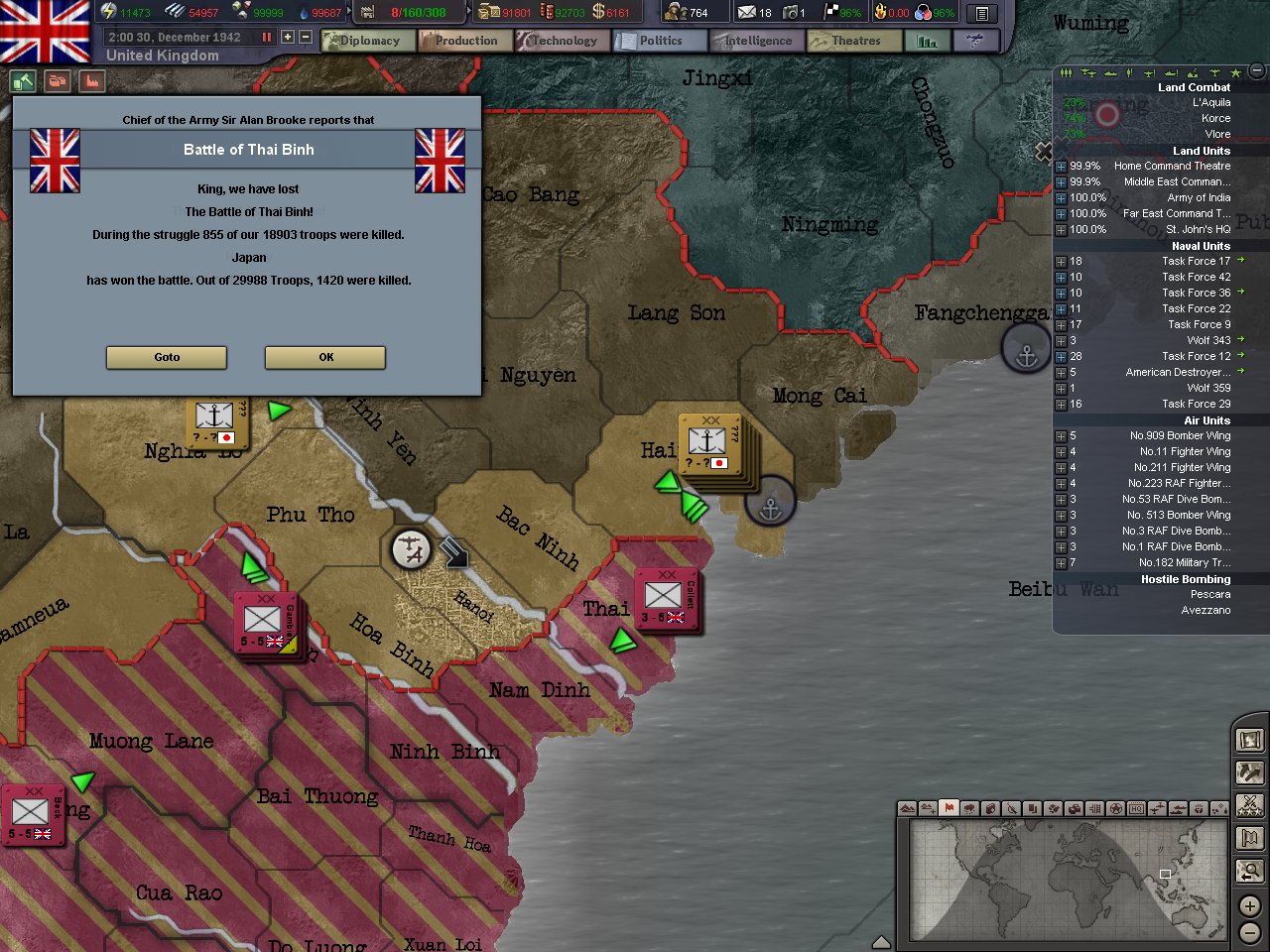
In Hanoi we received some bad news. Despite inflecting serious causalities on the Japanese, they were able to flood in more and more marine and infantry divisions. Our two lone divisions were forced to retreat back across the Hanoi rivers and form up on new defensive positions. Hopefully though, our divisions to the north are able to find a ford and cross the river and get around the soon to be dug in Japanese.
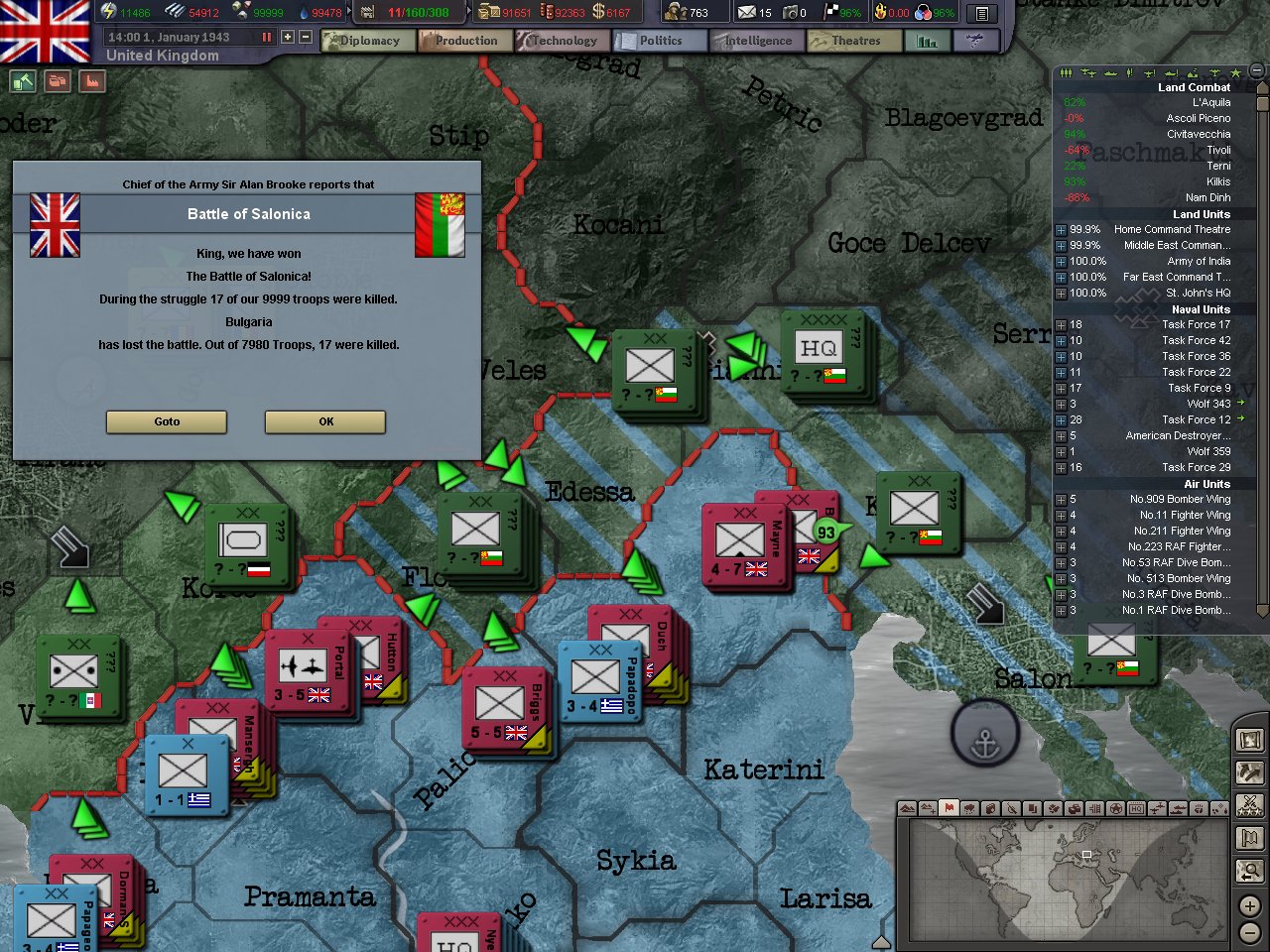
With a general advance now beginning on the Greek front we now began making a push towards occupied Albania and towards Salerno on the Greek coast. The Royal Navy was always close at hand to provide helping support in the form of 15 inch shells.
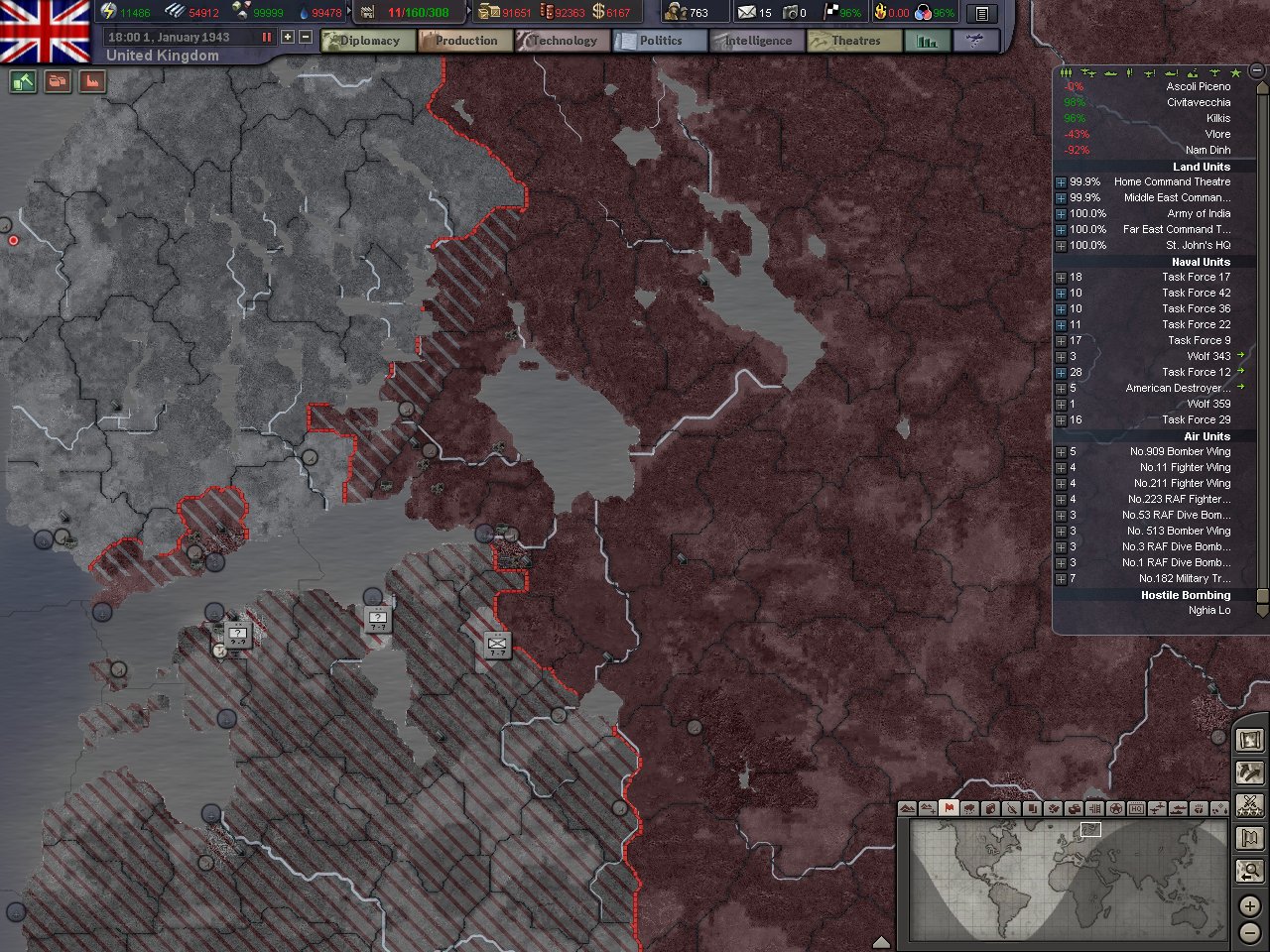
On the Russian front, Axis forces were on the outskirts of Leningrad and were pushing farther and farther into the Soviet Union.
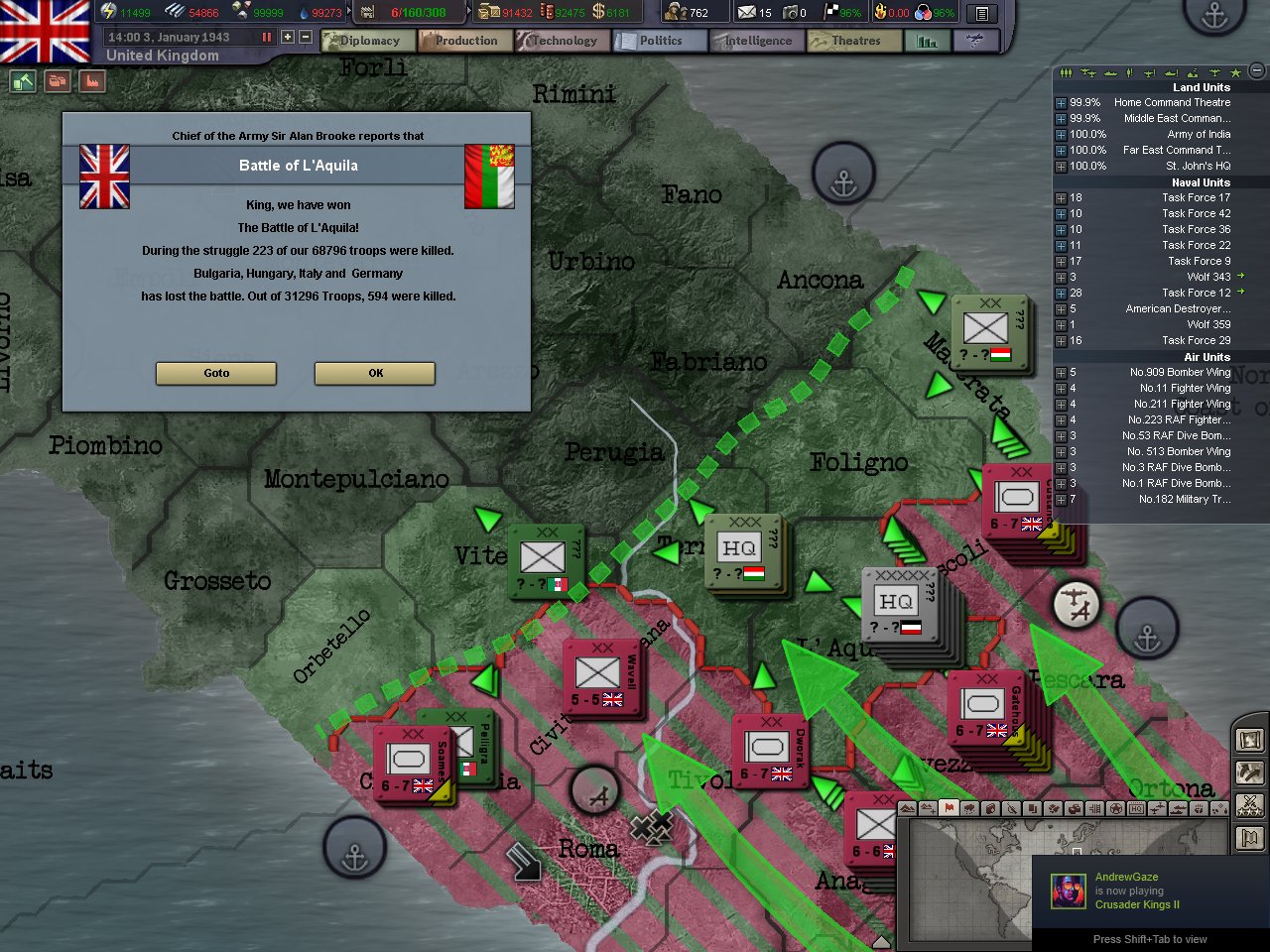
Over the two days of the second and third, three battles were fought and the Axis frontline more or less began to collapse. A opportunity now presented itself to surrond and capture several German divisions that formed the centre of the Axis frontline in Italy.
Getting an armored division behind and on the route of retreat for the Germans was now becoming more and more possible.
Getting an armored division behind and on the route of retreat for the Germans was now becoming more and more possible.
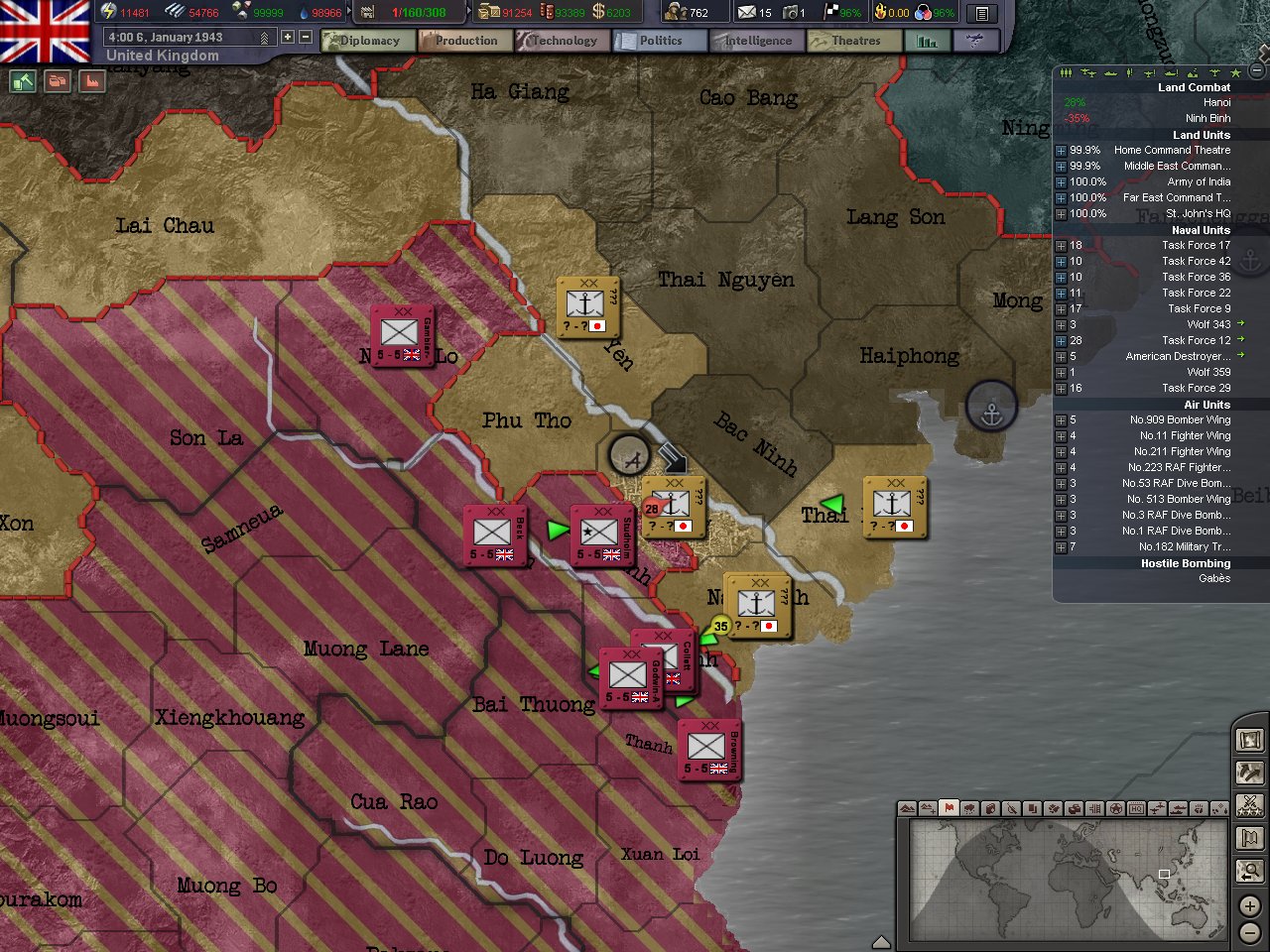
In the Far East, the situation began to turn around on us. Japanese forces had gotten into Hanoi, and had dug in along the river. Forcing the enemy out of Hanoi and off of the banks would be no easy task. But hopefully our troops could force the issue soon.
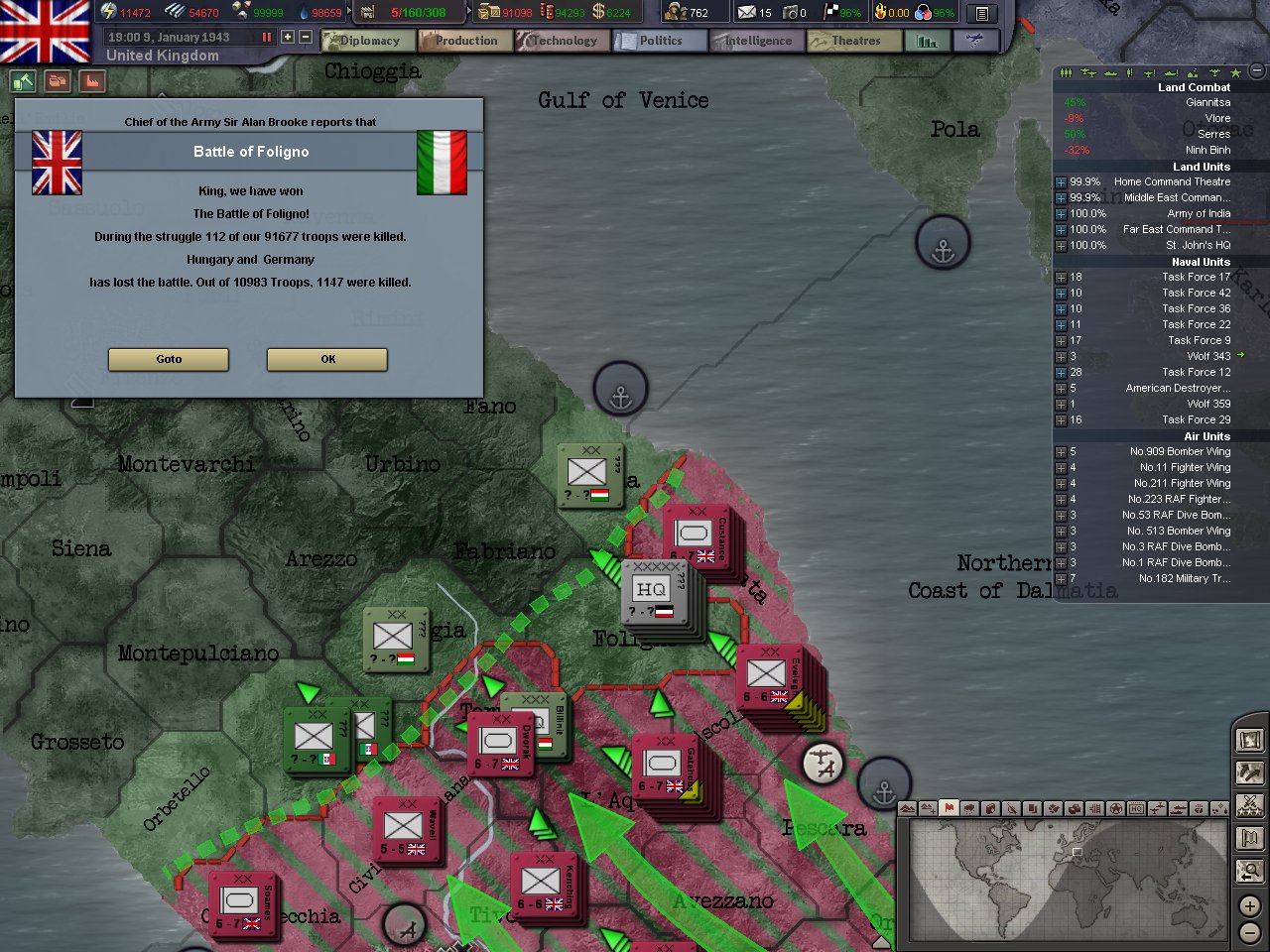
The retreating German divisions that we had attempted to cut off and surround made it to safety, but we then hit them before they could get into good positions. The resulting battle would be nothing sort of a massacre. The fight was certainly out of the German allies in Italy.
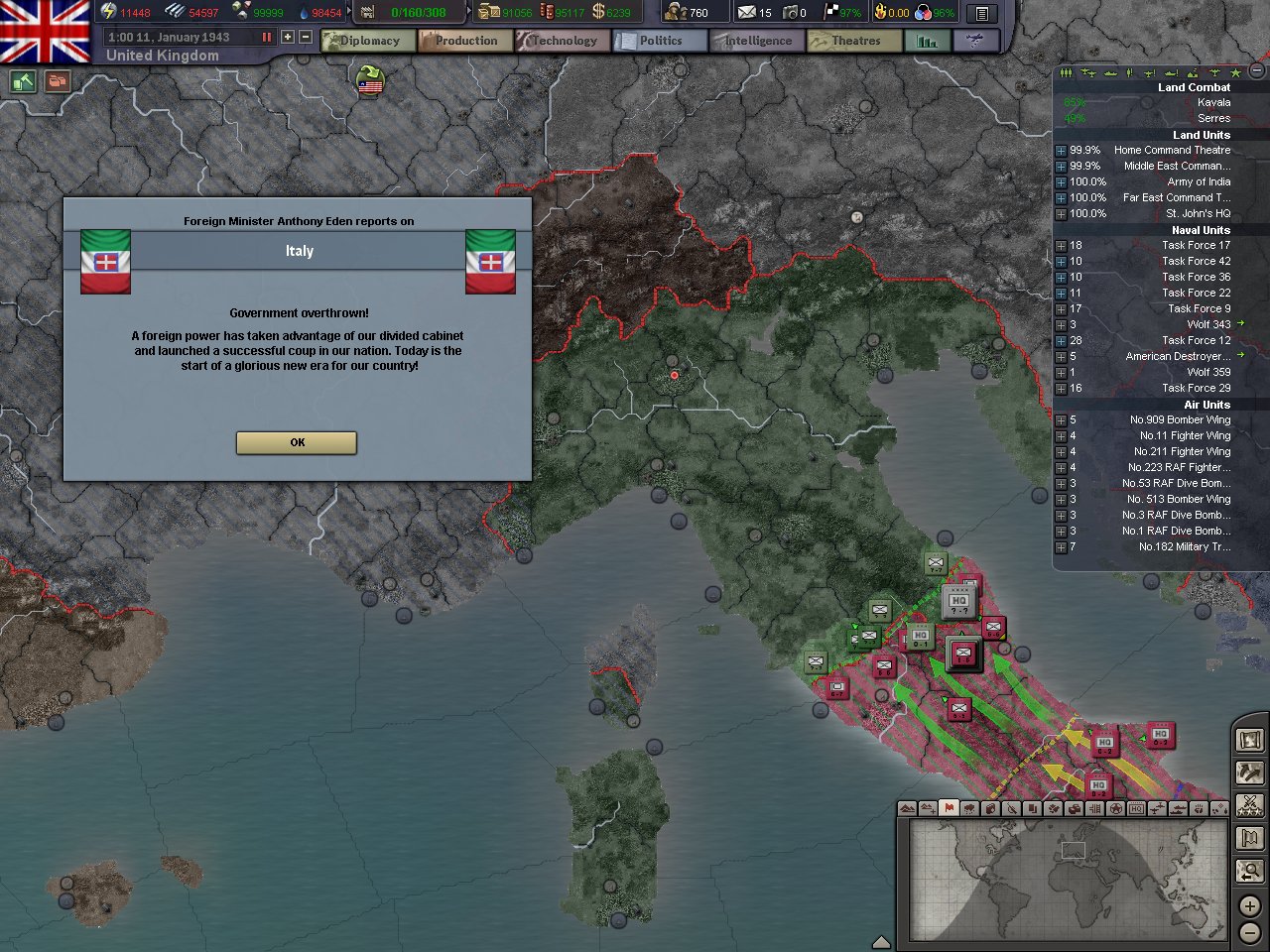
With the general fighting spirit gone from our enemies in Italy, the Chiefs of Staff began looking for a way to knock Italy out of the way. And as more and more of Italy fell, a opportunity presented itself.
Ever since Rome had been taken by our forces just before the New Year, the Italian government and Mussolini himself had been a hot topic. We had failed to capture any of his ministers or himself when we took the city. And if we could capture the government and force them to capitulate then the war in Italy was mostly done with.
Not long after New Years, MI6 had located the Italian government in Genoa and almost immediately a plan was put in place to send a strike force to the city and capture Mussolini and all of his ministers.
Ever since Rome had been taken by our forces just before the New Year, the Italian government and Mussolini himself had been a hot topic. We had failed to capture any of his ministers or himself when we took the city. And if we could capture the government and force them to capitulate then the war in Italy was mostly done with.
Not long after New Years, MI6 had located the Italian government in Genoa and almost immediately a plan was put in place to send a strike force to the city and capture Mussolini and all of his ministers.
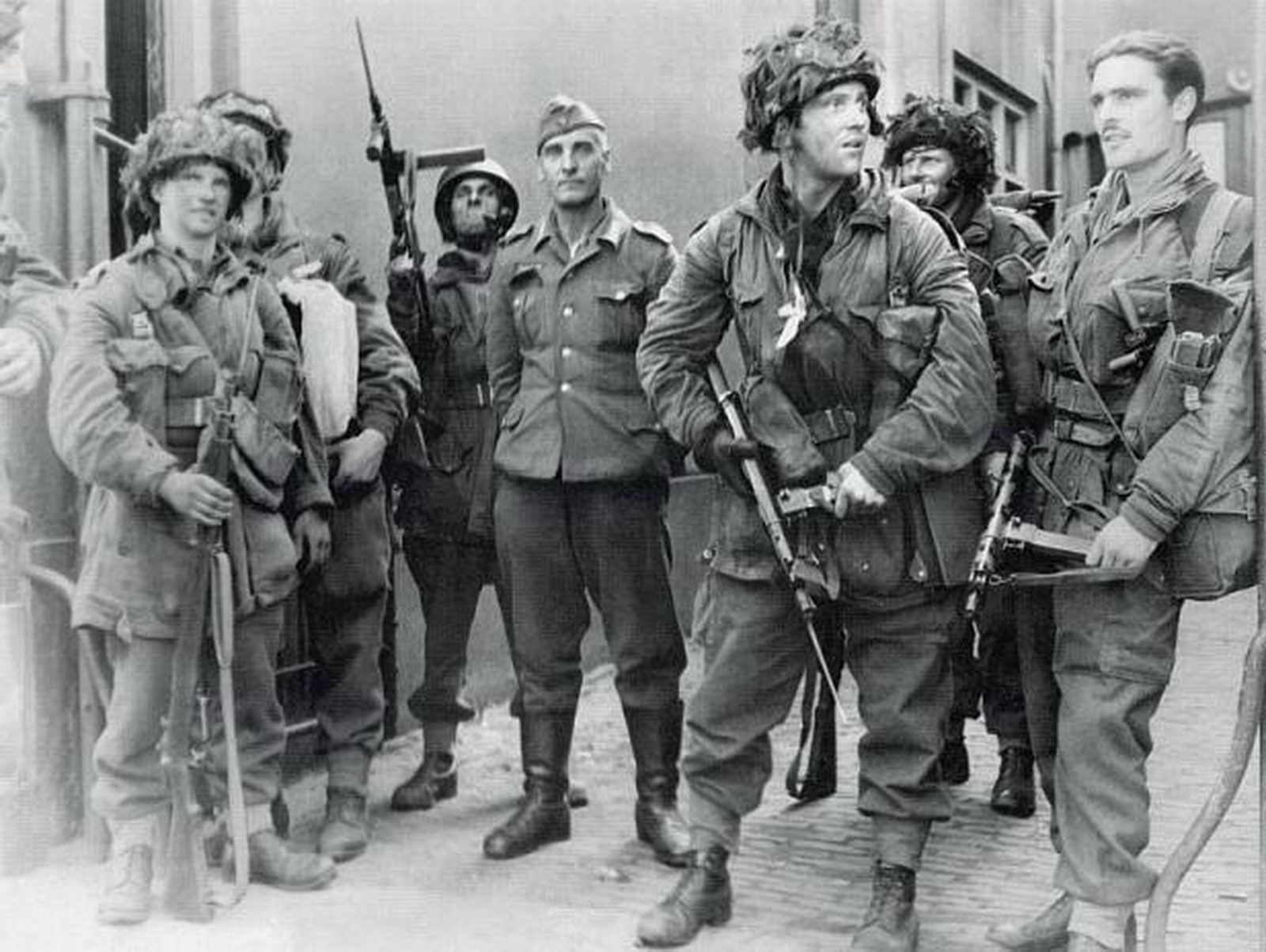
soldiers of the No.62 Commando stand with a captured high ranking Italian officer
No.62 Commando, or the Small Scale Raiding force was chosen for the job. 150 men were silently landed on the coast just outside the city on the night of the seventh of January, just five days after the idea for the mission was born. And with the help of SOE operators inside the city, the 150 men were smuggled in over two nights with all of their equipment and set up positions around two houses that were suspected of housing the Italian government.
In the early morning of the 11th of January, the 150 men of the commando unit in Genoa silently approached the houses and launched the short but violent attack. Our intelligence proved to be accurate, and all of the ministers were in the house save for the Minister of Transportation and the one for sanitation, not a huge lose. But more importantly, our Commandos captured Benito Mussolini himself. He was captured in his bed, in his underwear and with his mistress in bed. It was quite a sight for the men.
Operation Lighting, as the operation was called, went off without a hitch. Only one man was wounded and him not even seriously. A further 600 men of No.6 Commando were landed to reinforce the small garrison until proper forces could arrive.
No.62 Commando, or the Small Scale Raiding force was chosen for the job. 150 men were silently landed on the coast just outside the city on the night of the seventh of January, just five days after the idea for the mission was born. And with the help of SOE operators inside the city, the 150 men were smuggled in over two nights with all of their equipment and set up positions around two houses that were suspected of housing the Italian government.
In the early morning of the 11th of January, the 150 men of the commando unit in Genoa silently approached the houses and launched the short but violent attack. Our intelligence proved to be accurate, and all of the ministers were in the house save for the Minister of Transportation and the one for sanitation, not a huge lose. But more importantly, our Commandos captured Benito Mussolini himself. He was captured in his bed, in his underwear and with his mistress in bed. It was quite a sight for the men.
Operation Lighting, as the operation was called, went off without a hitch. Only one man was wounded and him not even seriously. A further 600 men of No.6 Commando were landed to reinforce the small garrison until proper forces could arrive.
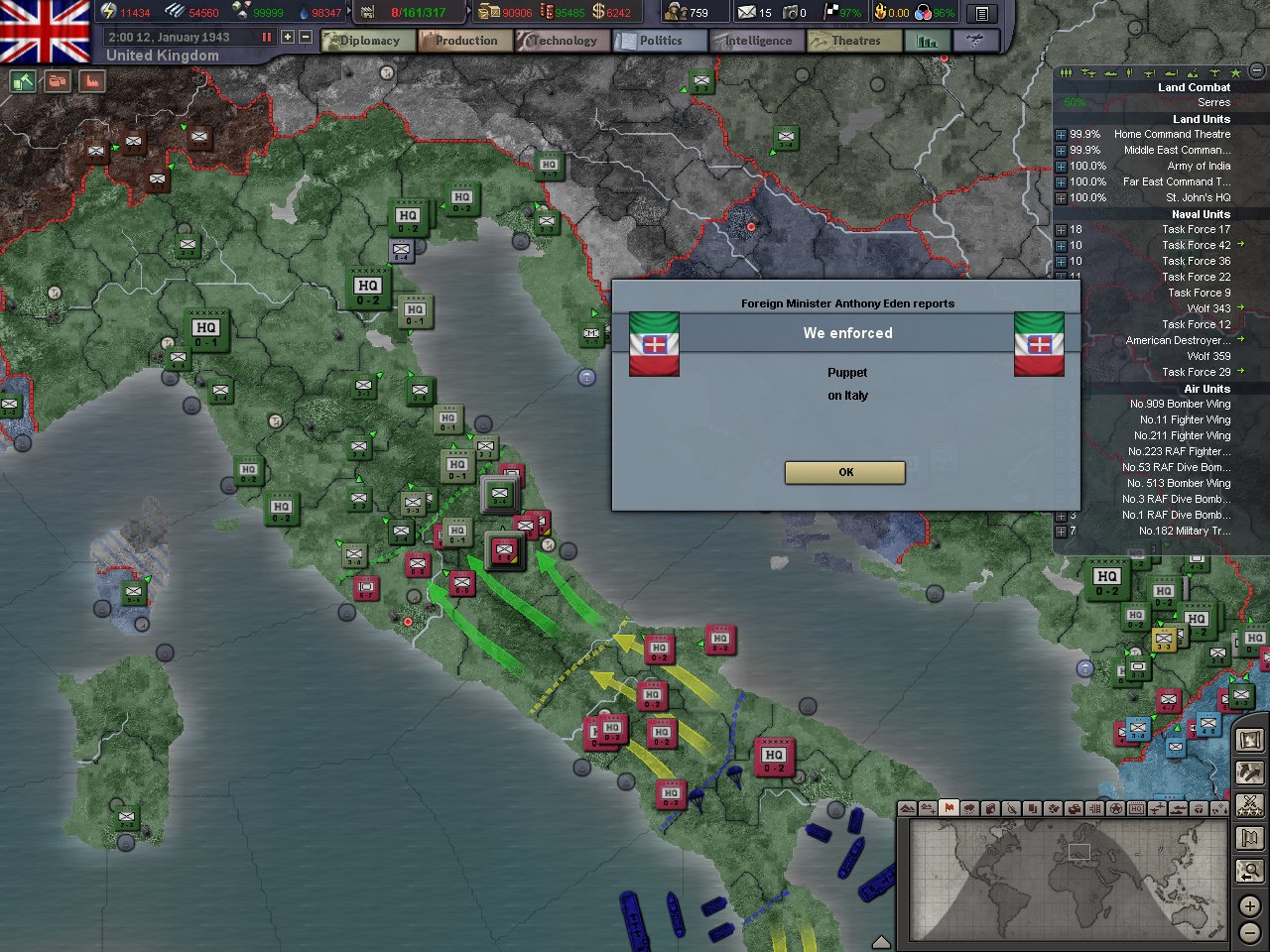
The following day, it became official. Italy surrendered. And after a quick negotiation decided to flip sides and join the fight against the Fascist forces. Hopefully this would begin to turn the tide and open up the soft underbelly off Hitler's Germany, as had been hoped.
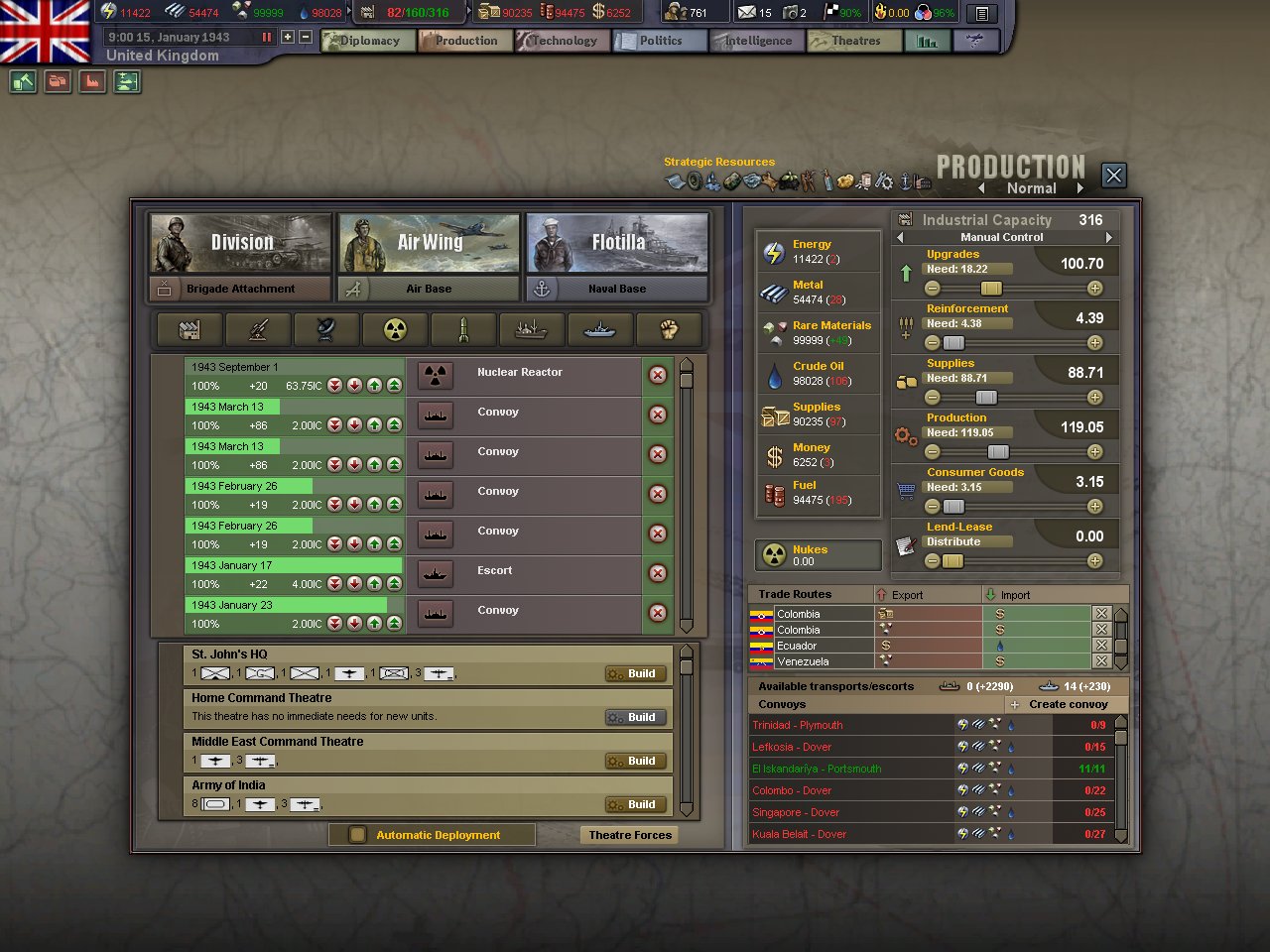
Several days later, the first Nuclear reactor was put into production. In just nine months we would have a functioning reactor and the production of a nuclear warhead could begin.
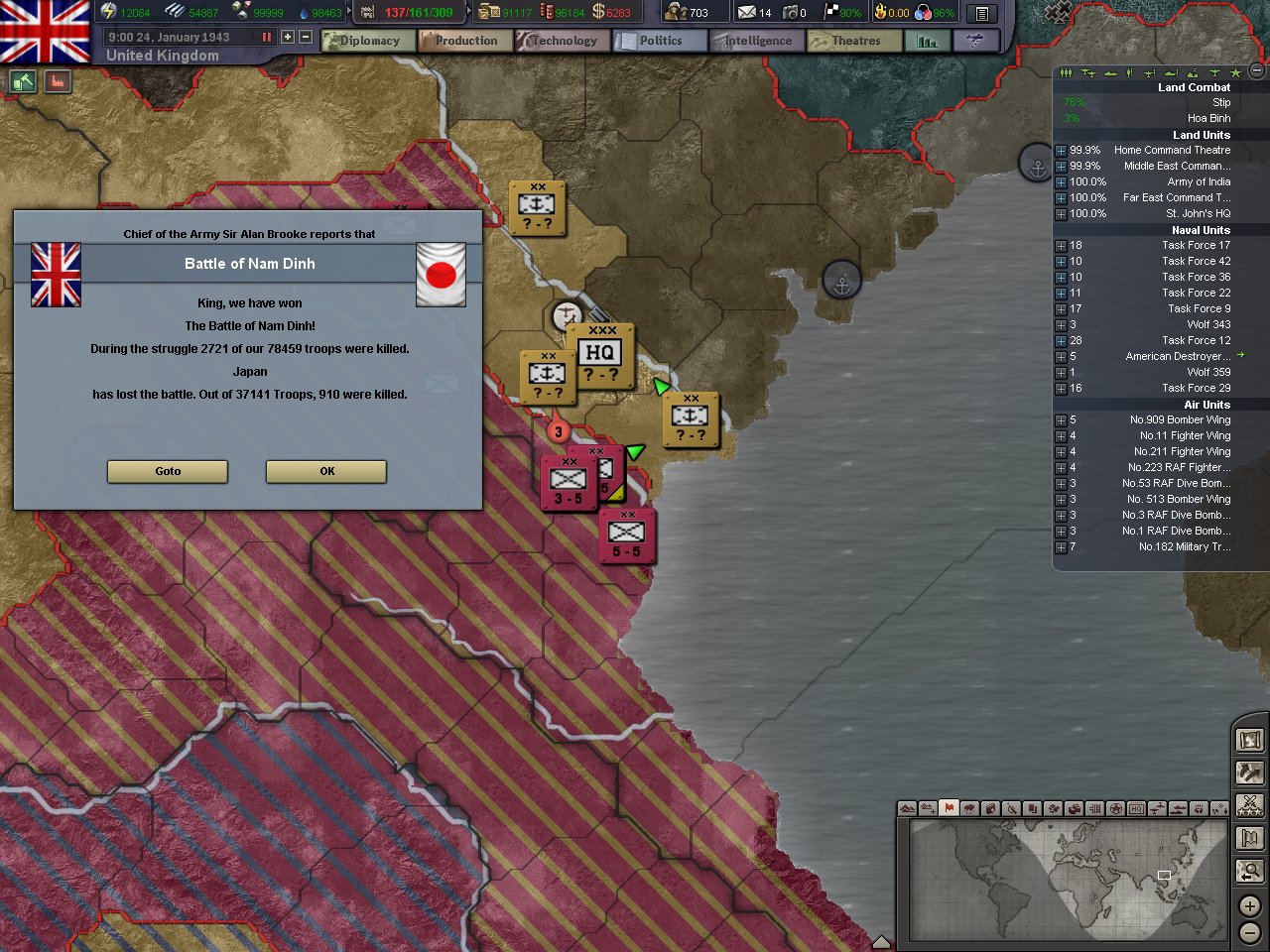
In the Far East,away from clandestine raids and captured ministers, two new developments occurred. In Vietnam, our forces attacked the Japanese troops holding Hanoi and forced them off of the southern end of the river. A route to flank the city and to get to the port was now open.
And in India, the few last Japanese divisions that had landed in India were finally destroyed or captured. Once the small mopping up operations were done these troops would be sent to to Vietnam and would join future operations in China and the East.
And in India, the few last Japanese divisions that had landed in India were finally destroyed or captured. Once the small mopping up operations were done these troops would be sent to to Vietnam and would join future operations in China and the East.
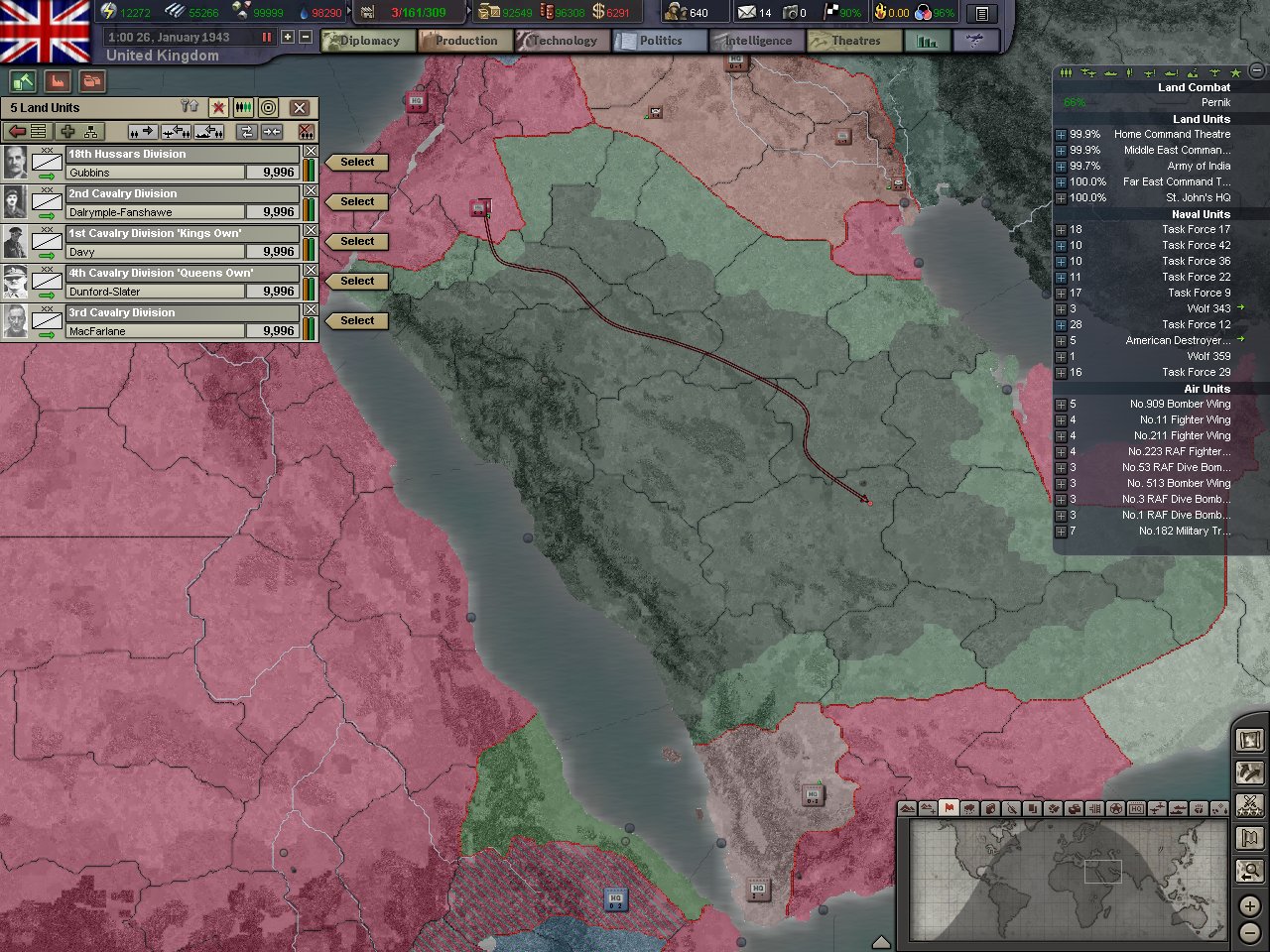
In the Middle East, MI6 had determined that Saudi Arabia was selling Nazi Germany oil and raw materials. The supplies were flowing through Saudi Arabia, to Turkey and then up through the Balkans. Following the Allied Decree, Parliament would only authorize an invasion of Saudi Arabia to cut off the source of supplies to Germany, and not Turkey. The Cavalry Corp would mount the assault into the country.
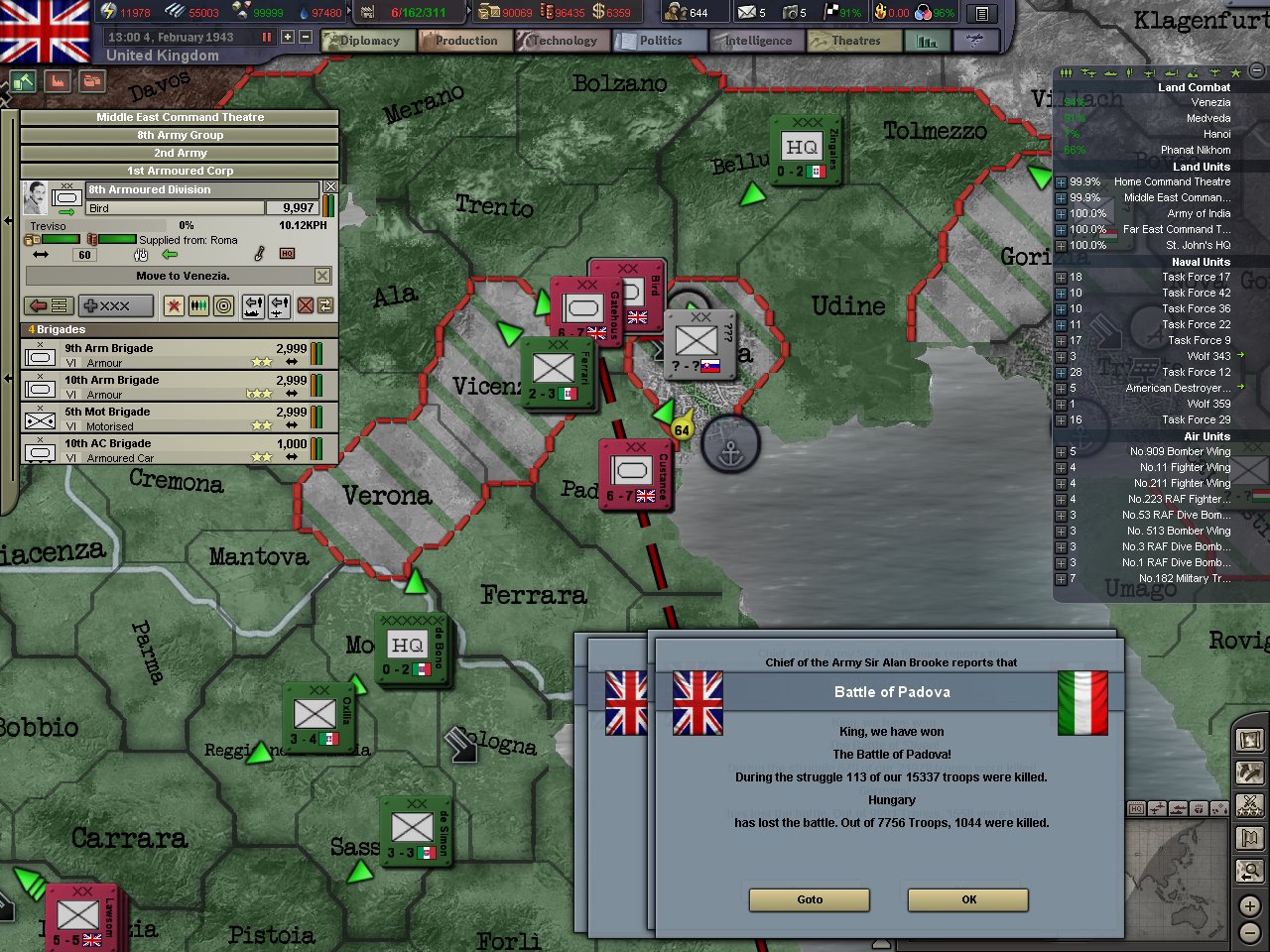
In Italy, operations were moving smoothly. With the Italian government now on the right side of the war, our troops were able to use the infrastructure that hadn't been blown up to move swiftly through the country. Isolated Axis units were easy pickings for our forces and our new allies. Getting positioning in the Alps was now a priority, as an invasion through the Alps into central Germany was now a serious option we were to consider.
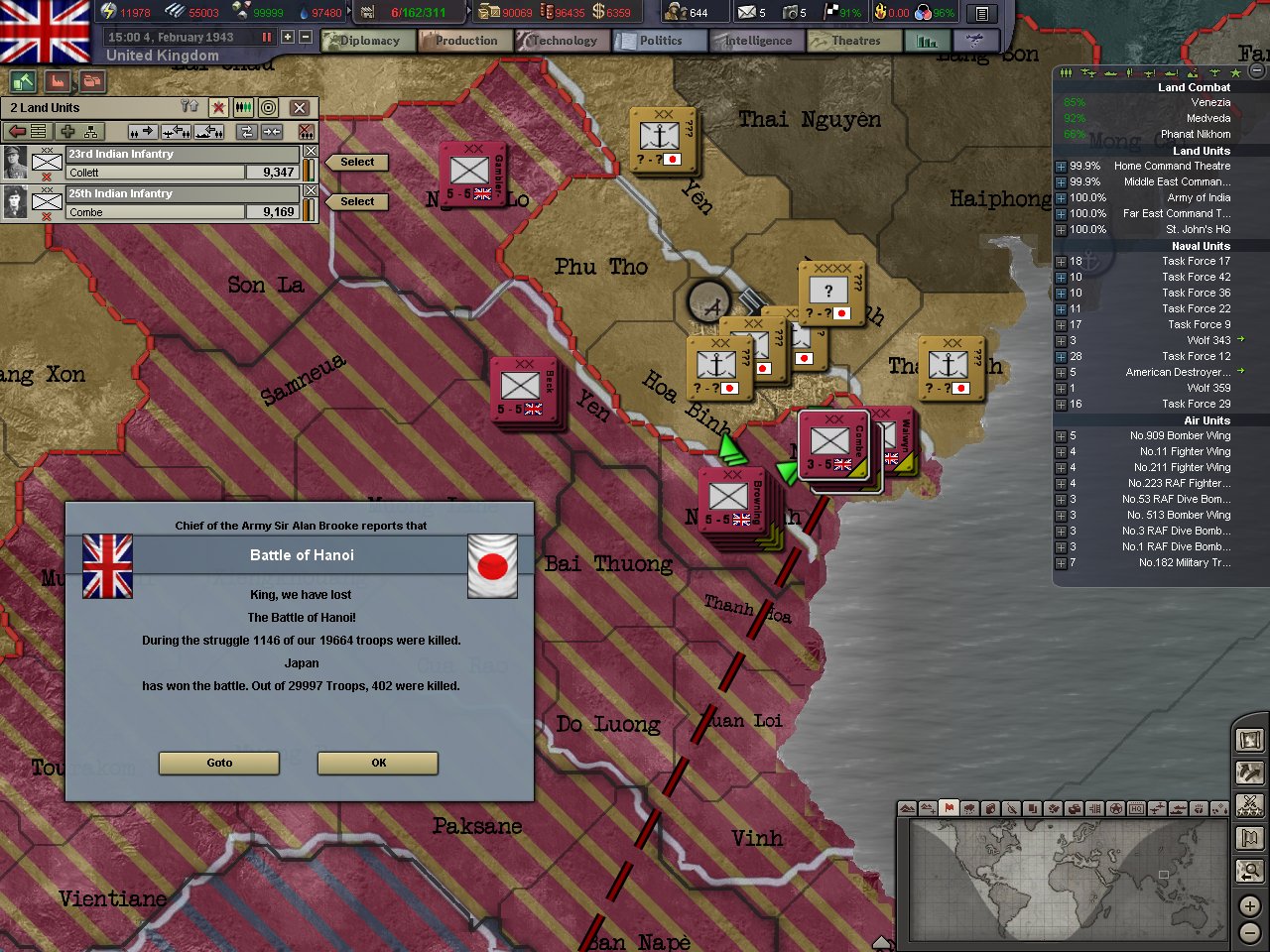
Bloody fighting would be on the menu for our troops in Vietnam. Trying to take Hanoi would cost us almost twelve hundred troops. But a pair of victories would cost the Japanese nearly sixteen hundred and us only four hundred.
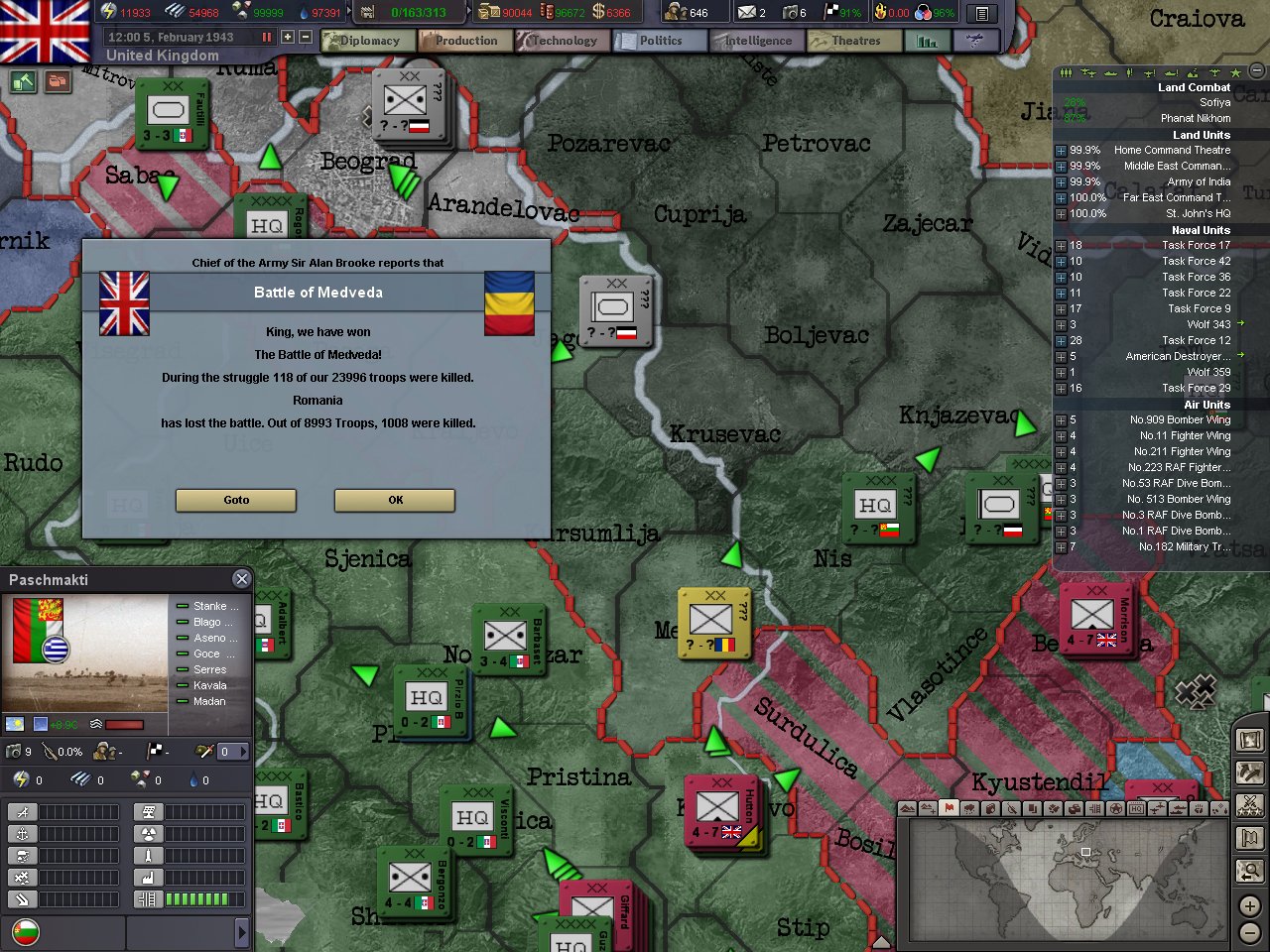
With Italy switching sides in the war, the war opened up in the Balkans for us. Our forces broke out of Greece and began advancing towards Bulgaria, with our eyes on the Romanian oil fields!
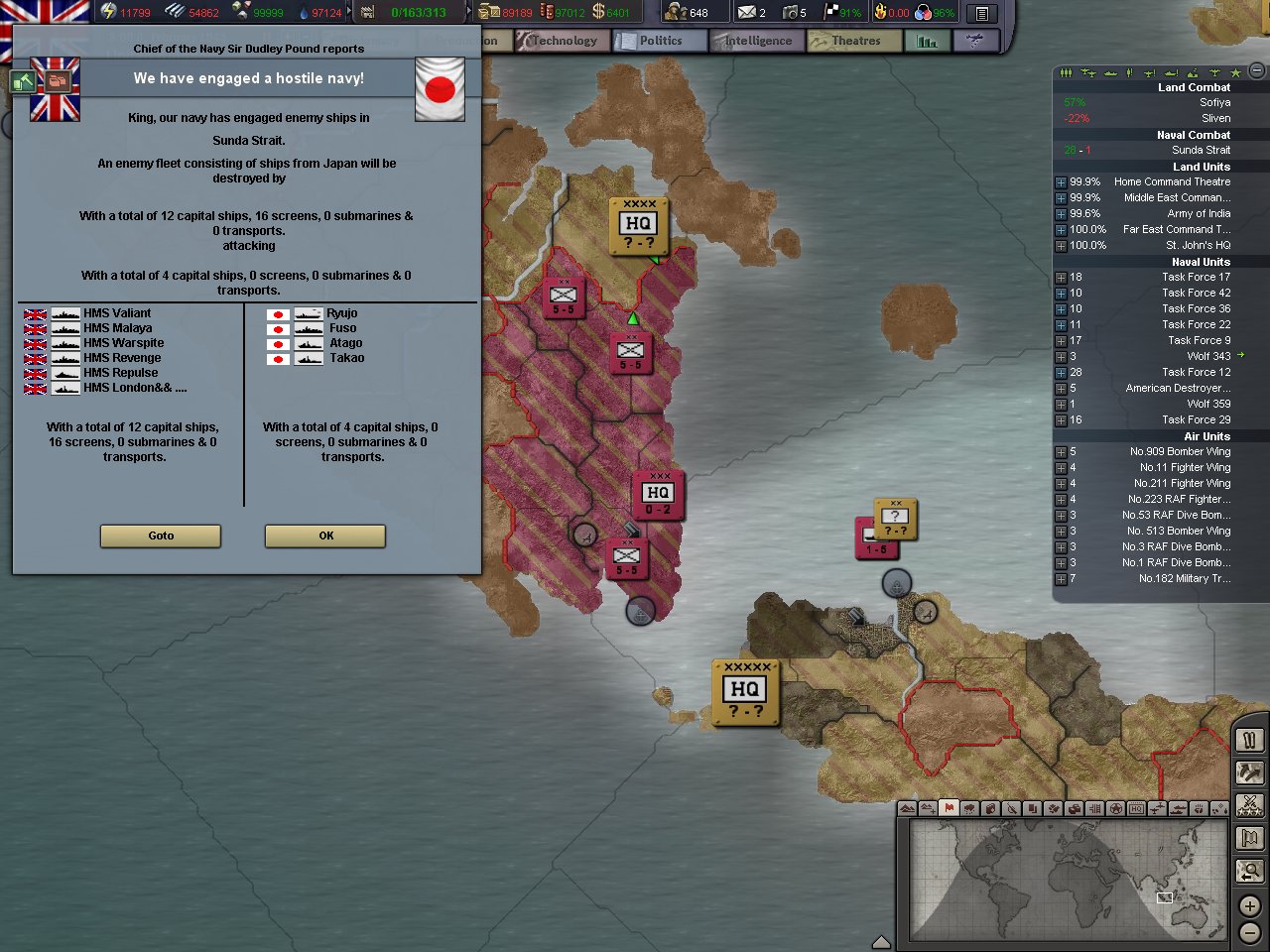
A small operation that was worked up, called Midsummer Night was launched in South East Asia. A corp was landed in the Dutch East Indies with the objective to take it back from the Japanese and secure its valuable resources. The first phase would see troops land in the northern set of islands, and then transition to the southern islands to secure the rubber and gold that was produced on the islands.
The Japanese naval forces that moved to intercept our landing were only 3 capital ships and a carrier, the carrier would escape but the three Japanese heavy ships would be sent to Davy Jones' locker and wouldn't be a threat anymore.
The Japanese naval forces that moved to intercept our landing were only 3 capital ships and a carrier, the carrier would escape but the three Japanese heavy ships would be sent to Davy Jones' locker and wouldn't be a threat anymore.
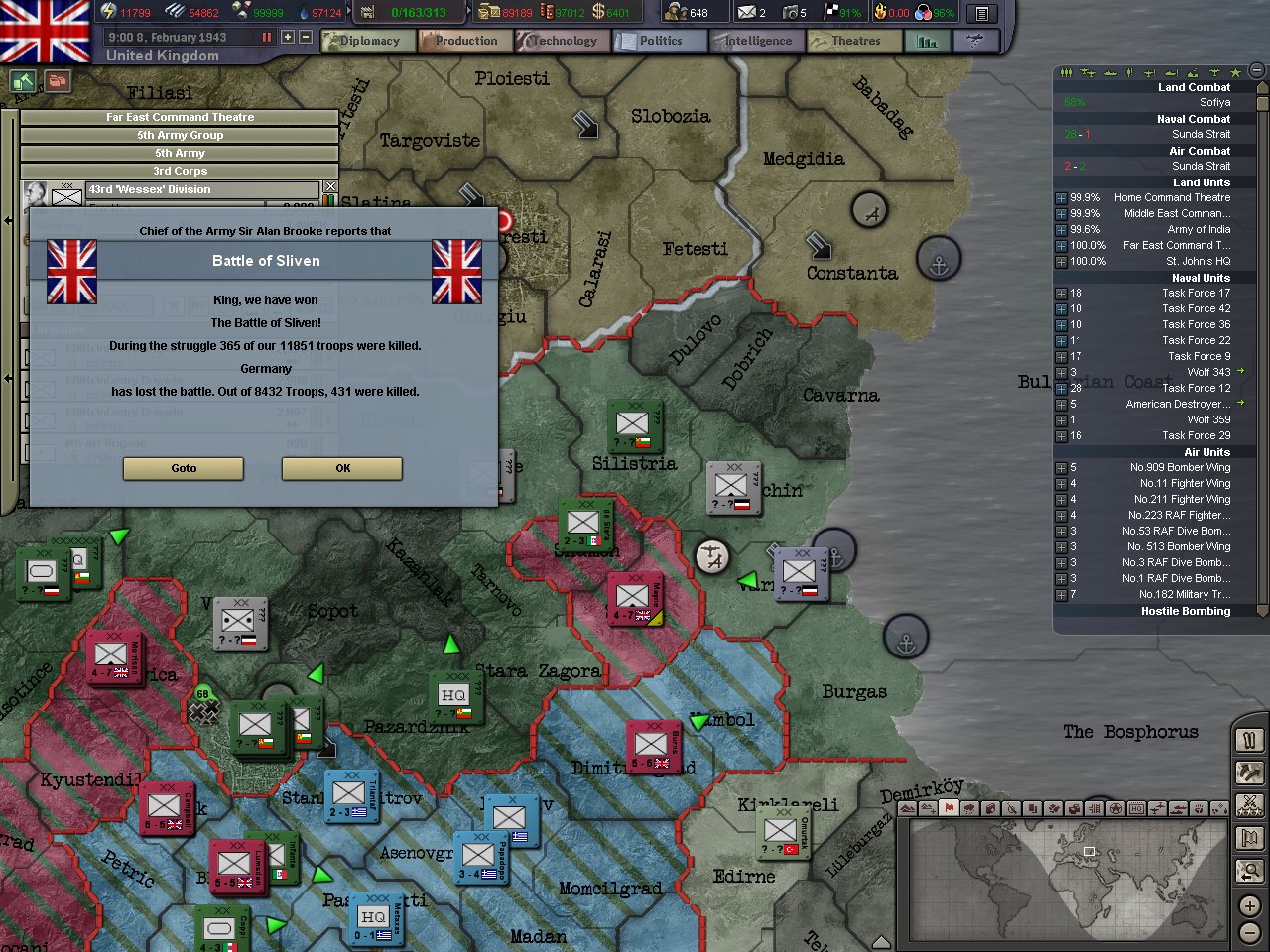
The scattered Axis forces in Bulgaria would be no match for our divisions, the Bulgarian capital was put under attack and our troops were making steady progress into the city. Once Bulgaria was capitulated our forces could thrust on to Romania, and then turn north to Slovakia and further north then.
A day later on the ninth, Sofiya would fall to our troops and our Greek allies. The battle would cost us eighteen hundred men and leave the city in ruins.
A day later on the ninth, Sofiya would fall to our troops and our Greek allies. The battle would cost us eighteen hundred men and leave the city in ruins.
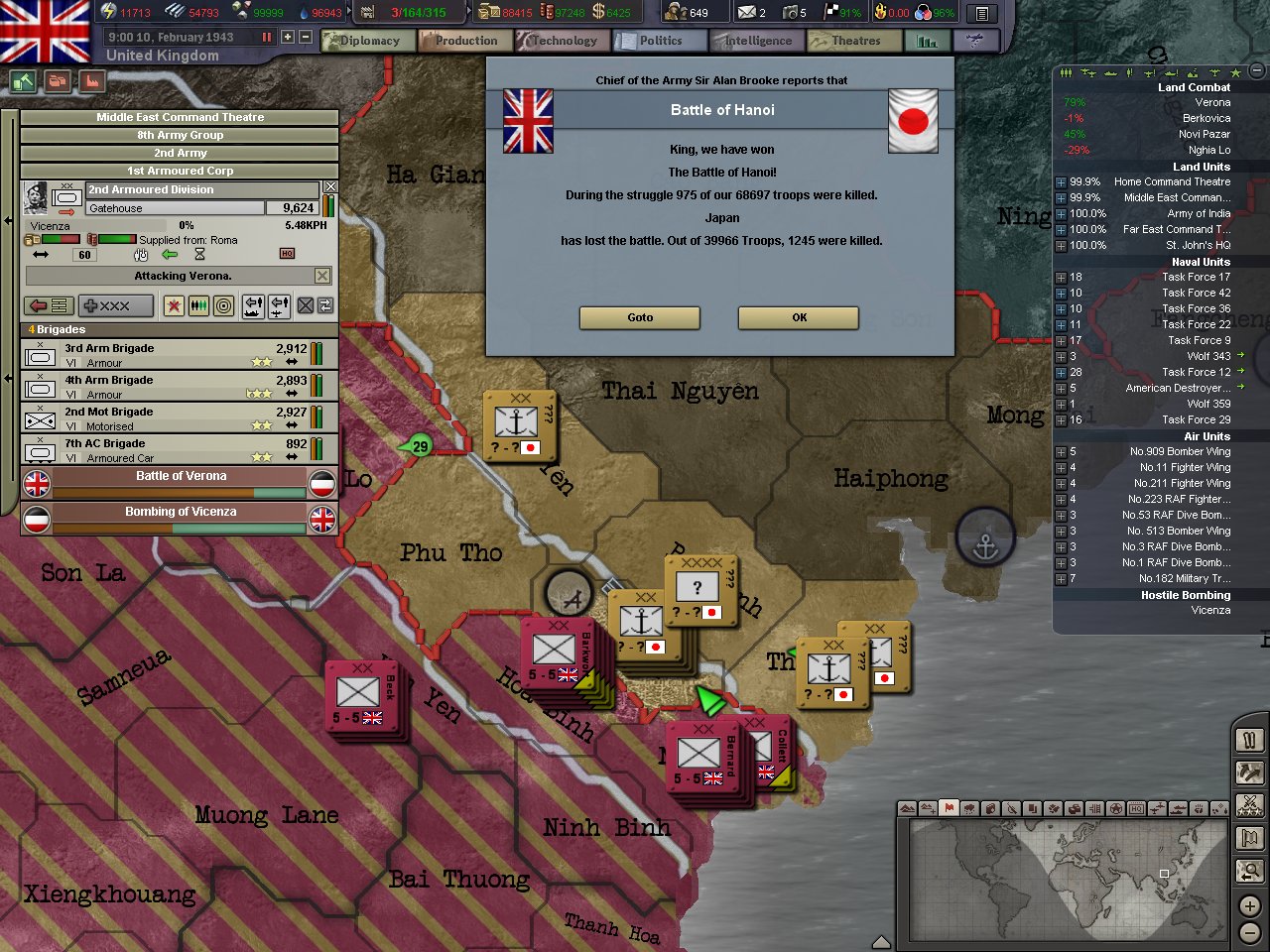
The Army in India would take Hanoi after a long struggle, the city would hopefully remain in our hands and we can lead this victory into future ones across the river and expelling the Japanese from Vietnam!
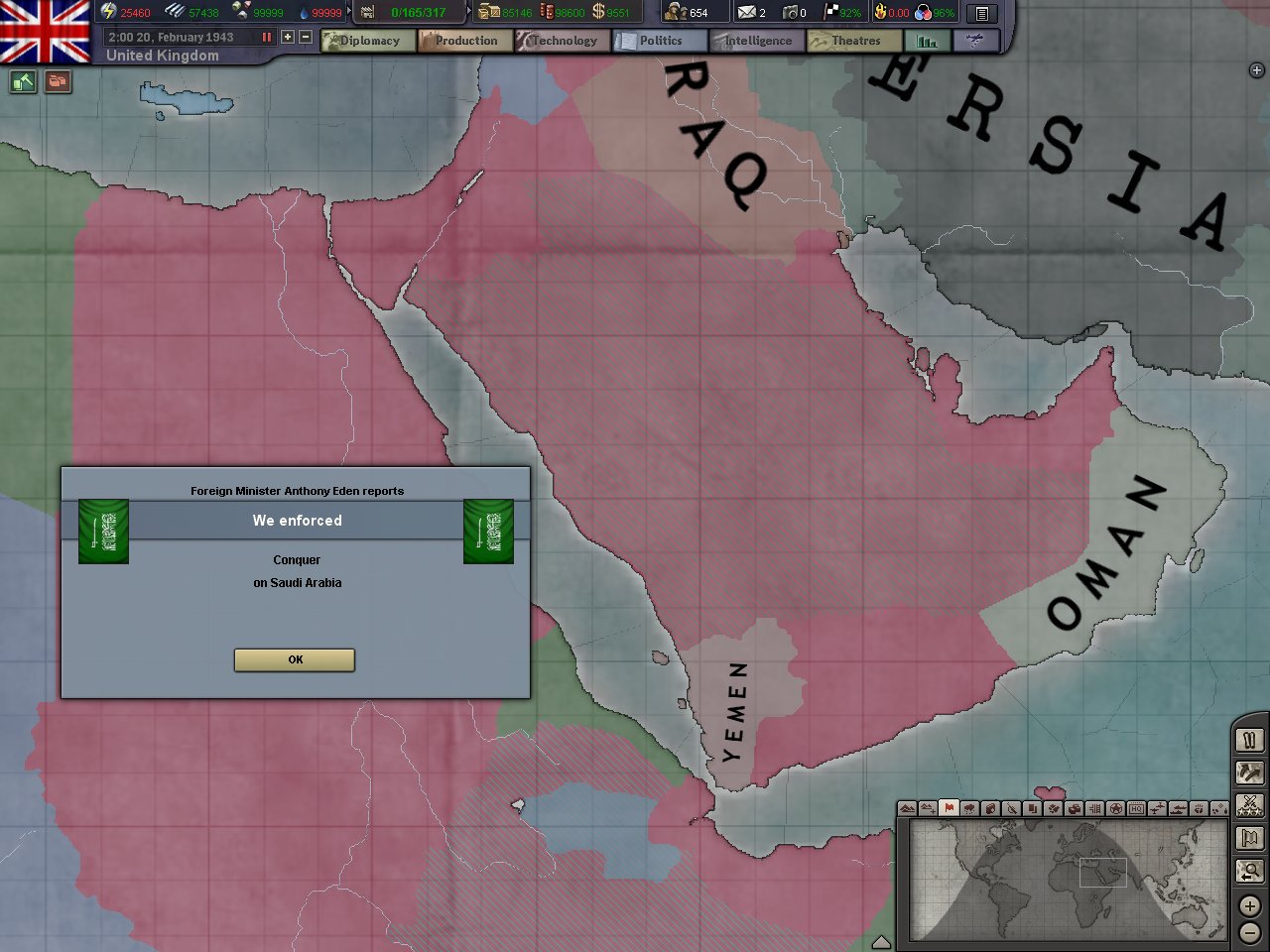
After a brief 25 day invasion, our Cavalry Corp has secured and annexed Saudi Arabia. Hitler's Germany is slowly running out of allies!
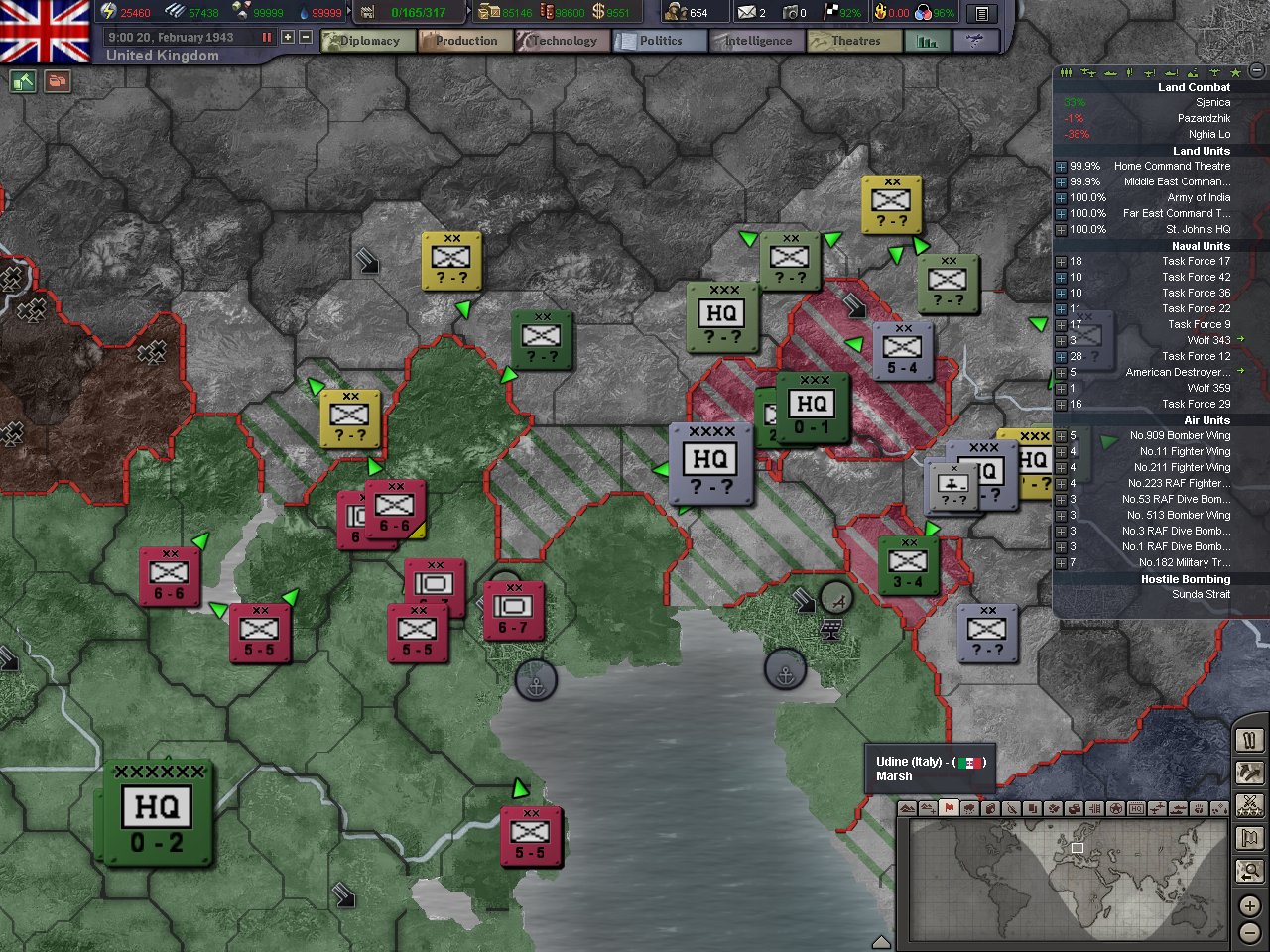
In the Alps, our forces have reached the first mountainous regions, and begin to race the remaining Axis units to the best ground. These opening strategic moves in the Alps will spell out how the rest of the war in this region of Europe will continue.
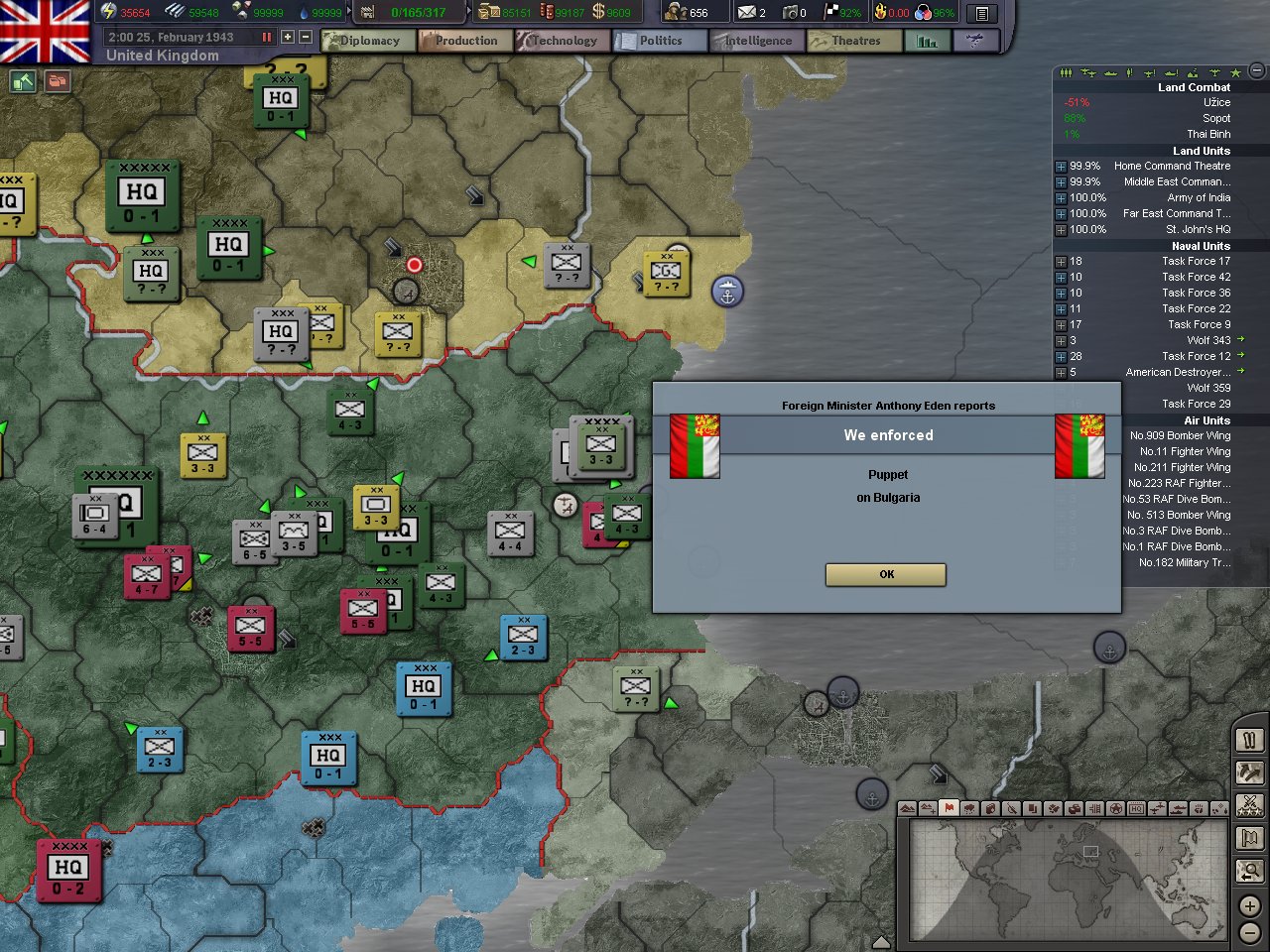
Finally, Bulgaria sees the light and surrenders and joins our long list of allies. The German units in Bulgaria are trapped and will be easy pickings for our allies and our divisions. The way on to Romania is wide open!
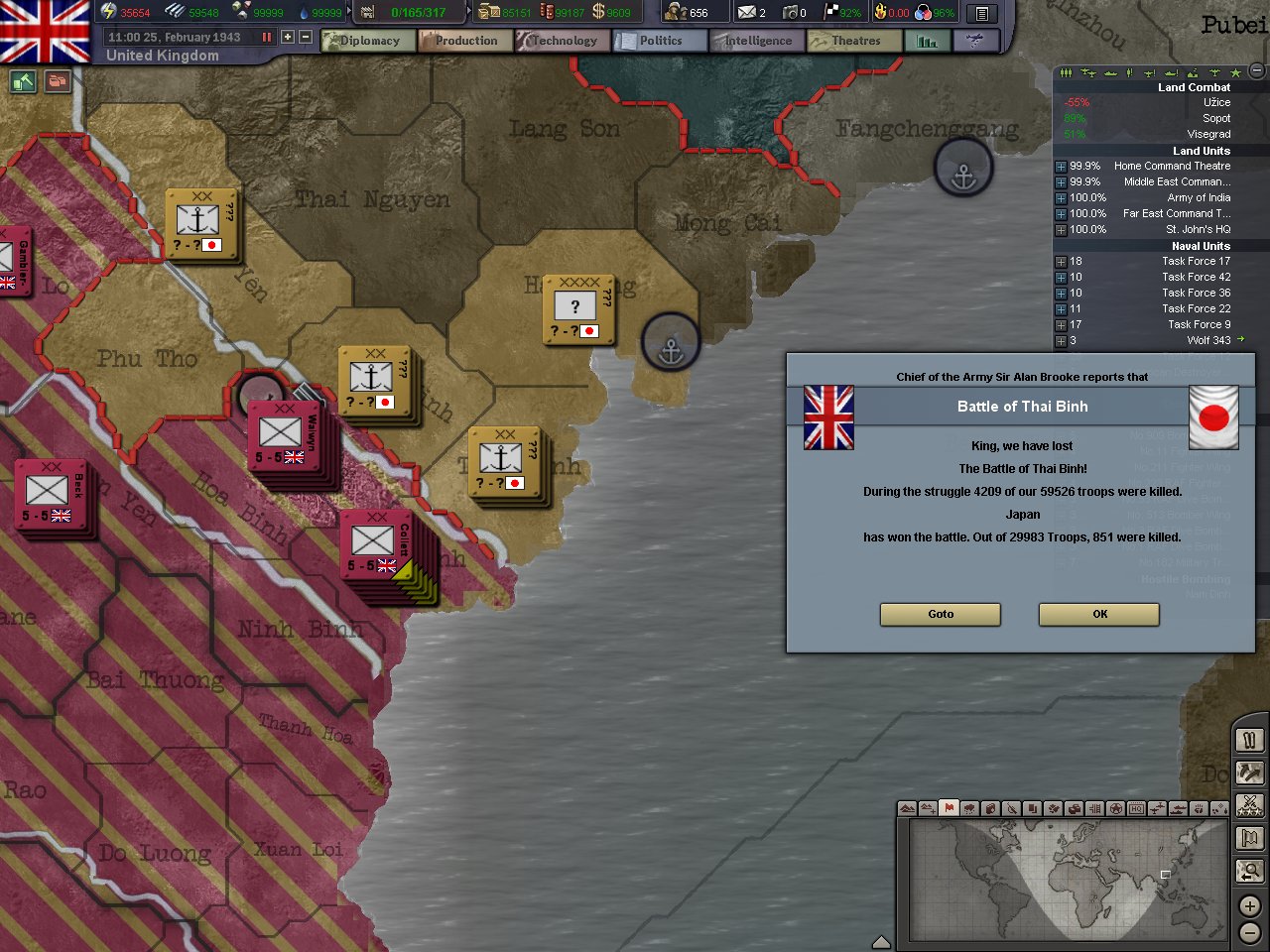
An attempt to force a crossing ends in disaster. It looks like a bloody campaign is going to have an even bloodier ending here as the Japanese prepare to make their final stand in Vietnam around the outskirts of Hanoi.
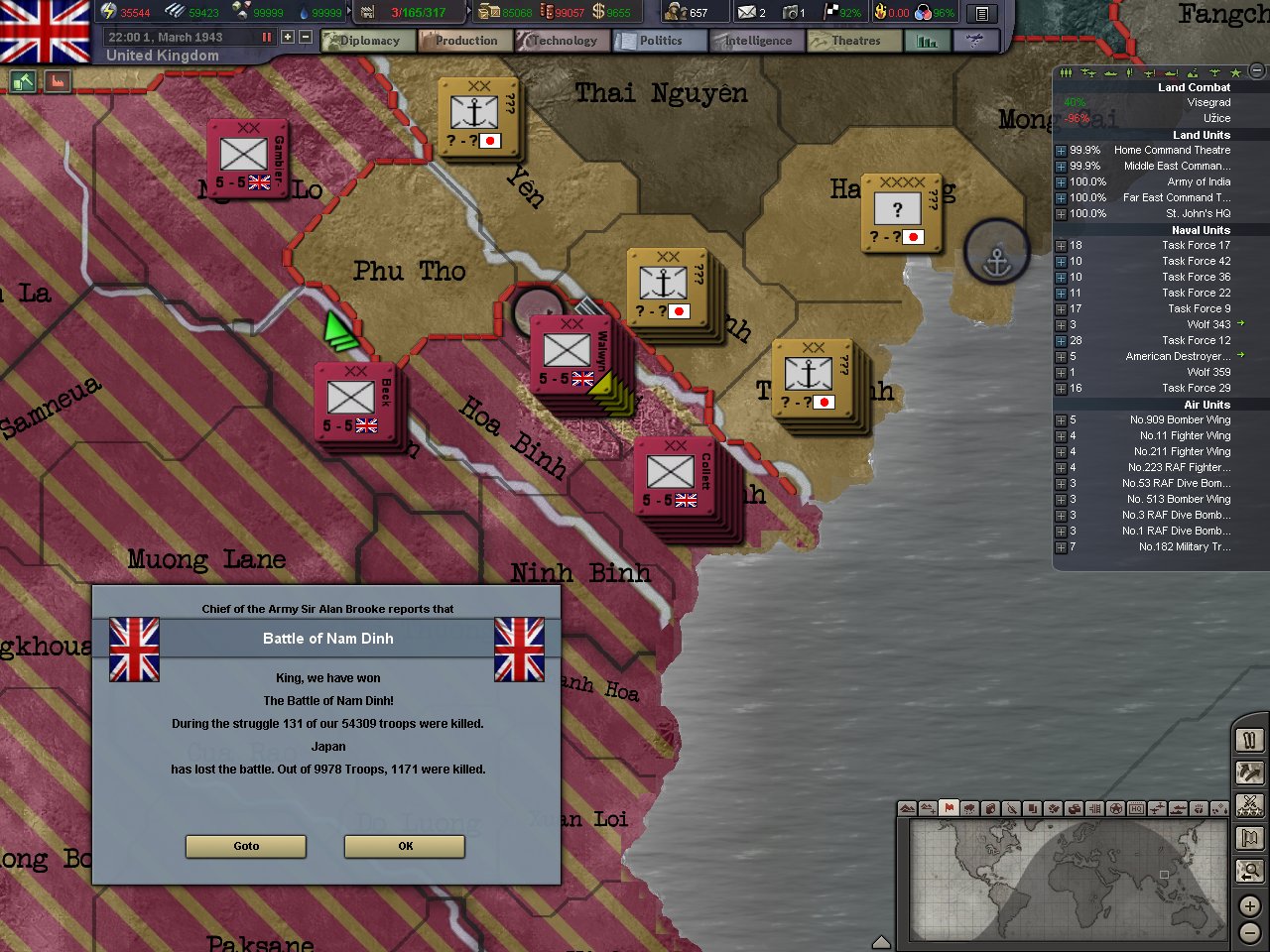
The night of the First of March would see several Japanese banzai charges cut down by fields of gunfire. In the course of three hours the Japanese would lose over one thousand men.
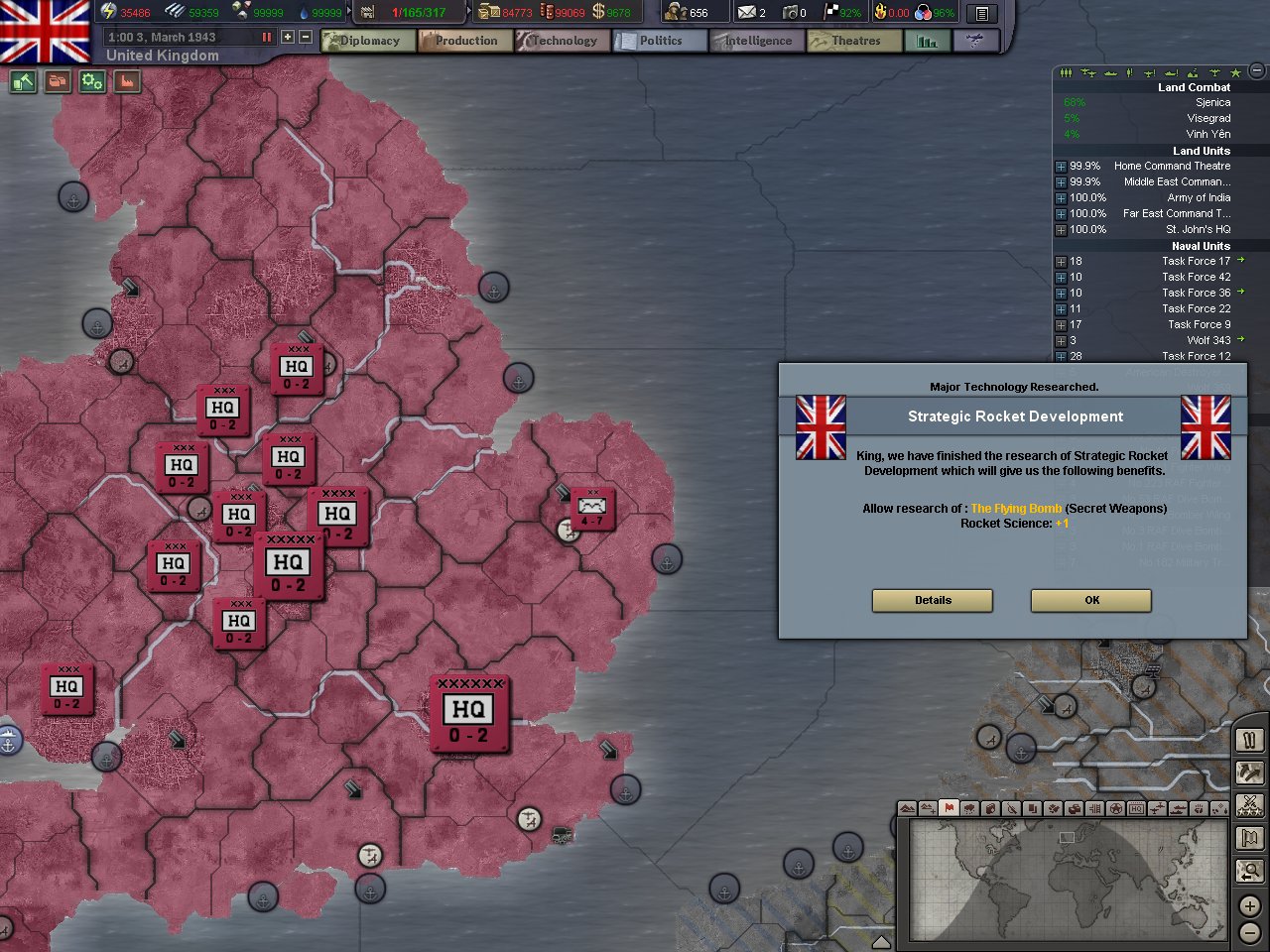
Back on the home front, our scientists finished developing the Flying Bomb. Maybe we'll have to put one to good use against a fascist city one of these days!
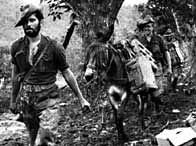
Two Empire soldiers move supplies up the lines around Hanoi, the long supply lines in Vietnam forced our men to find new ways to move ammo and food
1942 ended with blood, 1943 opened with blood. And it's only going to get worse. Every step our forces takes them closer to the enemy's heartland. They're going to get meaner and meaner, and our forces will have to fight harder and harder.
But soon our men will be marching across France, into the German heartland and liberate Europe from the fascist cloud that has descended on it.
The eyes of liberty loving people everywhere are on us. We can not fail them now.
1942 ended with blood, 1943 opened with blood. And it's only going to get worse. Every step our forces takes them closer to the enemy's heartland. They're going to get meaner and meaner, and our forces will have to fight harder and harder.
But soon our men will be marching across France, into the German heartland and liberate Europe from the fascist cloud that has descended on it.
The eyes of liberty loving people everywhere are on us. We can not fail them now.





